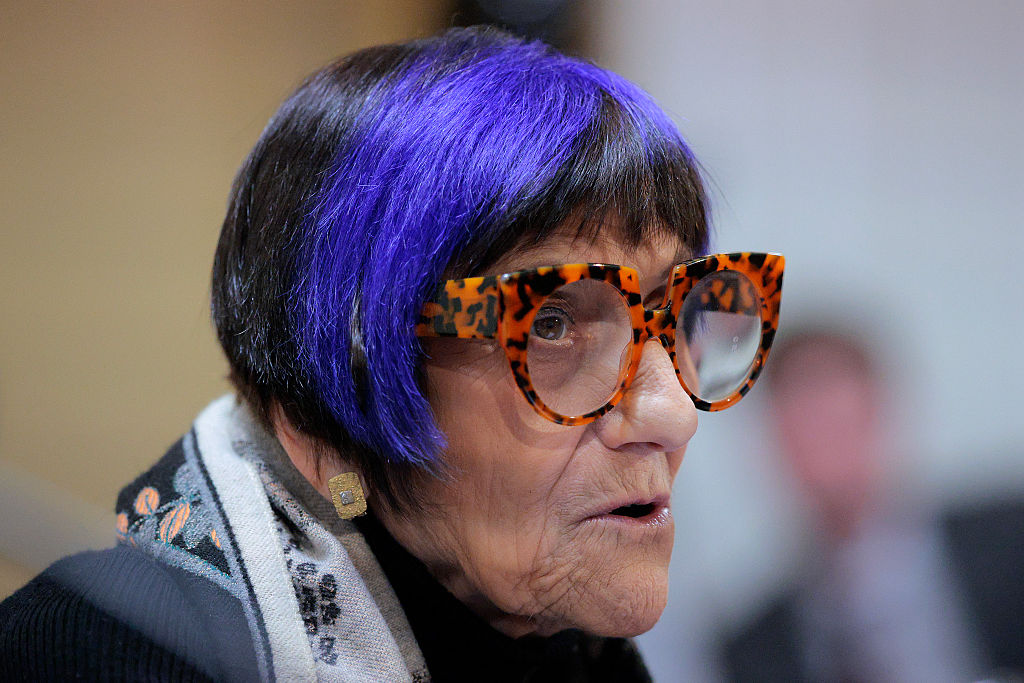
Catholic U.S. House Democrats cited Church teaching in defense of the dignity of migrants as Trump administration officials defend immigration enforcement.
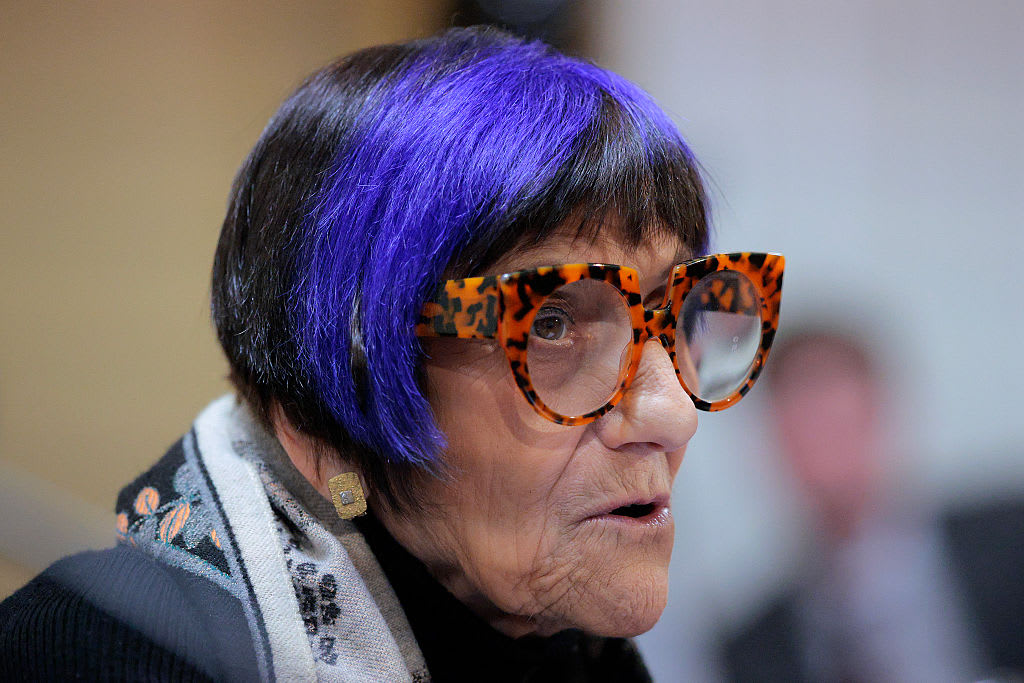

Catholic U.S. House Democrats cited Church teaching in defense of the dignity of migrants as Trump administration officials defend immigration enforcement.

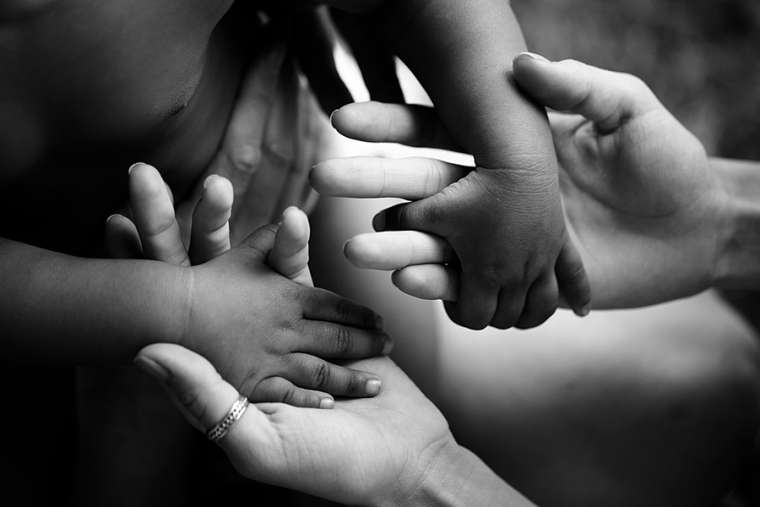
“Adoption visas are not guaranteed” amid a travel freeze, said lawmakers who have asked the State Department to restore a “categorical exemption for adoption visas.”
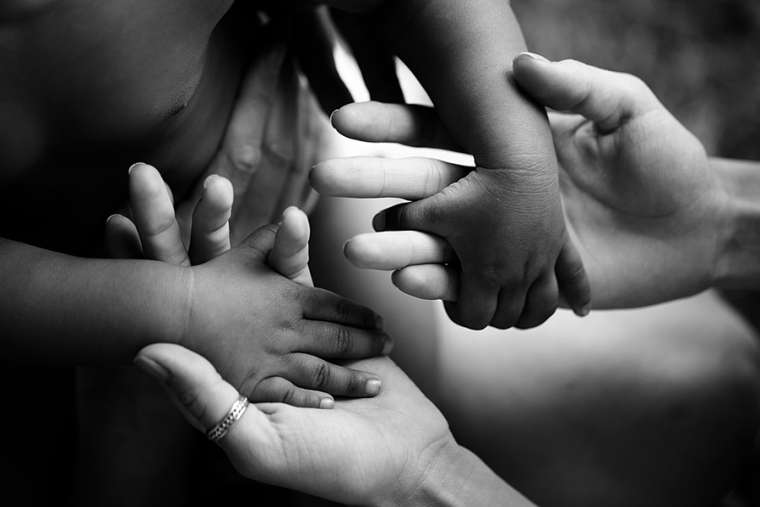

The Holy Father accepted the resignation of Amarillo Bishop Patrick Zurek, who has reached retirement age.

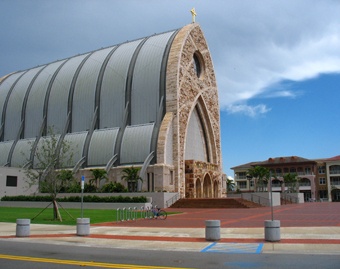
Ave Maria University, a Catholic liberal arts university in Florida, is opening a new campus at a former monastery in rural Ireland. Learn more in this Catholic education news roundup.
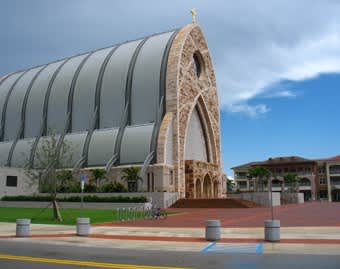
![U.S. clergy celebrate Masses in detention centers, urging humane treatment #Catholic U.S. Catholic clergy are bringing the sacraments to the nation’s immigrant detention centers, celebrating Masses and urging humane treatment for those held inside. As part of this effort, pastoral visits are aimed at ensuring detainees can access the Eucharist and receive spiritual support.In California, Bishop Joseph Brennan of the Diocese of Fresno is set to celebrate Mass on Feb. 15 at the California City Detention Facility, the state’s largest ICE center. While the diocese regularly provides sacraments in prisons and detention sites, this will be Brennan’s first Mass inside an ICE facility.In Oregon, Archbishop Alexander Sample of Portland issued a Feb. 12 statement stressing the Church’s duty to safeguard detainees’ access to the sacraments and voicing concern about large‑scale deportations. “I just feel very strongly about this, that there has to be a better solution to solving the immigration problems we have in the United States,” he said.In December 2025, seven bishops celebrated Mass at the Adelanto ICE Processing Center in California.Chandler Marquez, director of public affairs and innovation at the Fresno Diocese, told EWTN News that there are “people who are in the facility [who] want the sacrament — they want the spiritual accompaniment,” which they are not able to access as frequently while in detention.Los Angeles Auxiliary Bishop Brian Nunes and Father Kris Sorenson, pastor of Our Lady of Lourdes in California City, will join for the Mass.With President Donald Trump’s mass deportation efforts still ongoing, Marquez said “the current climate has certainly motivated” Brennan’s decision to celebrate Mass at the facility. He said the bishop has been “vocal about the promotion of human dignity” for migrants.In January 2025, Brennan issued an open letter on “immigration challenges,” in which he said “it seemed as if we took a step back as a society, and the old days of immigration sweeps were upon us once again” when he saw the uptick of immigration enforcement within his diocese.“Our people are being asked to produce proof of citizenship, and it seems as if the request is based on how they look and how they speak,” he said at the time. “That is not, by way of example, going after hardened criminals or drug dealers which, I hope, none of us would take exception to. It is going after people who, rightly or wrongly, were allowed to cross a border and who are now being subjected to tactics that are causing much fear and anxiety among my people. It is an insult to human dignity, and it is simply wrong.”
Bishop Joseph V. Brennan of Fresno, California. | Credit: Screenshot of Diocese of Fresno YouTube video
Marquez noted the diocese has the largest detention facility and the “largest amount of prisons and detention centers” in the state, which is why the ministry at prisons and detention centers is “a very, very big part of our diocese.”“Our chaplains have a great relationship with the prisons and detention centers within our dioceses,” he said, adding that the diocese has not run into problems gaining access to the facilities to provide religious services.The Department of Homeland Security (DHS), which operates ICE, said it encourages clergy to request accommodations for religious services at long-term ICE detention centers.Catholic clergy ran into obstacles several times last year when trying to administer sacraments at an ICE field office in Broadview, Illinois, where detainees are processed. A federal judge said Feb. 12 that DHS must provide accommodations to ensure Catholic clergy could provide ashes and Communion for detainees on Ash Wednesday, Feb. 18.](https://unitedyam.com/wp-content/uploads/2026/02/u-s-clergy-celebrate-masses-in-detention-centers-urging-humane-treatment-catholic-u-s-catholic-clergy-are-bringing-the-sacraments-to-the-nations-immigrant-detention-centers-celebrating-m.jpg)
Archbishop Alexander Sample issued a statement stressing the Church’s duty to safeguard detainees’ access to the sacraments.
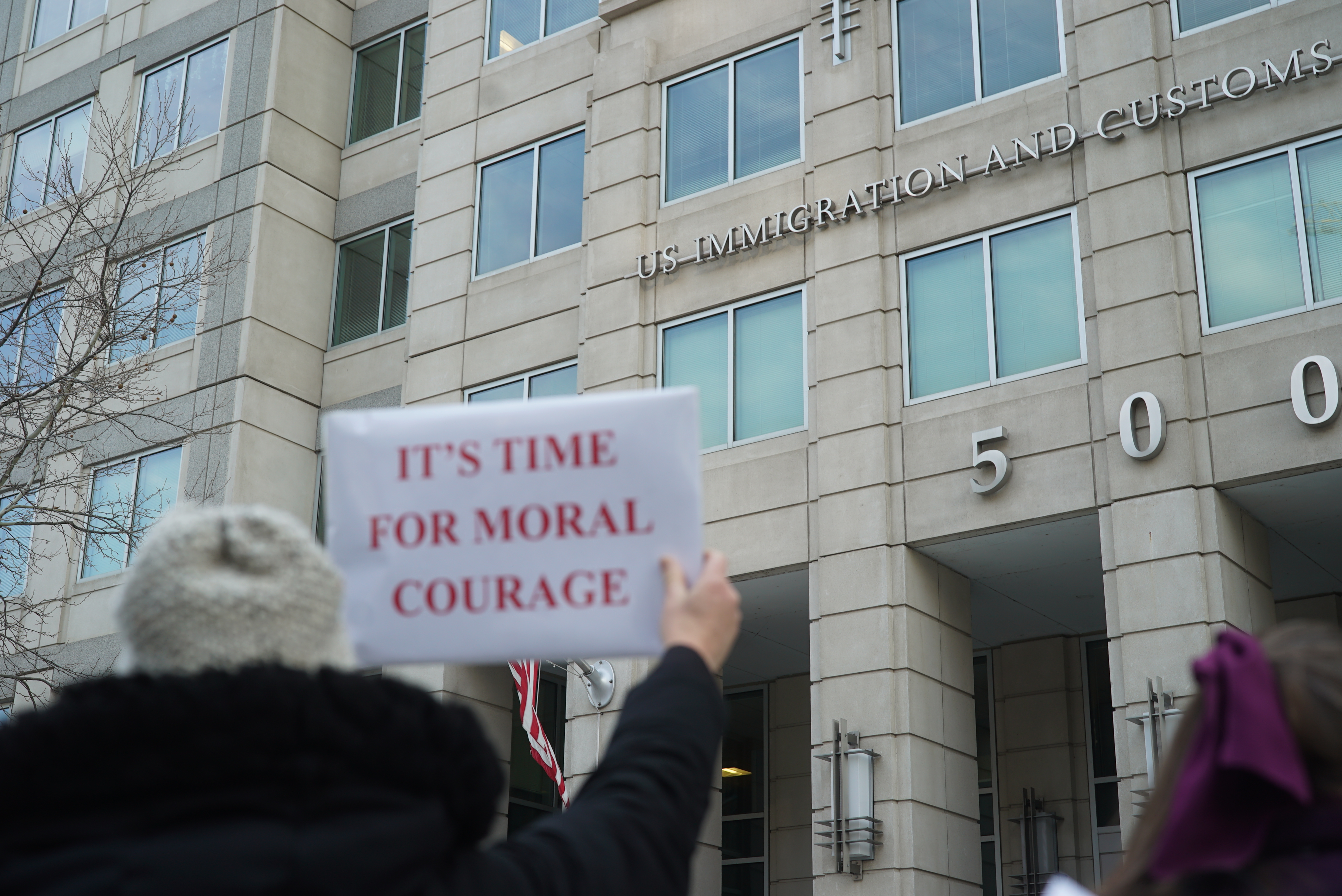
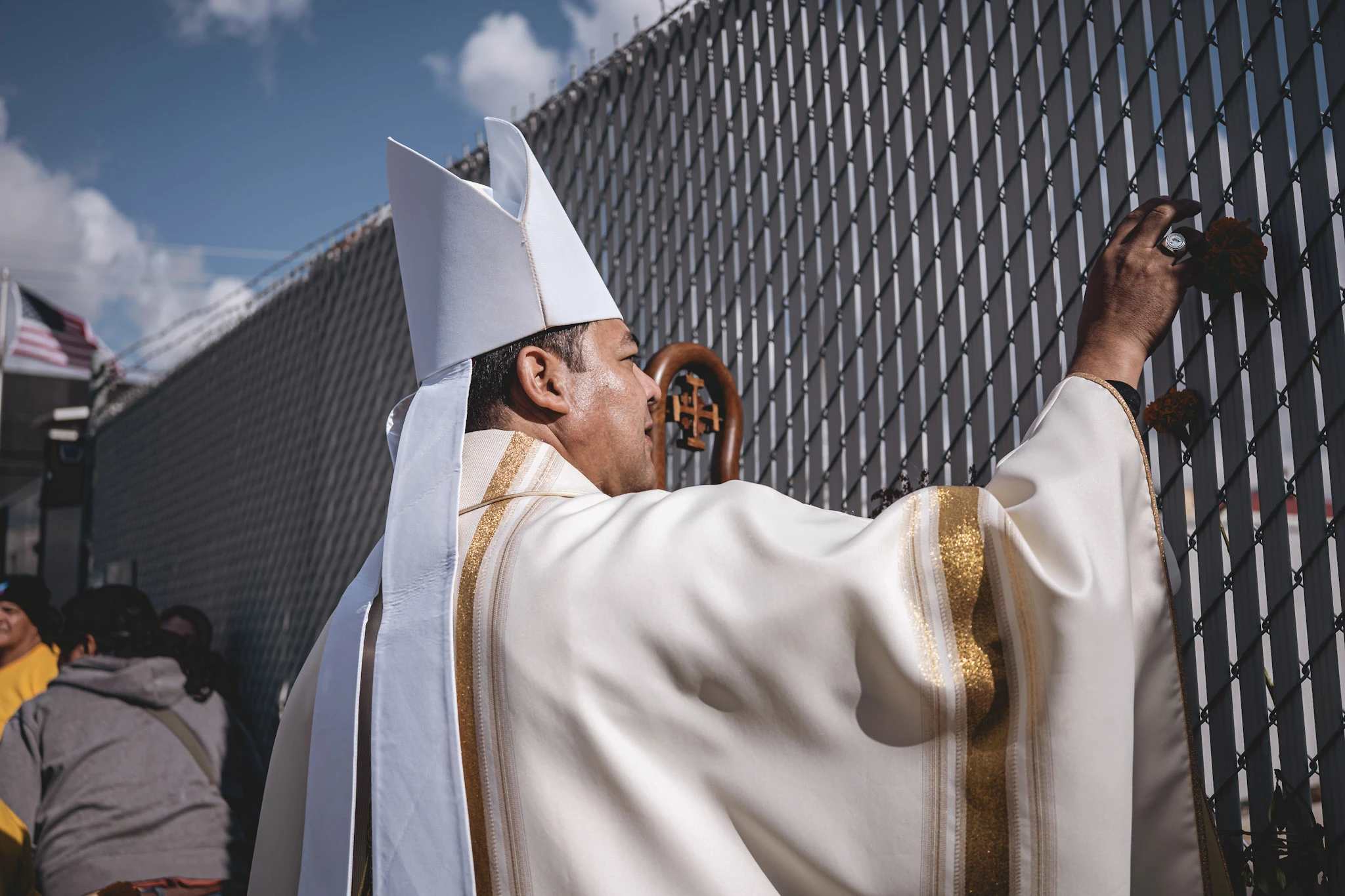
Clergy had argued they “have lost their own religious freedom, by blanket denial of any opportunity to provide spiritual consolation.”
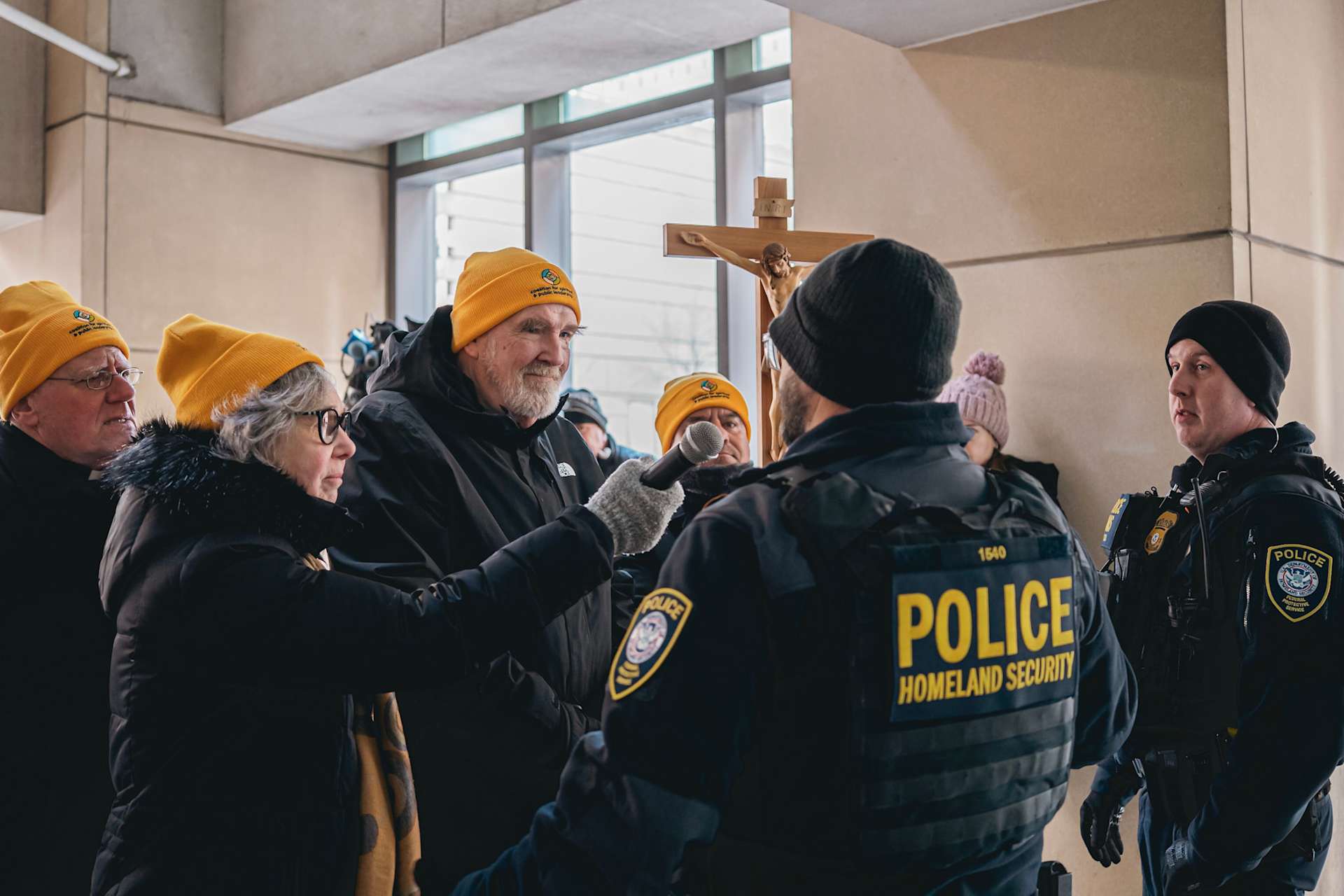
![Puerto Rico’s penal code recognizes unborn babies as human beings #Catholic Puerto Rico Gov. Jenniffer González signed into law on Feb. 12 a bill amending the penal code to recognize unborn babies as human beings at “any stage of gestation.”Senate Bill 923 — which when signed became Law 18-2026 — amends Article 92 of the penal code, which currently states that “murder is the intentional, knowing, or reckless killing of a human being.”The new law establishes that “for the purposes of this chapter, ‘human being’ shall include any conceived [unborn child] at any stage of gestation within the mother’s womb.”This legislation was authored by González, a Republican. In a press release posted on X, she explained that the objective is to complement Law 166-2025, known as the Keyshla Madlane Law, named after a pregnant woman in Puerto Rico who was murdered in April 2021.This law, the press release states, “among other things, defines as first-degree murder the intentional and knowing killing of a pregnant woman, resulting in the death of the unborn child at any stage of gestation within the mother’s womb.”In this regard, the approval of Law 18-2026 stands out, noting that “the legislation aims to maintain consistency between civil and criminal provisions by recognizing the conceived unborn child as a human being.”In December 2025, the governor also signed into law Senate Bill 504, which amended the civil code to state that “a human being in gestation or nasciturus is a natural person, including the conceived child at any stage of gestation within the mother’s womb.”A natural person simply means a living human being as distinct from a legal person such as a corporation. At the time, all of these laws were criticized by feminist and pro-abortion groups, who argued that they could lead to a ban on abortion in Puerto Rico and other U.S. jurisdictions.However, Puerto Rico Sen. Joanne Rodríguez Veve defended the passage of Bill 923 in January, stating that “the message of this type of legislation is powerful. It reaffirms this kind of language in our public policy that in the womb of a pregnant woman there is not just anything, not a mere indefinable object, but a subject, a developing human being who has dignity and whose value is intrinsic to their human nature.”This story was first published by ACI Prensa, the Spanish-language sister service of EWTN News. It has been translated and adapted by EWTN News English. Puerto Rico’s penal code recognizes unborn babies as human beings #Catholic Puerto Rico Gov. Jenniffer González signed into law on Feb. 12 a bill amending the penal code to recognize unborn babies as human beings at “any stage of gestation.”Senate Bill 923 — which when signed became Law 18-2026 — amends Article 92 of the penal code, which currently states that “murder is the intentional, knowing, or reckless killing of a human being.”The new law establishes that “for the purposes of this chapter, ‘human being’ shall include any conceived [unborn child] at any stage of gestation within the mother’s womb.”This legislation was authored by González, a Republican. In a press release posted on X, she explained that the objective is to complement Law 166-2025, known as the Keyshla Madlane Law, named after a pregnant woman in Puerto Rico who was murdered in April 2021.This law, the press release states, “among other things, defines as first-degree murder the intentional and knowing killing of a pregnant woman, resulting in the death of the unborn child at any stage of gestation within the mother’s womb.”In this regard, the approval of Law 18-2026 stands out, noting that “the legislation aims to maintain consistency between civil and criminal provisions by recognizing the conceived unborn child as a human being.”In December 2025, the governor also signed into law Senate Bill 504, which amended the civil code to state that “a human being in gestation or nasciturus is a natural person, including the conceived child at any stage of gestation within the mother’s womb.”A natural person simply means a living human being as distinct from a legal person such as a corporation. At the time, all of these laws were criticized by feminist and pro-abortion groups, who argued that they could lead to a ban on abortion in Puerto Rico and other U.S. jurisdictions.However, Puerto Rico Sen. Joanne Rodríguez Veve defended the passage of Bill 923 in January, stating that “the message of this type of legislation is powerful. It reaffirms this kind of language in our public policy that in the womb of a pregnant woman there is not just anything, not a mere indefinable object, but a subject, a developing human being who has dignity and whose value is intrinsic to their human nature.”This story was first published by ACI Prensa, the Spanish-language sister service of EWTN News. It has been translated and adapted by EWTN News English.](https://unitedyam.com/wp-content/uploads/2026/02/puerto-ricos-penal-code-recognizes-unborn-babies-as-human-beings-catholic-puerto-rico-gov-jenniffer-gonzalez-signed-into-law-on-feb-12-a-bill-amending-the-penal-code-to-recognize-unborn-ba.jpg)
Puerto Rico Gov. Jenniffer González signed into law on Feb. 12 a bill amending the penal code to recognize unborn babies as human beings at “any stage of gestation.”
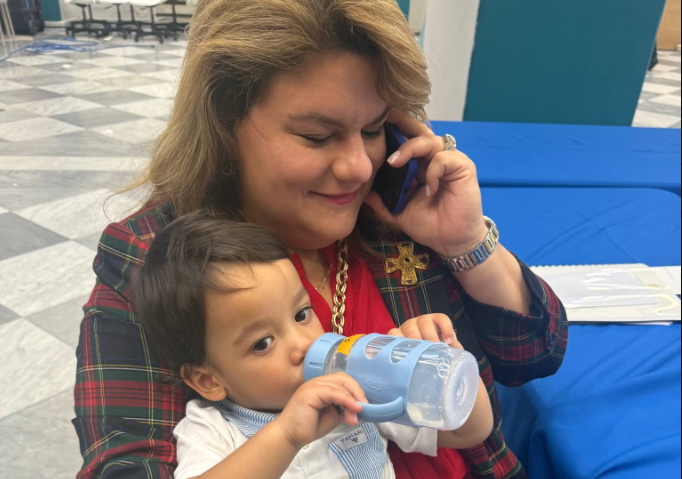

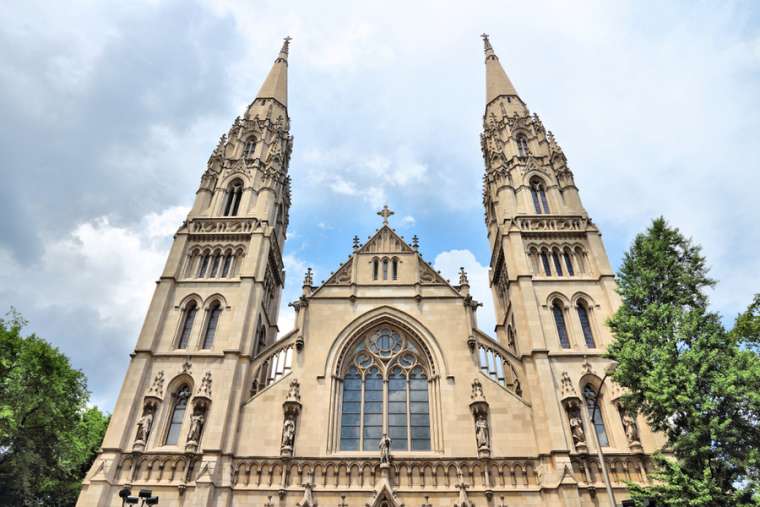
Parishioners learned that seven churches will be closed in March due to financial constraints and lower Mass attendance.
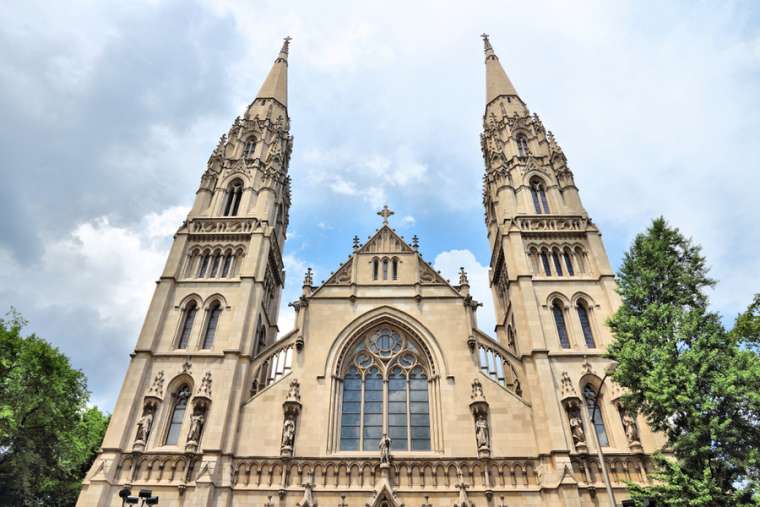
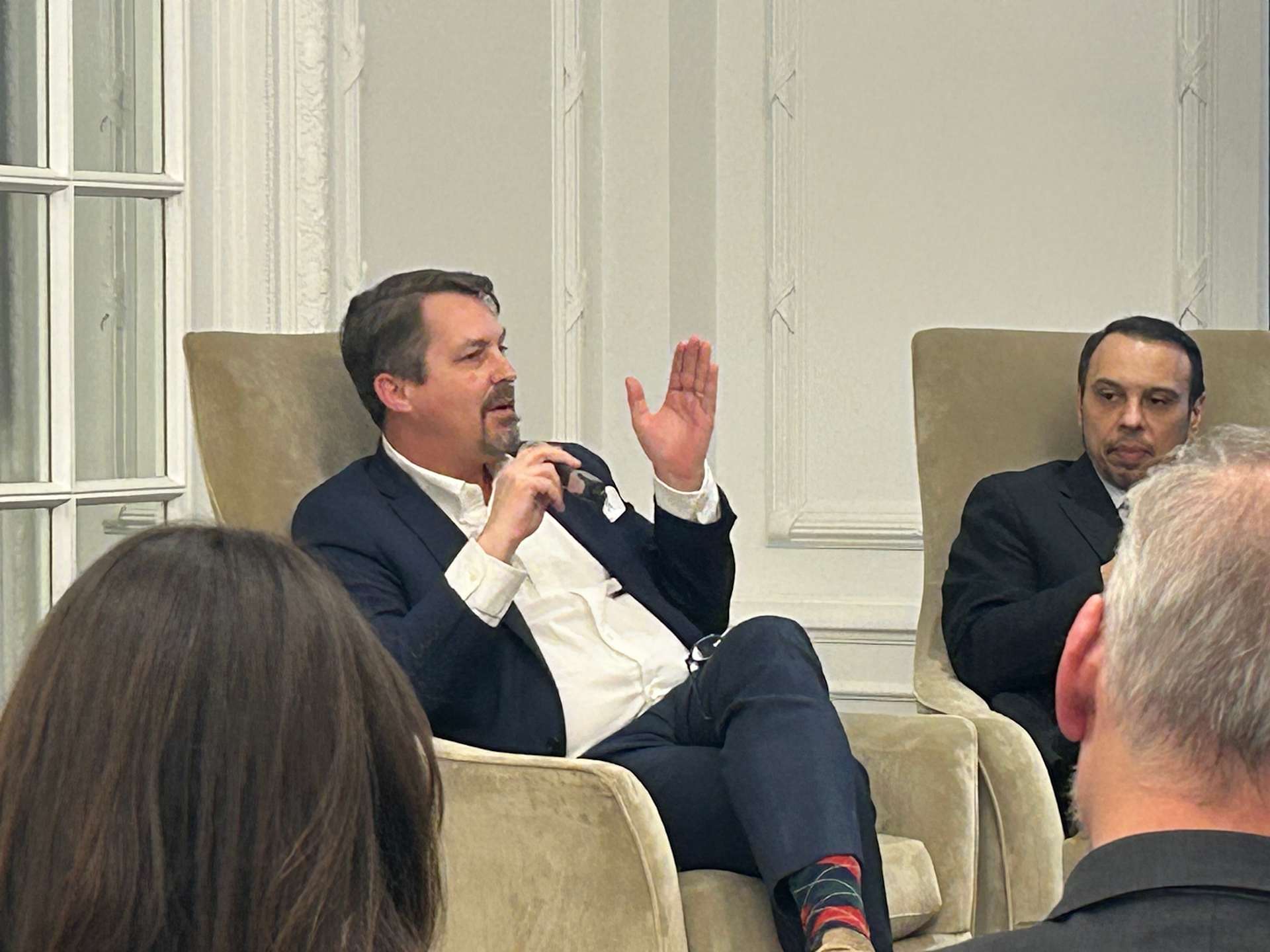
A Hungarian think tank’s new paper “Migration and Ethics: The Axioms of a Christian Migration Policy” prompts a meeting of the minds.
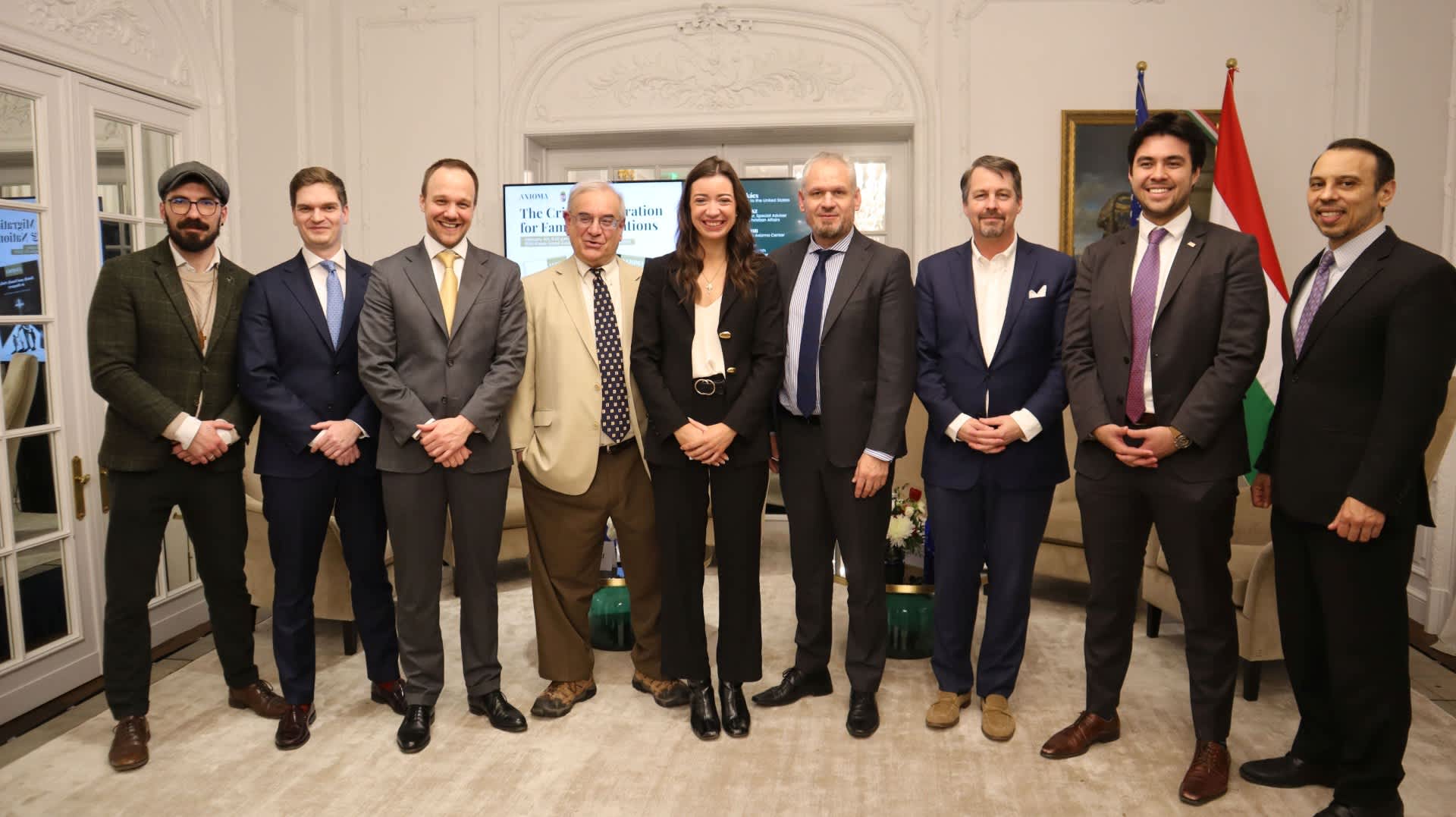
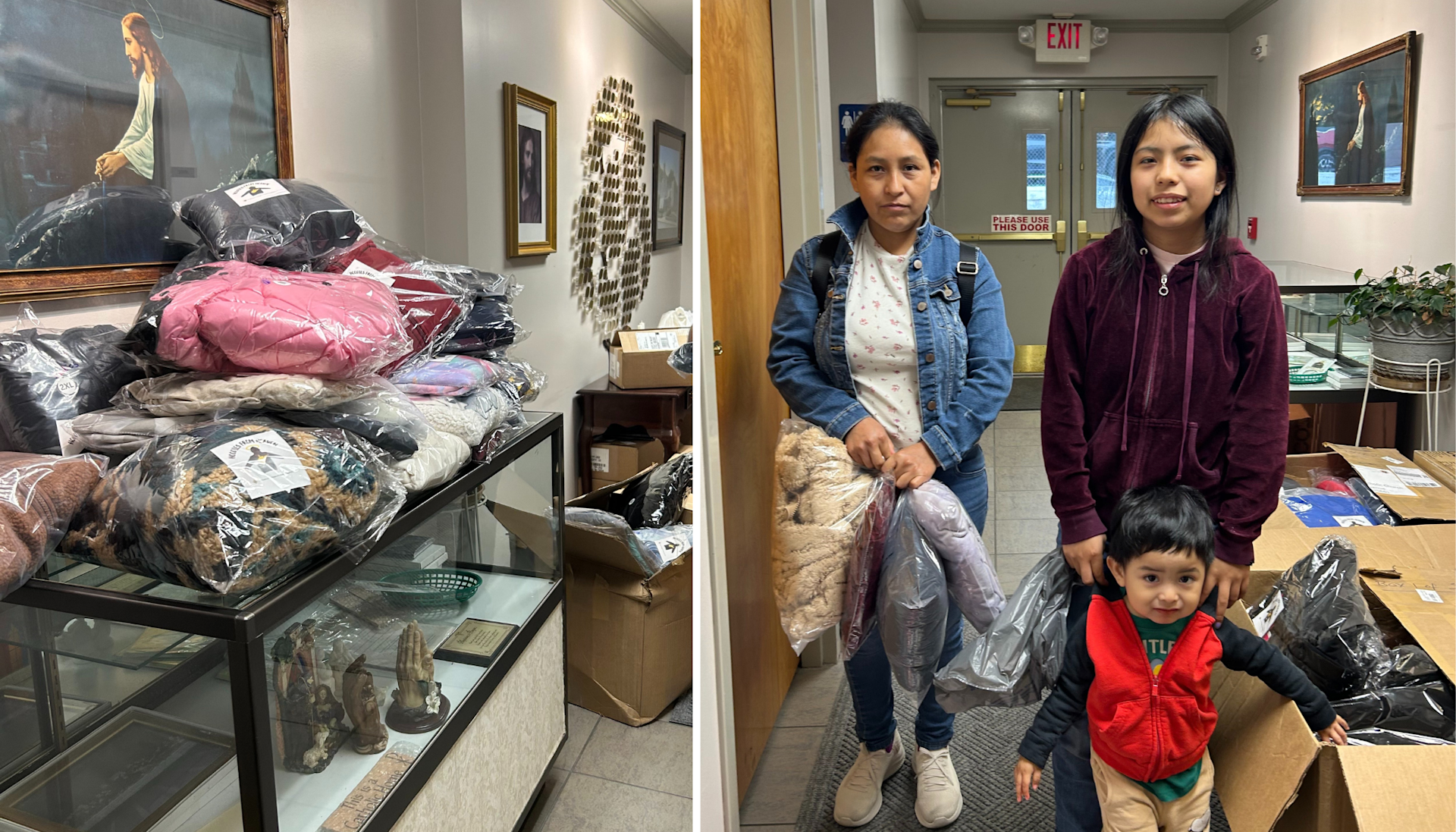
Amid the freezing temperatures hitting many parts of the U.S., one Knights of Columbus council is providing warmth to children in need through an initiative called “Hoodies from Heaven.”
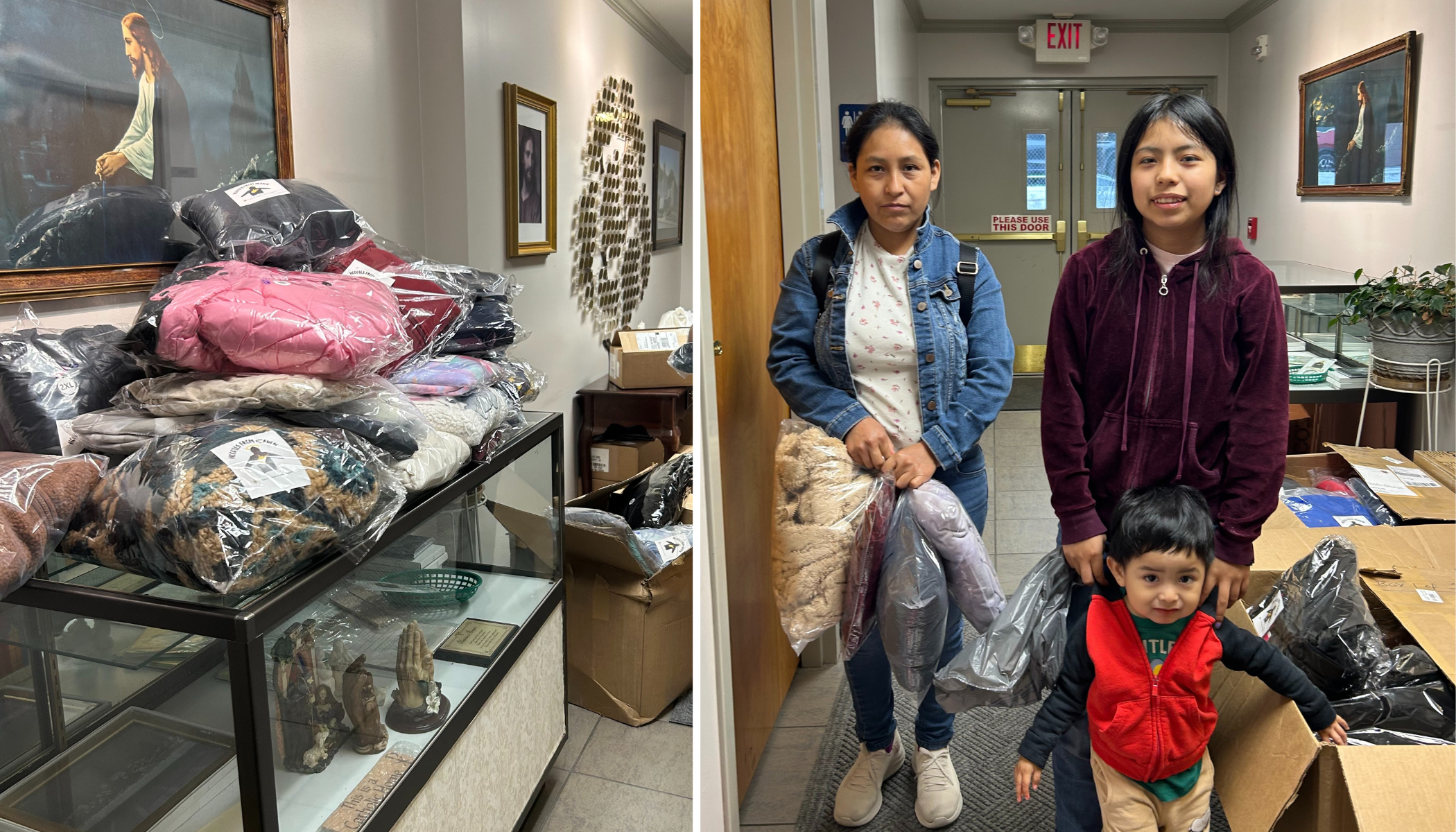
![Seattle, Boston archbishops make friendly wager ahead of 2026 Super Bowl #Catholic It’s become an annual tradition for the Catholic bishops from the two cities sending teams to the Super Bowl to make a friendly wager before the big game to benefit Catholic nonprofits in the teams’ cities.As the New England Patriots and the Seattle Seahawks prepare to play in the Super Bowl on Feb. 8, Archbishop Richard G. Henning of Boston and Archbishop Paul D. Etienne of Seattle discussed this year’s wager with EWTN News.The two archbishops said the weekend will be fun for fans across the nation but acknowledged it comes amid a tense time in the United States with ongoing debates and division surrounding immigration.“I think this is an important moment, obviously, of unity. This is a shared cultural moment, hopefully a moment for people to gather, be with friends and family, a joyful thing,” Henning said. “But at the same time, we don’t want to forget that there are other realities in our world and suffering; [we want to] be attentive to that as well.”“It’s a situation that requires attentiveness and sensitivity,” Etienne said. With the “tradition of a friendly wager between the bishops of the teams, Archbishop Henning and I just simply wanted to acknowledge that we do realize we got more important matters that we are being attentive to,” he said.“But at the same time, we recognize the great role that sports and relaxation play in the lives of our people, too.”The pair decided the wager this year would be a $500 donation to Catholic charities that have a particular focus on the care and support of immigrants.Preparing for a ‘joyful’ gameEtienne discussed how putting aside differences and coming together is an advantage that sports and recreation can bring.“Healthy competition is a part of so many aspects of human life, and it’s good for people to have something to take their minds off of other matters in their world and in their lives to just relax. And hopefully, the outcome of the game will still allow everybody watching it and participating to still be relaxed and joyful at the performance of their teams,” he said.The 60th Super Bowl marks the second time the Seahawks and Patriots will compete in the championship game. In 2015, the Patriots defeated the Seahawks at the 49th Super Bowl. Despite the loss, Etienne said “there is definitely a better performance on the way this year” for Seattle’s team.Etienne said Seattle players see it as a “good omen” that in the 21st century, every time a new pope has been elected, the Seahawks made it to the next Super Bowl.When Pope Benedict XVI was elected in April 2005, the Seahawks played in the Super Bowl in February 2006. Then Pope Francis was elected in March 2013, and the Seahawks played in the Super Bowl in 2014. In May 2025, Pope Leo XIV was elected and now Seattle’s team is once again in the championship game.While Henning has only been in Boston a little over a year after moving from New York, he said he is “absolutely a fan” of the New England Patriots and said they are “a great team.”“This is a team that unites New England and Boston. It’s a team that is committed to young people in our communities. They give a great example of hard work, resilience, discipline, and the team is very generous in going out into our communities among our young people, helping them with their sports programs,” Henning said.“It’s a great team, a great management, a great coach who’s a wonderful witness of Catholic faith, Coach [Mike] Vrabel. So, I’m very much a fan of them in every way,” Henning said.The teams are schedule to compete on Sunday, Feb. 8, at Levi’s Stadium in Santa Clara, California. Seattle, Boston archbishops make friendly wager ahead of 2026 Super Bowl #Catholic It’s become an annual tradition for the Catholic bishops from the two cities sending teams to the Super Bowl to make a friendly wager before the big game to benefit Catholic nonprofits in the teams’ cities.As the New England Patriots and the Seattle Seahawks prepare to play in the Super Bowl on Feb. 8, Archbishop Richard G. Henning of Boston and Archbishop Paul D. Etienne of Seattle discussed this year’s wager with EWTN News.The two archbishops said the weekend will be fun for fans across the nation but acknowledged it comes amid a tense time in the United States with ongoing debates and division surrounding immigration.“I think this is an important moment, obviously, of unity. This is a shared cultural moment, hopefully a moment for people to gather, be with friends and family, a joyful thing,” Henning said. “But at the same time, we don’t want to forget that there are other realities in our world and suffering; [we want to] be attentive to that as well.”“It’s a situation that requires attentiveness and sensitivity,” Etienne said. With the “tradition of a friendly wager between the bishops of the teams, Archbishop Henning and I just simply wanted to acknowledge that we do realize we got more important matters that we are being attentive to,” he said.“But at the same time, we recognize the great role that sports and relaxation play in the lives of our people, too.”The pair decided the wager this year would be a $500 donation to Catholic charities that have a particular focus on the care and support of immigrants.Preparing for a ‘joyful’ gameEtienne discussed how putting aside differences and coming together is an advantage that sports and recreation can bring.“Healthy competition is a part of so many aspects of human life, and it’s good for people to have something to take their minds off of other matters in their world and in their lives to just relax. And hopefully, the outcome of the game will still allow everybody watching it and participating to still be relaxed and joyful at the performance of their teams,” he said.The 60th Super Bowl marks the second time the Seahawks and Patriots will compete in the championship game. In 2015, the Patriots defeated the Seahawks at the 49th Super Bowl. Despite the loss, Etienne said “there is definitely a better performance on the way this year” for Seattle’s team.Etienne said Seattle players see it as a “good omen” that in the 21st century, every time a new pope has been elected, the Seahawks made it to the next Super Bowl.When Pope Benedict XVI was elected in April 2005, the Seahawks played in the Super Bowl in February 2006. Then Pope Francis was elected in March 2013, and the Seahawks played in the Super Bowl in 2014. In May 2025, Pope Leo XIV was elected and now Seattle’s team is once again in the championship game.While Henning has only been in Boston a little over a year after moving from New York, he said he is “absolutely a fan” of the New England Patriots and said they are “a great team.”“This is a team that unites New England and Boston. It’s a team that is committed to young people in our communities. They give a great example of hard work, resilience, discipline, and the team is very generous in going out into our communities among our young people, helping them with their sports programs,” Henning said.“It’s a great team, a great management, a great coach who’s a wonderful witness of Catholic faith, Coach [Mike] Vrabel. So, I’m very much a fan of them in every way,” Henning said.The teams are schedule to compete on Sunday, Feb. 8, at Levi’s Stadium in Santa Clara, California.](https://unitedyam.com/wp-content/uploads/2026/02/seattle-boston-archbishops-make-friendly-wager-ahead-of-2026-super-bowl-catholic-its-become-an-annual-tradition-for-the-catholic-bishops-from-the-two-cities-sending-teams-to-the-super-bowl.jpg)
Seattle and Boston archbishops place a wager ahead of the Super Bowl while also acknowledging the big game comes amid a difficult time for many across the nation.

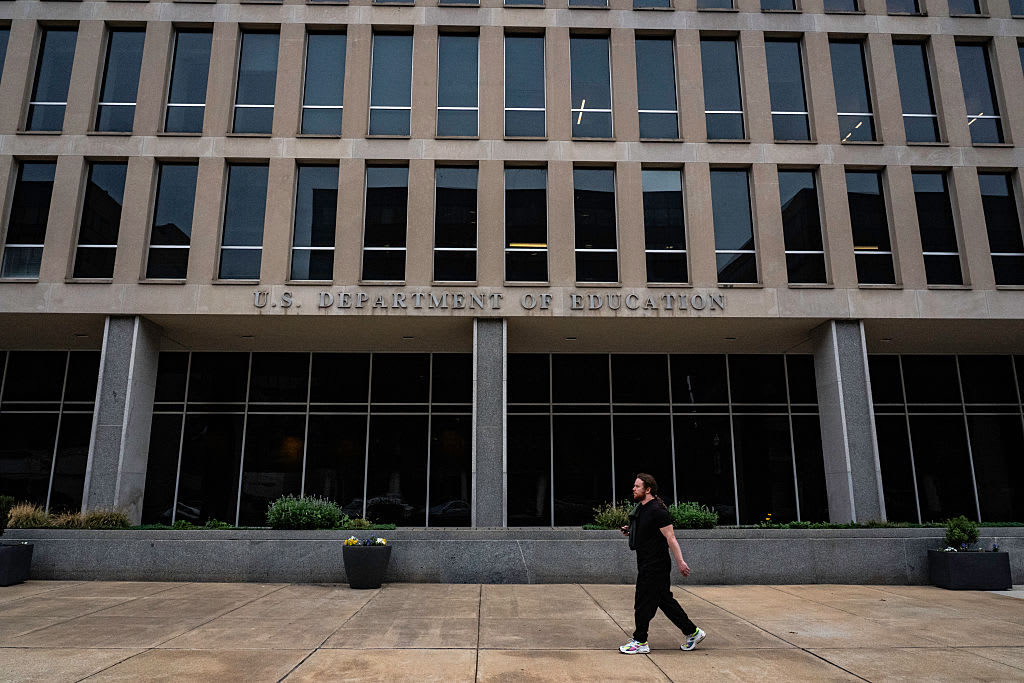
Public schools in the United States are required by the U.S. Constitution to allow students and staff to pray, the government said this week.
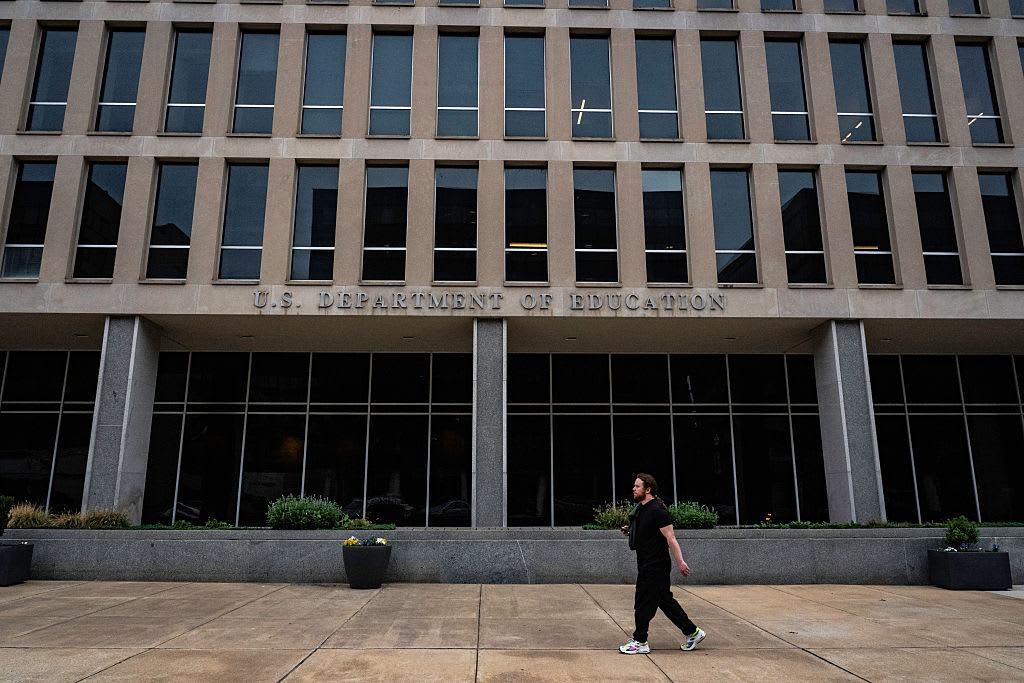
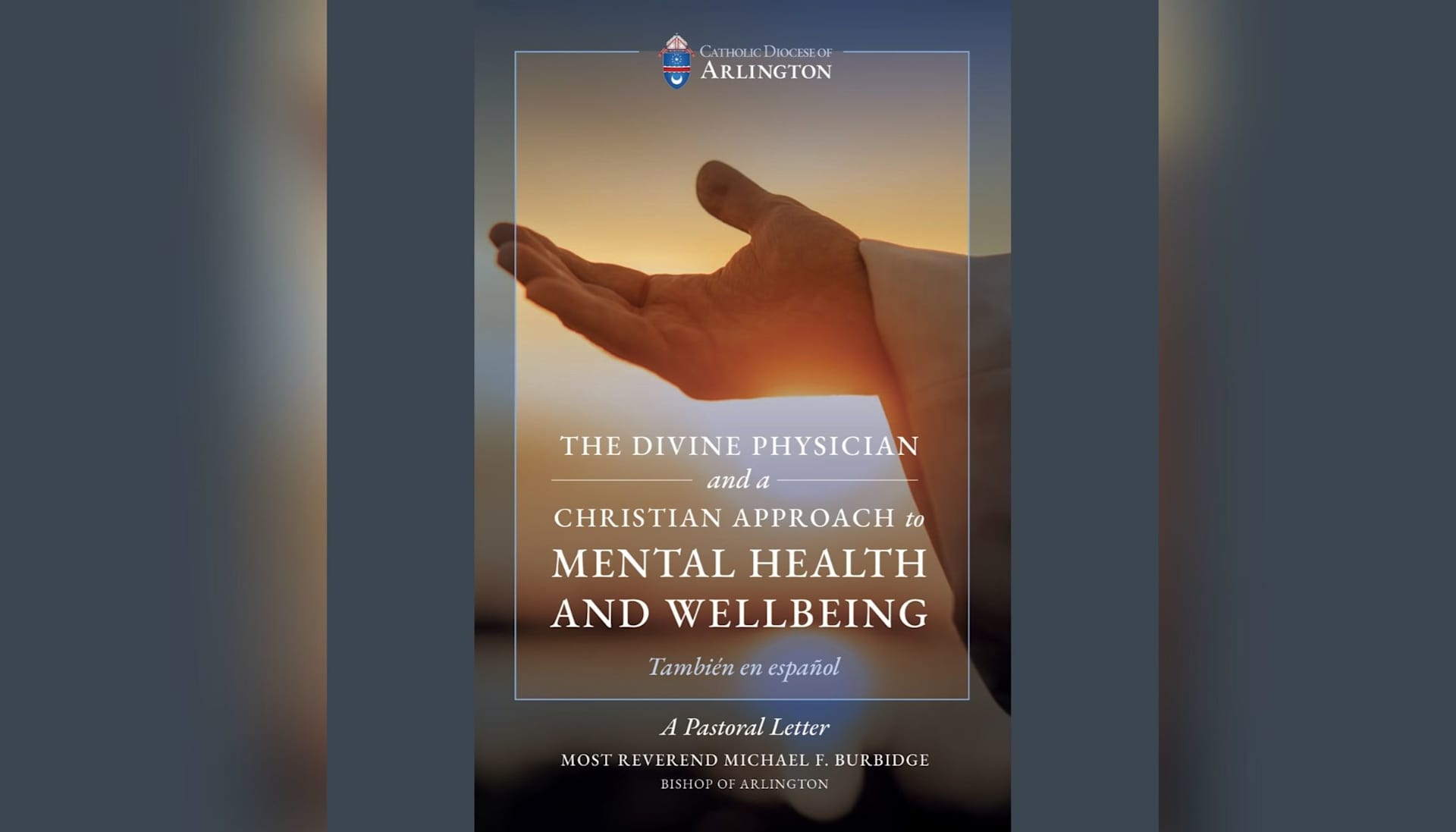
In a recent pastoral letter, Bishop Michael Burbidge addressed what he sees as a “crisis” in mental health among Catholics, especially the young, and seeks to remove stigma over seeking help.
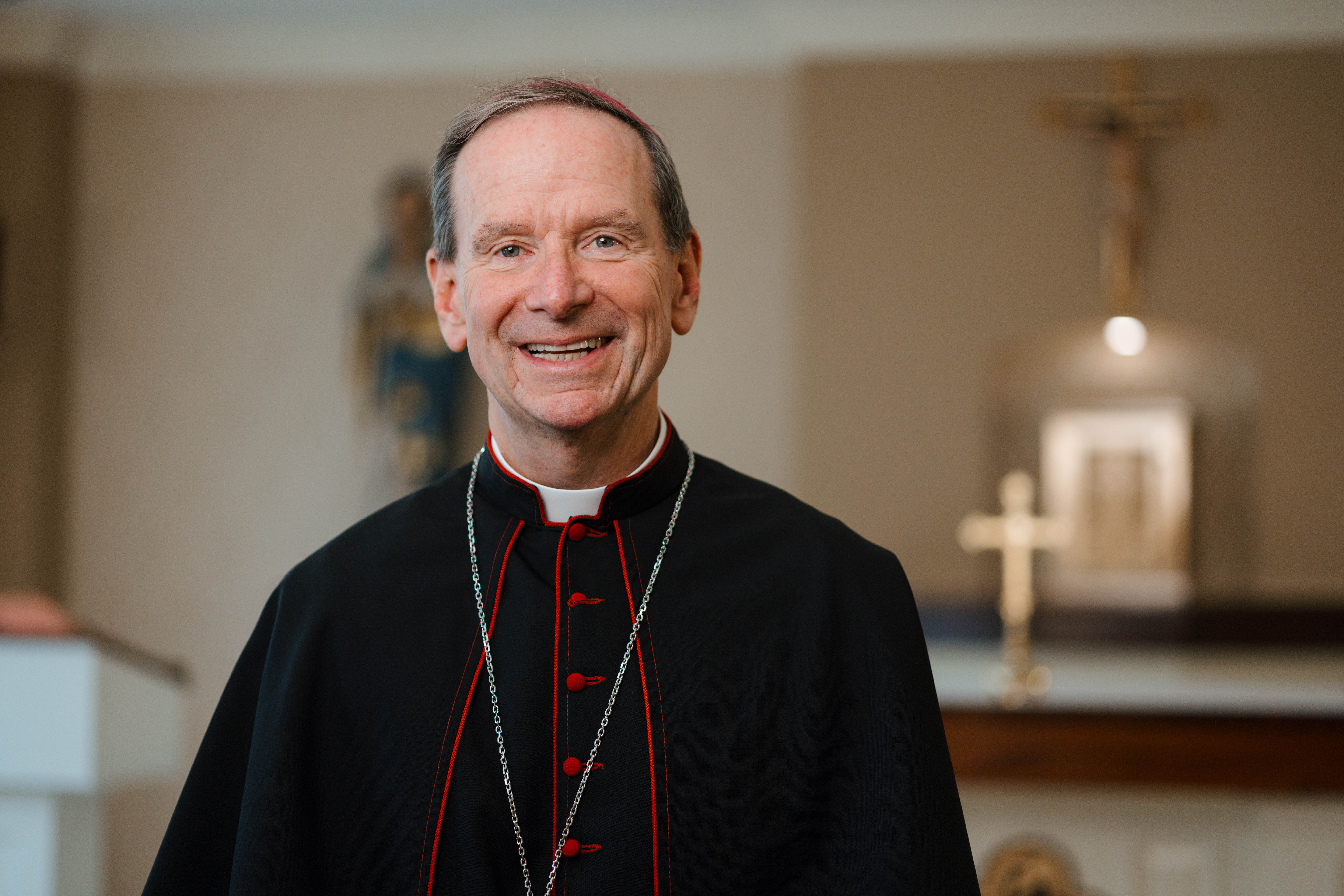


Deep Space Station 15 (DSS-15), one of the 112-foot (34-meter) antennas at the Goldstone Deep Space Communications Complex near Barstow, California, looks skyward, with the stars of the Milky Way overhead, in September 2025.
Read More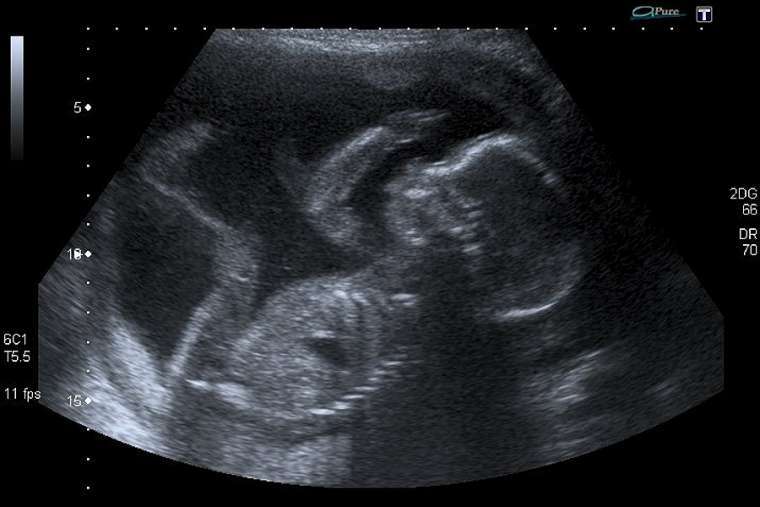

Jan 21, 2026 / 15:49 pm (CNA).
A federal health spending bill would impose a long-enforced ban on using taxpayer funds for elective abortion, known as the Hyde Amendment.
The U.S. House is set to consider the bill this week, which would fund the departments of Labor, Education, and Health and Human Services. Lawmakers would need to pass spending bills in both chambers and send them to the White House by Jan. 30 or the government could face another partial shutdown.
Republican President Donald Trump had asked his party to be “flexible” in its approach to the provision in a separate funding bill. According to a Jan. 19 news release from the Republican-led House Appropriations Committee, the Labor-HHS-Education spending bill includes the provision “protecting the lives of unborn children” known as the Hyde Amendment.
The Hyde Amendment, which is not permanent law, was first included as a rider in federal spending bills in 1976. It was included consistently since then although some recent legislation and budget proposals have sometimes excluded it. The provision would ban federal funds for abortion except when the unborn child is conceived through rape or incest or if the life of the mother is at risk.
Katie Glenn Daniel, director of legal affairs and policy counsel for Susan B. Anthony Pro-Life America, said the amendment is “a long-standing federal policy that’s been included for the last five decades and is popular with the American people.”
“Americans don’t want to pay for abortion on demand,” she said.
Many Democratic lawmakers have sought to eliminate the rider in recent years, saying it disproportionately limits abortion access for low-income women. Former President Joe Biden reversed his longtime support of the Hyde Amendment in the lead-up to the 2020 election and refused to include it in his spending proposals, saying: “If I believe health care is a right, as I do, I can no longer support an amendment that makes that right dependent on someone’s zip code.” But Republicans successfully negotiated the rider’s inclusion into spending bills.
In January 2025, Trump issued an executive order directing the government to enforce the Hyde Amendment. A year later, Trump urged Republicans to be “a little flexible on Hyde” when lawmakers were negotiating the extension of health care subsidies related to the Affordable Care Act. A White House spokesperson also said the president would work with Congress to ensure the strongest possible pro-life protections.
The House eventually passed the extension without the Hyde Amendment after 17 Republicans joined Democrats to support the bill. The Senate has not yet advanced the measure, where the question of whether to include the Hyde Amendment has been a point of contention between Republicans and Democrats.
In mid-January, Trump announced a plan to change how health care subsidies are disbursed. There was no mention of the Hyde Amendment in the White House’s 827-word memo.
The United States Conference of Catholic Bishops has consistently lobbied for the inclusion of the Hyde Amendment in spending bills. On Jan. 14, the bishops sent a letter to Congress “to stress in the strongest possible terms that Hyde is essential for health care policy that protects human dignity.”
“Authentic health care and the protection of human life go hand in hand,” the letter said. “There can be no compromise on these two combined values.”
Read More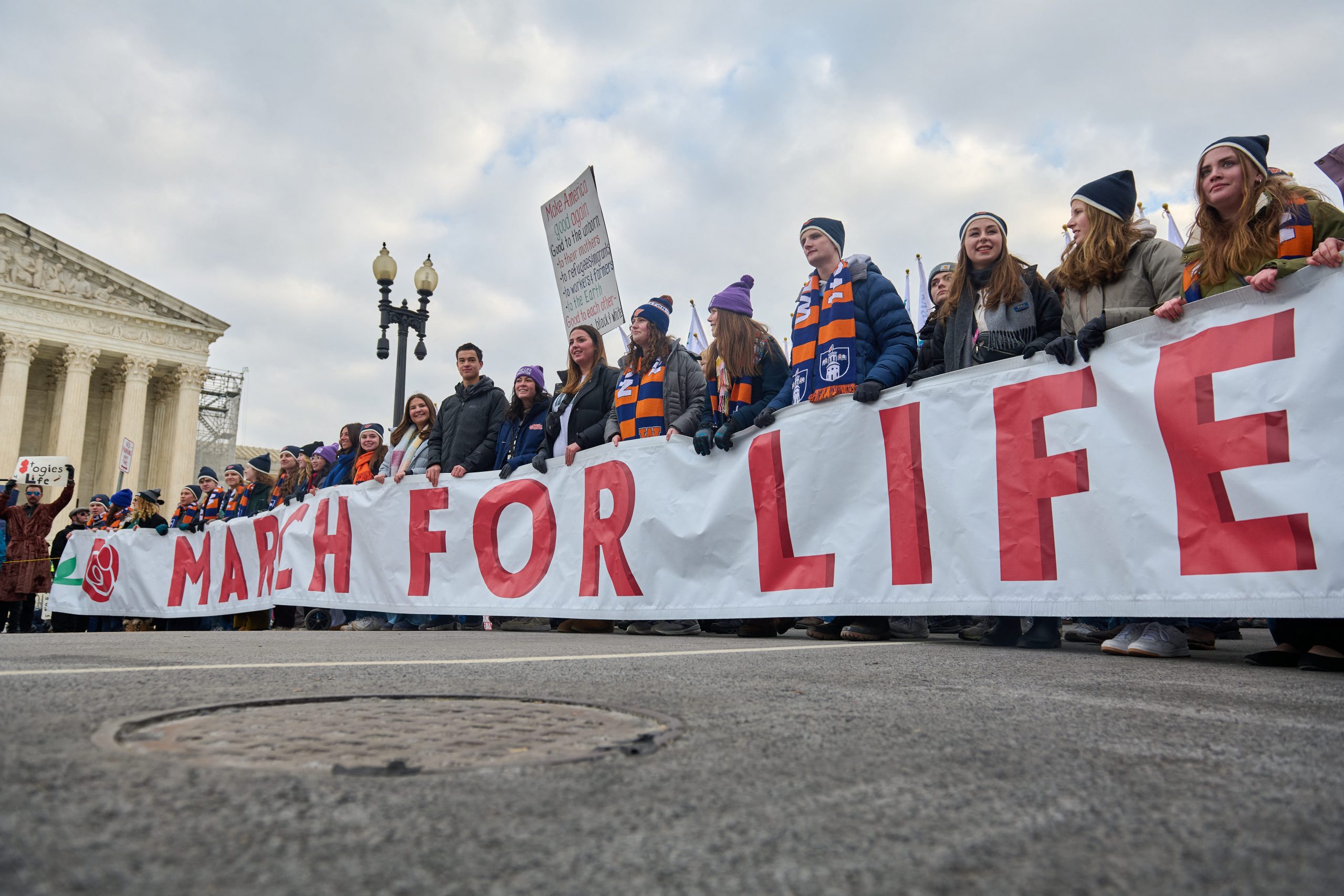

Jan 21, 2026 / 06:00 am (CNA).
With tens of thousands of pro-life Americans gathering for the 53rd annual March for Life in Washington, D.C., on Friday, Jan. 23, EWTN will provide live coverage of the event.
The yearly national pro-life event marks the anniversary of Roe v. Wade, drawing together thousands to protest abortion and advocate for life. This year’s theme is “Life Is a Gift,” which the March for Life official website says emphasizes the “unshakeable conviction that life is very good and worthy of protection, no matter the circumstances.”
5 p.m. ET: EWTN’s National March for Life coverage kicks off before the march with a night of prayer at the Basilica of the National Shrine of the Immaculate Conception. The National Prayer Vigil for Life is held annually on the eve of the March for Life, bringing thousands of pilgrims across the nation together to pray for an end to abortion.
At 5 p.m. ET, EWTN will stream the opening Mass followed by the Holy Hour of the National Prayer Vigil for Life at 7 p.m. as pro-lifers pray and prepare for the upcoming march.
8 a.m. ET: The all-night prayer vigil will conclude with the closing Mass of the National Prayer Vigil for Life at the shrine, televised live by EWTN.
9:30 p.m. to 4:30 p.m. ET: EWTN will air coverage of the March for Life, featuring a keynote by Sarah Hurm, a single mom of four who went through a chemical abortion reversal to save the life of her child.
Other speakers include Speaker of the House Mike Johnson, R-Louisiana; Rep. Chris Smith, R-New Jersey; and March for Life President Jennie Bradley Lichter. The march will also feature pro-life entrepreneurs including Shawnte Mallory, founder of Labir Love And Care, and Debbie Biskey, CEO of Options for Her, as well as student activist Elizabeth Pillsbury Oliver, a convert to Catholicism who heads Georgetown University’s Right to Life group.
Rev. Irinej Dobrijevic, a Serbian Orthodox bishop of the Diocese of Eastern America, and Cissie Graham Lynch, spokesperson for the Billy Graham Evangelistic Association, will also speak at the event.
In addition, the Christian band Sanctus Real will perform at the rally and the Friends of Club 21 choir — a chorus of young adults with Down syndrome — will perform the national anthem.
4 p.m. ET: EWTN will broadcast the second annual Life Fest Mass, sponsored by the Sisters of Life and the Knights of Columbus as part of the Life Fest Rally. The Life Fest Rally begins the evening before the march with live music from Matt Maher and other Christian bands.
2:30 p.m. ET: The 21st annual Walk for Life West Coast will begin with a rally followed by the walk. EWTN will livestream coverage of the walk.
5 p.m. ET: EWTN will televise highlights from One Life (Una Vida), a one-day event centered on witnessing human dignity with a focus on the pro-life issues as well as other issues such as human trafficking and homelessness. The coverage will be hosted by Astrid Bennett and Patricia Sandoval, along with EWTN producers, during the march.
8 p.m. ET: EWTN will televise a pro-life Mass from Los Angeles, concluding the weekend’s pro-life coverage.
Read More![Pro-life movement has mixed reaction after Trump’s first year of second term #Catholic
Participants in a pro-life rally hold signs in front of the Lincoln Memorial in Washington, D.C., on June 24, 2023, at a rally marking the first anniversary of the Supreme Court's Dobbs decision that overturned Roe v. Wade. | Credit: Joseph Portolano/EWTN News
Jan 20, 2026 / 14:37 pm (CNA).
Members of the pro-life movement have mixed thoughts on the first year of President Donald Trump’s second term, noting many wins early into his presidency but a number of shortfalls as time has gone by.Some wins include defunding Planned Parenthood, walking back some of President Joe Biden’s initiatives, and removing foreign aid funding for organizations that promote abortion. However, a lack of action on chemical abortions and weakened rhetoric surrounding taxpayer-funded abortions are causing concern.A notable pro-life win was included in the tax overhaul bill signed by Trump in July, which cut off all Medicaid reimbursements for organizations that provide a large number of abortions, such as Planned Parenthood.Amid funding cuts, nearly 70 Planned Parenthood affiliates shut down. The administration also initially cut off Title X family planning grants from the abortion giant, but those have resumed.The president pardoned pro-life protesters convicted of violating the Freedom of Access to Clinic Entrances (FACE) Act and blocked foreign aid from supporting organizations that promote abortion. He rescinded several policies from the Biden administration, including one that paid Pentagon workers to travel for abortions. He also established strong conscience protections for pro-life doctors.“Right out the gate, we saw some progress on the pro-life issue,” Kelsey Pritchard, a spokesperson for Susan B. Anthony Pro-Life America (SBA), told EWTN.Yet, she cautioned: “We have also not seen progress in the one area that matters the most — and that’s on abortion drugs.”Health Secretary Robert F. Kennedy Jr. launched a study into the safety of the abortion pill mifepristone in September 2025, but so far no action has been taken to curtail the drug. Rather, the Food and Drug Administration (FDA) went in the opposite direction, approving a generic version of mifepristone later that same month.Pritchard said that move was “the opposite of what they should have done,” and referred to the generic mifepristone as “a new kill pill to increase the number of abortions that are done in this country.”She said Kennedy’s promised study has “absolutely been moving too slow” and added that there is no confirmation it even began or is taking place. SBA called for FDA Commissioner Marty Makary to be fired following allegations he was “slow-walking the report for political reasons,” she said.Trump has said abortion should be regulated by the states, but Pritchard warned “those [pro-life] laws can’t be in effect at all, really, when mail-order abortion happens with the abortion drugs.”“They’re allowing [California Gov.] Gavin Newsom and [New York Gov.] Kathy Hochul and their blue state friends to completely nullify the pro-life laws in states like Texas and Florida,” she said.Joseph Meaney, a senior ethicist at the National Catholic Bioethics Center, similarly said “the delay in the promised review of the rushed process in which mifepristone was approved as an abortion drug by the FDA has frustrated pro-lifers.”“When the FDA approved a second generic version of mifepristone, … it highlighted the lack of progress in fighting the leading means of doing abortions in the [United States],” he said.Trump also began to waver on taxpayer-funded abortions early in 2026, asking Republicans to be “flexible” on the Hyde Amendment amid negotiations on extending health care subsidies for the Affordable Care Act. Trump later unveiled “The Great Healthcare Plan” and said the White House intends to negotiate with Congress to ensure pro-life protections.Pritchard called taxpayer-funded abortion “a very basic red line” and said it’s “concerning to see Republicans back away from something so basic.”She warned Republicans to not take pro-life voters for granted in the upcoming midterms, saying “you’ll lose the elections and we won’t have the majority of Congress” without pro-life voters.“You must remain the pro-life party or you will lose the midterms if you decide to bow to the pro-death Democrat agenda,” Pritchard said.Meaney said there is “a widespread feeling that the second Trump administration has seemed to deprioritize issues important to the pro-life community,” adding he has “seen calls for pro-life groups to ‘flex their muscles’ and show that they cannot be taken for granted.”However, he said the shortfalls “should not obscure the fact that the Trump administration has rolled back the Biden-era pro-abortion measures internationally and domestically.”“It even achieved a temporary defunding of Planned Parenthood domestically in legislation,” he said. “The federal government no longer funds research on fetal tissues and defends the conscience rights of health care professionals and others robustly.”Trump also signed an executive order that directed departments and agencies to boost access to and reduce the cost of in vitro fertilization (IVF). The Catholic Church opposes IVF, which results in the destruction of human embryos, ending human lives.](https://unitedyam.com/wp-content/uploads/2026/01/pro-life-movement-has-mixed-reaction-after-trumps-first-year-of-second-term-catholic-participants-in-a-pro-life-rally-hold-signs-in-front-of-the-lincoln-memorial-in-washington-d-c-on-scaled.jpg)

Jan 20, 2026 / 14:37 pm (CNA).
Members of the pro-life movement have mixed thoughts on the first year of President Donald Trump’s second term, noting many wins early into his presidency but a number of shortfalls as time has gone by.
Some wins include defunding Planned Parenthood, walking back some of President Joe Biden’s initiatives, and removing foreign aid funding for organizations that promote abortion. However, a lack of action on chemical abortions and weakened rhetoric surrounding taxpayer-funded abortions are causing concern.
A notable pro-life win was included in the tax overhaul bill signed by Trump in July, which cut off all Medicaid reimbursements for organizations that provide a large number of abortions, such as Planned Parenthood.
Amid funding cuts, nearly 70 Planned Parenthood affiliates shut down. The administration also initially cut off Title X family planning grants from the abortion giant, but those have resumed.
The president pardoned pro-life protesters convicted of violating the Freedom of Access to Clinic Entrances (FACE) Act and blocked foreign aid from supporting organizations that promote abortion. He rescinded several policies from the Biden administration, including one that paid Pentagon workers to travel for abortions. He also established strong conscience protections for pro-life doctors.
“Right out the gate, we saw some progress on the pro-life issue,” Kelsey Pritchard, a spokesperson for Susan B. Anthony Pro-Life America (SBA), told EWTN.
Yet, she cautioned: “We have also not seen progress in the one area that matters the most — and that’s on abortion drugs.”
Health Secretary Robert F. Kennedy Jr. launched a study into the safety of the abortion pill mifepristone in September 2025, but so far no action has been taken to curtail the drug. Rather, the Food and Drug Administration (FDA) went in the opposite direction, approving a generic version of mifepristone later that same month.
Pritchard said that move was “the opposite of what they should have done,” and referred to the generic mifepristone as “a new kill pill to increase the number of abortions that are done in this country.”
She said Kennedy’s promised study has “absolutely been moving too slow” and added that there is no confirmation it even began or is taking place. SBA called for FDA Commissioner Marty Makary to be fired following allegations he was “slow-walking the report for political reasons,” she said.
Trump has said abortion should be regulated by the states, but Pritchard warned “those [pro-life] laws can’t be in effect at all, really, when mail-order abortion happens with the abortion drugs.”
“They’re allowing [California Gov.] Gavin Newsom and [New York Gov.] Kathy Hochul and their blue state friends to completely nullify the pro-life laws in states like Texas and Florida,” she said.
Joseph Meaney, a senior ethicist at the National Catholic Bioethics Center, similarly said “the delay in the promised review of the rushed process in which mifepristone was approved as an abortion drug by the FDA has frustrated pro-lifers.”
“When the FDA approved a second generic version of mifepristone, … it highlighted the lack of progress in fighting the leading means of doing abortions in the [United States],” he said.
Trump also began to waver on taxpayer-funded abortions early in 2026, asking Republicans to be “flexible” on the Hyde Amendment amid negotiations on extending health care subsidies for the Affordable Care Act. Trump later unveiled “The Great Healthcare Plan” and said the White House intends to negotiate with Congress to ensure pro-life protections.
Pritchard called taxpayer-funded abortion “a very basic red line” and said it’s “concerning to see Republicans back away from something so basic.”
She warned Republicans to not take pro-life voters for granted in the upcoming midterms, saying “you’ll lose the elections and we won’t have the majority of Congress” without pro-life voters.
“You must remain the pro-life party or you will lose the midterms if you decide to bow to the pro-death Democrat agenda,” Pritchard said.
Meaney said there is “a widespread feeling that the second Trump administration has seemed to deprioritize issues important to the pro-life community,” adding he has “seen calls for pro-life groups to ‘flex their muscles’ and show that they cannot be taken for granted.”
However, he said the shortfalls “should not obscure the fact that the Trump administration has rolled back the Biden-era pro-abortion measures internationally and domestically.”
“It even achieved a temporary defunding of Planned Parenthood domestically in legislation,” he said. “The federal government no longer funds research on fetal tissues and defends the conscience rights of health care professionals and others robustly.”
Trump also signed an executive order that directed departments and agencies to boost access to and reduce the cost of in vitro fertilization (IVF). The Catholic Church opposes IVF, which results in the destruction of human embryos, ending human lives.
Read More![Catholics express mixed views on first year of Trump’s second term #Catholic
With Speaker of the House Mike Johnson by his side, President Donald Trump speaks to the press following a House Republican meeting at the U.S. Capitol on May 20, 2025, in Washington, D.C. | Credit: Tasos Katopodis/Getty Images
Jan 20, 2026 / 12:21 pm (CNA).
Catholics are offering mixed reactions to the first year of President Donald Trump’s second term, which included domestic policy actions that align with U.S. bishops on gender-related issues, and also tensions over immigration, expansion of the death penalty, and reduced funding for organizations that provide food and basic support to people in need.Trump secured his electoral victory in 2024 with the help of Catholics, who supported him by a double-digit margin, according to exit polls. A Pew Research Center report found that nearly a quarter of Trump’s voters in 2024 were Catholic.Throughout his first year, Trump — who calls himself a nondenominational Christian — has invoked Christianity and created a White House Faith Office. He created a Religious Liberty Commission by executive order in May 2025 and became the first president to issue a proclamation honoring the Catholic feast of the Immaculate Conception in December.Last year, the president also launched the “America Prays” initiative, which encouraged people to dedicate one hour of prayer for the United States and its people in preparation for the 250th anniversary of the Declaration of Independence on July 4, 2026.Immigration, poverty, and NGOsJohn White, professor of politics at The Catholic University of America, said the first year of Trump’s second term “challenged Catholics on many levels.”“The brutality of ICE has caused the U.S. Conference of Catholic Bishops to issue an extraordinary statement at the prompting of Pope Leo XIV,” White said, referring to the Immigration and Customs Enforcement agency. The U.S. Conference of Catholic Bishops (USCCB) issued a special message in November opposing indiscriminate mass deportations, calling for humane treatment, urging meaningful reform, and affirming the compatibility of national security with human dignity.The Trump administration, with JD Vance, the second Catholic vice president in U.S. history, cut billions of dollars in funding to nongovernmental organizations (NGOs), which financially damaged several Catholic nonprofits that had received funding. Trump also signed into law historic cuts to the Supplemental Nutrition Assistance Program.“The cuts to NGO funding, SNAP, and Medicaid benefits, alongside the huge increases in health care costs, have hurt the poor and middle class at home and around the world,” he said. “Instead of being the good Samaritan, Trump has challenged our Catholic values and narrowed our vision of who we are and what we believe. JD Vance’s interpretation of ‘Ordo Amoris’ of a hierarchy to those whom we love rather than a universal love is a case in point and has been repudiated by Pope Francis and Pope Leo XIV,” he said.The cuts aligned federal policy with the administration’s agenda, which included strict immigration enforcement, mass deportations of immigrants who are in the country illegally, and less foreign aid support.Catholic Charities USA was previously receiving more than $100 million annually for migrant services, and the Trump administration cut off those funds. In response, the organization scaled back its services.Since Trump took office, the administration said it has deported more than 600,000 people.Karen Sullivan, director of advocacy for the Catholic Legal Immigration Network (CLINIC), which provides legal services to migrants, said she is “very concerned about the way that immigration enforcement has been carried out,” adding her organization is “very concerned that human dignity of all persons [needs to] be respected.”Sullivan said the administration is “enabling their officers to use excessive force as they are taking people into custody” and “denying access to oversight at their detention centers.” She also expressed concern about the administration increasing fees for asylum applications and giving agents more leeway to conduct immigration enforcement at sensitive locations, such as churches, schools, and hospitals.She said the large number of deportations and the increase in expedited removals has “been a strain” on organizations that seek to provide legal help to migrants.CLINIC receives inquiries from people who are facing deportation and also those who fear they may be deported. She said: “The worry and the fear among those people [who may face deportation] makes them seek out assistance and advice even more often.”“The pace of the changes that have been happening in the past year have been very difficult to manage,” she said. “We are having to respond very quickly to changes."Executive actions on genderSusan Hanssen, a history professor at the University of Dallas (a Catholic institution), viewed the first year of Trump’s second term in mostly successful terms.“As Catholics we know that the law educates, and during Trump’s first year in office we witnessed an actual shift in public opinion on the LGBT/transgender ideology due to his asserting the scientific and natural common sense that there are only male and female,” Hanssen said.Trump took executive action to prohibit what he called the “chemical and surgical mutilation” of children, such as hormone therapy and surgical transition. He signed a policy restricting participation of transgender athletes in women’s sports. He legally recognized only two genders, determined by biology: male and female.“His strong executive action on this essential point — domestically in making the executive branch remove its trans-affirming language, the executive department of education stop subverting parental rights over their children, and women’s rights in sports, and (importantly) putting an end to USAID’s [U.S. Agency for International Development] pushing this gender agenda on the countries who need our economic assistance,” she said.“This has led to a genuine public shift, with fewer independent corporations choosing to enforce June as LGBT Pride month on their customer base, fewer DEI programs pushing the gender agenda on hiring, and a shift (especially among young men) towards disapproval of gender transitioning children and even towards disapproval of the legalization of so-called same sex ‘marriage,’” she added. “We will need to see how these executive branch victories will affect judicial and legislative action moving forward.”Father Tadeusz Pacholczyk, senior ethicist at the National Catholic Bioethics Center, had a similar view of some of the social changes.“The current administration has focused significant energy on the important task of ‘putting folks on notice,’ so it’s hard to deny, for example, that the misguided medico-pharmaceutical industry that has profited handsomely from exploiting vulnerable youth and other gender dysphoric individuals can no longer miss the loud indicators that these practices will not be able to continue unabated,” he said.Death penaltyTrump signaled a renewed and more aggressive federal capital-punishment policy in 2025, in opposition to the Catechism of the Catholic Church, which teaches that the death penalty is “inadmissible.”Trump signed an executive order on his first day in office directing the Justice Department to actively pursue the federal death penalty for serious crimes. He also directed federal prosecutors to seek death sentences in Washington, D.C., homicide cases. His administration lifted a moratorium on executions, reversing a pause in federal executions and following President Joe Biden’s commutations of federal death sentences.Archbishop Timothy P. Broglio, then-president of the USCCB, in a Jan. 22, 2025, statement called Trump’s support for expanding the federal death penalty “deeply troubling.” Newly elected USCCB president Archbishop Paul Coakley likewise called for the abolition of the death penalty.](https://unitedyam.com/wp-content/uploads/2026/01/catholics-express-mixed-views-on-first-year-of-trumps-second-term-catholic-with-speaker-of-the-house-mike-johnson-by-his-side-president-donald-trump-speaks-to-the-press-following-a-hous.jpg)

Jan 20, 2026 / 12:21 pm (CNA).
Catholics are offering mixed reactions to the first year of President Donald Trump’s second term, which included domestic policy actions that align with U.S. bishops on gender-related issues, and also tensions over immigration, expansion of the death penalty, and reduced funding for organizations that provide food and basic support to people in need.
Trump secured his electoral victory in 2024 with the help of Catholics, who supported him by a double-digit margin, according to exit polls. A Pew Research Center report found that nearly a quarter of Trump’s voters in 2024 were Catholic.
Throughout his first year, Trump — who calls himself a nondenominational Christian — has invoked Christianity and created a White House Faith Office. He created a Religious Liberty Commission by executive order in May 2025 and became the first president to issue a proclamation honoring the Catholic feast of the Immaculate Conception in December.
Last year, the president also launched the “America Prays” initiative, which encouraged people to dedicate one hour of prayer for the United States and its people in preparation for the 250th anniversary of the Declaration of Independence on July 4, 2026.
John White, professor of politics at The Catholic University of America, said the first year of Trump’s second term “challenged Catholics on many levels.”
“The brutality of ICE has caused the U.S. Conference of Catholic Bishops to issue an extraordinary statement at the prompting of Pope Leo XIV,” White said, referring to the Immigration and Customs Enforcement agency. The U.S. Conference of Catholic Bishops (USCCB) issued a special message in November opposing indiscriminate mass deportations, calling for humane treatment, urging meaningful reform, and affirming the compatibility of national security with human dignity.
The Trump administration, with JD Vance, the second Catholic vice president in U.S. history, cut billions of dollars in funding to nongovernmental organizations (NGOs), which financially damaged several Catholic nonprofits that had received funding. Trump also signed into law historic cuts to the Supplemental Nutrition Assistance Program.
“The cuts to NGO funding, SNAP, and Medicaid benefits, alongside the huge increases in health care costs, have hurt the poor and middle class at home and around the world,” he said. “Instead of being the good Samaritan, Trump has challenged our Catholic values and narrowed our vision of who we are and what we believe. JD Vance’s interpretation of ‘Ordo Amoris’ of a hierarchy to those whom we love rather than a universal love is a case in point and has been repudiated by Pope Francis and Pope Leo XIV,” he said.
The cuts aligned federal policy with the administration’s agenda, which included strict immigration enforcement, mass deportations of immigrants who are in the country illegally, and less foreign aid support.
Catholic Charities USA was previously receiving more than $100 million annually for migrant services, and the Trump administration cut off those funds. In response, the organization scaled back its services.
Since Trump took office, the administration said it has deported more than 600,000 people.
Karen Sullivan, director of advocacy for the Catholic Legal Immigration Network (CLINIC), which provides legal services to migrants, said she is “very concerned about the way that immigration enforcement has been carried out,” adding her organization is “very concerned that human dignity of all persons [needs to] be respected.”
Sullivan said the administration is “enabling their officers to use excessive force as they are taking people into custody” and “denying access to oversight at their detention centers.” She also expressed concern about the administration increasing fees for asylum applications and giving agents more leeway to conduct immigration enforcement at sensitive locations, such as churches, schools, and hospitals.
She said the large number of deportations and the increase in expedited removals has “been a strain” on organizations that seek to provide legal help to migrants.
CLINIC receives inquiries from people who are facing deportation and also those who fear they may be deported. She said: “The worry and the fear among those people [who may face deportation] makes them seek out assistance and advice even more often.”
“The pace of the changes that have been happening in the past year have been very difficult to manage,” she said. “We are having to respond very quickly to changes."
Susan Hanssen, a history professor at the University of Dallas (a Catholic institution), viewed the first year of Trump’s second term in mostly successful terms.
“As Catholics we know that the law educates, and during Trump’s first year in office we witnessed an actual shift in public opinion on the LGBT/transgender ideology due to his asserting the scientific and natural common sense that there are only male and female,” Hanssen said.
Trump took executive action to prohibit what he called the “chemical and surgical mutilation” of children, such as hormone therapy and surgical transition. He signed a policy restricting participation of transgender athletes in women’s sports. He legally recognized only two genders, determined by biology: male and female.
“His strong executive action on this essential point — domestically in making the executive branch remove its trans-affirming language, the executive department of education stop subverting parental rights over their children, and women’s rights in sports, and (importantly) putting an end to USAID’s [U.S. Agency for International Development] pushing this gender agenda on the countries who need our economic assistance,” she said.
“This has led to a genuine public shift, with fewer independent corporations choosing to enforce June as LGBT Pride month on their customer base, fewer DEI programs pushing the gender agenda on hiring, and a shift (especially among young men) towards disapproval of gender transitioning children and even towards disapproval of the legalization of so-called same sex ‘marriage,’” she added. “We will need to see how these executive branch victories will affect judicial and legislative action moving forward.”
Father Tadeusz Pacholczyk, senior ethicist at the National Catholic Bioethics Center, had a similar view of some of the social changes.
“The current administration has focused significant energy on the important task of ‘putting folks on notice,’ so it’s hard to deny, for example, that the misguided medico-pharmaceutical industry that has profited handsomely from exploiting vulnerable youth and other gender dysphoric individuals can no longer miss the loud indicators that these practices will not be able to continue unabated,” he said.
Trump signaled a renewed and more aggressive federal capital-punishment policy in 2025, in opposition to the Catechism of the Catholic Church, which teaches that the death penalty is “inadmissible.”
Trump signed an executive order on his first day in office directing the Justice Department to actively pursue the federal death penalty for serious crimes. He also directed federal prosecutors to seek death sentences in Washington, D.C., homicide cases. His administration lifted a moratorium on executions, reversing a pause in federal executions and following President Joe Biden’s commutations of federal death sentences.
Archbishop Timothy P. Broglio, then-president of the USCCB, in a Jan. 22, 2025, statement called Trump’s support for expanding the federal death penalty “deeply troubling.” Newly elected USCCB president Archbishop Paul Coakley likewise called for the abolition of the death penalty.
Read More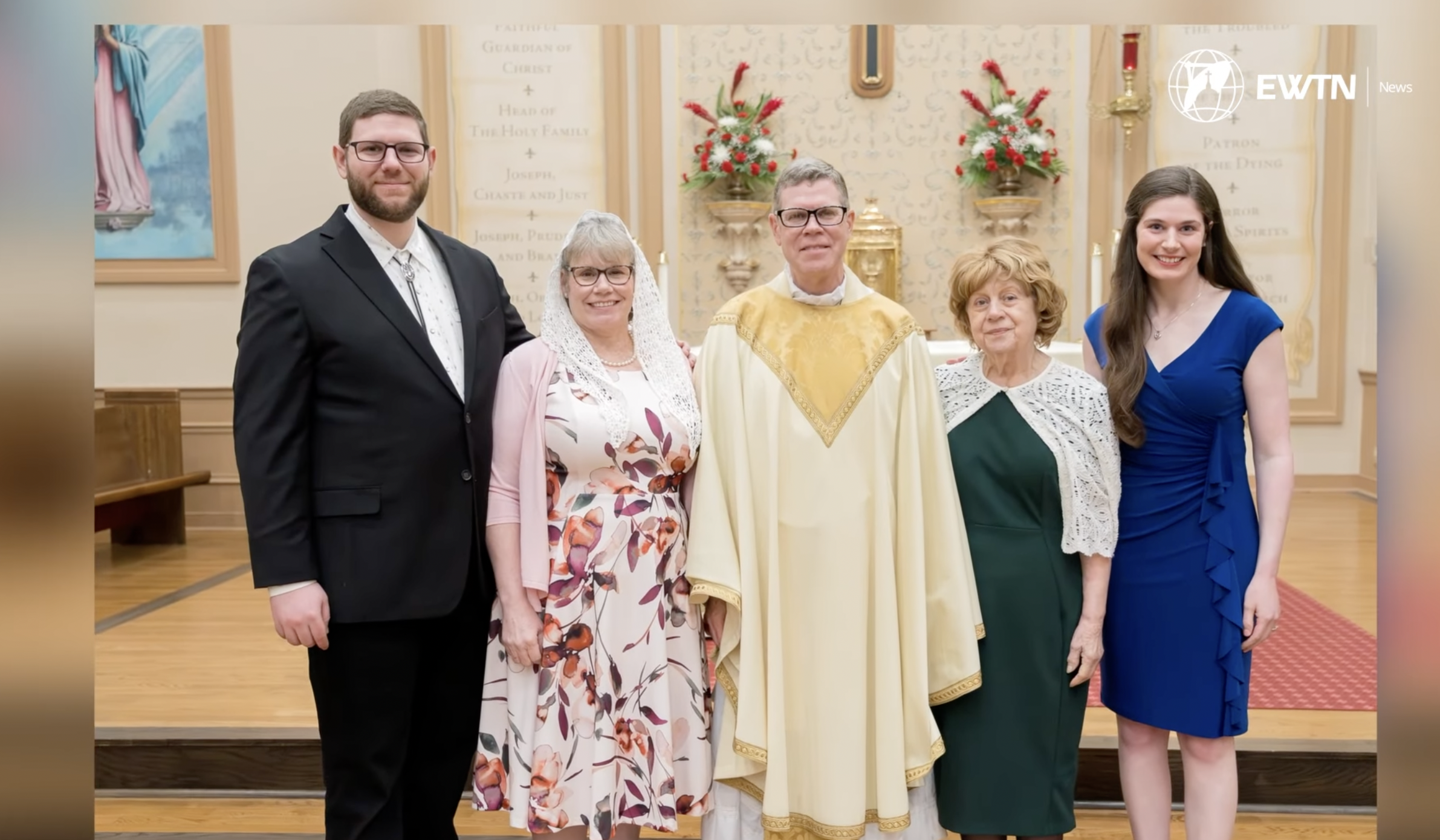

Jan 17, 2026 / 11:00 am (CNA).
Father Travis Moger has been a Catholic priest for just nine months, and his journey to ordination was a unique one. A former Baptist pastor and Navy chaplain, he was ordained in May 2025 in the Diocese of Wheeling-Charleston, West Virginia, seven years after he, his wife, and his son entered the Catholic Church.
“I didn’t come into the Church in order to be a priest; God used prayer to draw me to the Catholic Church,” Moger told EWTN News reporter Julia Convery.
During a military campaign as a Navy chaplain, Moger; his wife, Amelia; and his son, Mark, all separately began to feel the call toward Catholicism. While Moger was away, his wife had begun attending RCIA (Rite of Christian Initiation of Adults, which is now called OCIA — the Order of Christian Initiation of Adults).
Father Thomas Falkenthal, Moger’s former Navy chaplain supervisor, witnessed the seeds being planted in Moger’s heart.
“He was connecting with the liturgy. The Catholic Mass was certainly far from his tradition. I could tell it was touching him,” Falkenthal shared with Convery.
“He didn’t realize it, but all the way back home in the United States his wife, Amelia, was going to RCIA and preparing to join the Catholic Church. So when he came home from that deployment, they both had something to share with each other. Now I think that’s an amazing movement of the Spirit to keep that couple so close," Falkenthal said.
“It was definitely a God thing definitely to draw her towards the Catholic Church,” Moger added.
After a five-year journey of study and conversion, Moger, his wife, and his son were received into the Catholic Church on Easter Sunday 2018.
“I entered the Church not knowing if there would be a path to the priesthood for me,” Moger shared.
Bishop Mark Brennan of the Diocese of Wheeling-Charleston explained that Pope Francis eventually granted Moger a dispensation from the usual requirement of celibacy for the Catholic priesthood, allowing him to be ordained a priest.
The bishop also pointed out that he believes having a desire for a family is a trait that makes a good priest.
“When I was a vocations director, I always looked for would this man make a good husband and father? If he would, then he’d probably make a good priest,” Brennan said.
Moger also highlighted this trait as one that allows him to have a unique perspective into his now-spiritual fatherhood.
“There’s something about being able to bring a child into the world and then nurture them and you’re fully invested in another person. And I think that experience does inform the way you look at spiritual fatherhood and the way you look at God’s fatherhood,” Moger said.
Moger’s son, Mark, told EWTN News that his father’s newly found spiritual fatherhood has brought a “deeper spirituality” into their family.
Maddy Cordle, Moger’s daughter, added: “I’ve had the privilege of watching his conversion from the beginning — same with my mom and my brother —and I just got to watch how it brought them so much closer to each other in their marriage, together as a family, but also really, really strengthened their relationship with God.”
“To him there’s nothing more important than the impoverished and the cast aside. That’s his charism and you’ll see it throughout his ministry,” Mark added.
Despite his unconventional journey to the priesthood, Moger sees it as the result of saying “yes” to God.
“God honors it when we start moving in the direction that he’s leading us, trusting that he’s going to work it out,” he said.
Read More![U.S. bishops say multimillion-dollar Eucharistic revival bore spiritual fruit #Catholic
Scene from the 2024 National Eucharistic Congress in Indianapolis. | Credit: “EWTN News in Depth”/Screenshot
Jan 17, 2026 / 09:00 am (CNA).
Catholic clergy and lay people reported a stronger devotion to the Eucharist after the National Eucharistic Revival.This week, the United States Conference of Catholic Bishops (USCCB) released the report for the National Eucharistic Revival Impact Study. Done in collaboration with the National Eucharistic Congress corporation and Vinea Research, the study surveyed nearly 2,500 lay Catholics, clergy, and Church staff during the summer and fall of 2025.The online survey asked questions about revival promotion, participation, and impact one year after the initial National Eucharistic Pilgrimage and Congress. The price tag of the Eucharistic congress was more than $10 million, organizers said.“Never in my tenure of working for the Church have I seen such deep impact,” said Jason Shanks, president of the National Eucharistic Congress, in a press release. “The fruits of the National Eucharistic Revival are real, lasting, and will continue to shape the life of the American Church for years to come.”The revival, sponsored by the USCCB, launched in June 2022 with the mission to “renew the Church by enkindling a living relationship with the Lord Jesus Christ in the holy Eucharist.”The three-year initiative, which concluded in 2025, included the 10th National Eucharistic Congress and the National Eucharistic Pilgrimage in 2024 and 2025.In a Jan. 16 interview on “EWTN News In Depth,” Bishop Andrew Cozzens, chair of the National Eucharistic Congress, said he was “extremely heartened” by the results of the study.“I had a sense that the revival had a big impact on people and especially on our Church,” he said. “But it was great to see that confirmed by the data and to see some of the actual statistics.”Impact on clergy membersOf 249 clergy members of priests and deacons surveyed, 49% reported feeling “more encouraged’ since the revival began. Specifically, 38% said they feel “somewhat more encouraged” and 11% said they feel “significantly more encouraged.”Nearly half, 48%, said they feel “more comfortable encouraging others to share their faith.”The research found the revival “refocused clergy on the Eucharist,” with the majority reporting changes to their pastoral approach since 2021. The report found that 70% of clergy reported a stronger “focus on the Eucharist in teaching [and] ministry,” and 69% said they have a stronger “emphasis on evangelization and outreach.”Clergy also reported personal advancements with their relationship with the Eucharist. More than half (51%) said their “time spent in personal adoration” is stronger now than it was in 2021. “I was so grateful when I saw that priests found it encouraging. They were encouraged by this opportunity to focus on the Eucharist,” Cozzens said. “I know so much more preaching and encouragement about Eucharistic devotion happened in our parishes during this time.”“If our priests are encouraged and they’re drawing closer to Jesus in the Eucharist, that’s going to help our people so much, and it’s going to help our Church so much,” he said.Impact on lay CatholicsAmong 1,758 of the lay Catholics surveyed, 874 were labeled as “national participants” who attended the National Eucharistic Pilgrimage, National Eucharistic Congress, or both. “We wanted Catholics to come together and to experience more deeply a profound love for Jesus in the Eucharist, and then from that, to be sent out on mission,” Cozzens said. The study “showed that anyone who attended one of our National Eucharistic Pilgrimages or National Eucharistic Congress said they were 50% more likely to do outreach, to share their faith, to do some act of service.”“I think the thing that most stood out to me is that we accomplished our goal,” he said. “Our goal was really to bring about a missionary conversion of Catholics.”Another 425 of lay Catholics were “local participants” who took part in local processions, small groups, and revival-specific Holy Hours. Most (83%) of the laypeople surveyed who participated at the national or local level said their “overall level of faith” is stronger now than it was in 2021.The other 459 laypeople surveyed were “nonparticipating contacts” who did not participate in any revival activities. Most came from the USCCB’s newsletter distribution list and they were aware of the revival but not involved. Even though they did not directly participate, 79% reported their “overall level of faith” was stronger following the revival.When asked to compare their faith practices with those in 2021, lay Catholics overwhelmingly reported praying more, attending adoration more frequently, and going to confession more often.The research took a deeper look at how lay Catholics’ faith evolved, examining the changes in the level of “importance” of faith-related activities over the last three years. The greatest growth in importance was observed in volunteering and spending time in Eucharistic adoration.In 2021, 57% of lay national participants reported “spending quiet time in Eucharistic adoration” was “very important” or “extremely important” to them. Following the revival, the number had jumped to 76%. There was also an increase for local participants with a rise from 65% to 82%. Among those who did not directly participate, there was the largest increase from 49% to 69%.Continuing to spread the ‘fire’The bishops have confirmed that the country’s second National Eucharistic Congress of the 21st century will take place in 2029.“As we continue to strengthen the core of our faith and those people who are committed, and they begin to draw closer to Jesus from Eucharist, what the study showed is that they get on fire, and then they start to spread that fire,” he said.“It’s the way Jesus worked himself. Jesus certainly did preach to crowds, but most of the time he spent with his 12 apostles and with those people who were with him. Because if he could convert and strengthen them, then they could go out and convert the world,” he said.“I think that’s really the goal of the whole Eucharistic movement that we have now is strengthening those people so that they can become the witnesses that we’re called to be,” he said.](https://unitedyam.com/wp-content/uploads/2026/01/u-s-bishops-say-multimillion-dollar-eucharistic-revival-bore-spiritual-fruit-catholic-scene-from-the-2024-national-eucharistic-congress-in-indianapolis-credit-ewtn-news-in-depth.jpg)

Jan 17, 2026 / 09:00 am (CNA).
Catholic clergy and lay people reported a stronger devotion to the Eucharist after the National Eucharistic Revival.
This week, the United States Conference of Catholic Bishops (USCCB) released the report for the National Eucharistic Revival Impact Study. Done in collaboration with the National Eucharistic Congress corporation and Vinea Research, the study surveyed nearly 2,500 lay Catholics, clergy, and Church staff during the summer and fall of 2025.
The online survey asked questions about revival promotion, participation, and impact one year after the initial National Eucharistic Pilgrimage and Congress. The price tag of the Eucharistic congress was more than $10 million, organizers said.
“Never in my tenure of working for the Church have I seen such deep impact,” said Jason Shanks, president of the National Eucharistic Congress, in a press release. “The fruits of the National Eucharistic Revival are real, lasting, and will continue to shape the life of the American Church for years to come.”
The revival, sponsored by the USCCB, launched in June 2022 with the mission to “renew the Church by enkindling a living relationship with the Lord Jesus Christ in the holy Eucharist.”
The three-year initiative, which concluded in 2025, included the 10th National Eucharistic Congress and the National Eucharistic Pilgrimage in 2024 and 2025.
In a Jan. 16 interview on “EWTN News In Depth,” Bishop Andrew Cozzens, chair of the National Eucharistic Congress, said he was “extremely heartened” by the results of the study.
“I had a sense that the revival had a big impact on people and especially on our Church,” he said. “But it was great to see that confirmed by the data and to see some of the actual statistics.”
Of 249 clergy members of priests and deacons surveyed, 49% reported feeling “more encouraged’ since the revival began. Specifically, 38% said they feel “somewhat more encouraged” and 11% said they feel “significantly more encouraged.”
Nearly half, 48%, said they feel “more comfortable encouraging others to share their faith.”
The research found the revival “refocused clergy on the Eucharist,” with the majority reporting changes to their pastoral approach since 2021. The report found that 70% of clergy reported a stronger “focus on the Eucharist in teaching [and] ministry,” and 69% said they have a stronger “emphasis on evangelization and outreach.”
Clergy also reported personal advancements with their relationship with the Eucharist. More than half (51%) said their “time spent in personal adoration” is stronger now than it was in 2021.
“I was so grateful when I saw that priests found it encouraging. They were encouraged by this opportunity to focus on the Eucharist,” Cozzens said. “I know so much more preaching and encouragement about Eucharistic devotion happened in our parishes during this time.”
“If our priests are encouraged and they’re drawing closer to Jesus in the Eucharist, that’s going to help our people so much, and it’s going to help our Church so much,” he said.
Among 1,758 of the lay Catholics surveyed, 874 were labeled as “national participants” who attended the National Eucharistic Pilgrimage, National Eucharistic Congress, or both.
“We wanted Catholics to come together and to experience more deeply a profound love for Jesus in the Eucharist, and then from that, to be sent out on mission,” Cozzens said. The study “showed that anyone who attended one of our National Eucharistic Pilgrimages or National Eucharistic Congress said they were 50% more likely to do outreach, to share their faith, to do some act of service.”
“I think the thing that most stood out to me is that we accomplished our goal,” he said. “Our goal was really to bring about a missionary conversion of Catholics.”
Another 425 of lay Catholics were “local participants” who took part in local processions, small groups, and revival-specific Holy Hours. Most (83%) of the laypeople surveyed who participated at the national or local level said their “overall level of faith” is stronger now than it was in 2021.
The other 459 laypeople surveyed were “nonparticipating contacts” who did not participate in any revival activities. Most came from the USCCB’s newsletter distribution list and they were aware of the revival but not involved. Even though they did not directly participate, 79% reported their “overall level of faith” was stronger following the revival.
When asked to compare their faith practices with those in 2021, lay Catholics overwhelmingly reported praying more, attending adoration more frequently, and going to confession more often.
The research took a deeper look at how lay Catholics’ faith evolved, examining the changes in the level of “importance” of faith-related activities over the last three years. The greatest growth in importance was observed in volunteering and spending time in Eucharistic adoration.
In 2021, 57% of lay national participants reported “spending quiet time in Eucharistic adoration” was “very important” or “extremely important” to them. Following the revival, the number had jumped to 76%. There was also an increase for local participants with a rise from 65% to 82%. Among those who did not directly participate, there was the largest increase from 49% to 69%.
The bishops have confirmed that the country’s second National Eucharistic Congress of the 21st century will take place in 2029.
“As we continue to strengthen the core of our faith and those people who are committed, and they begin to draw closer to Jesus from Eucharist, what the study showed is that they get on fire, and then they start to spread that fire,” he said.
“It’s the way Jesus worked himself. Jesus certainly did preach to crowds, but most of the time he spent with his 12 apostles and with those people who were with him. Because if he could convert and strengthen them, then they could go out and convert the world,” he said.
“I think that’s really the goal of the whole Eucharistic movement that we have now is strengthening those people so that they can become the witnesses that we’re called to be,” he said.
Read More![CUA professor launches AI marketplace in line with Catholic social teaching #Catholic
Credit: David Gyung/Shutterstock
Jan 17, 2026 / 06:00 am (CNA).
An artificial intelligence (AI) marketplace launched by a business professor at The Catholic University of America seeks to offer products and services in a venue consistent with the social teachings of the Catholic Church — it is called Almma AI.Lucas Wall, who teaches finance at the university and has led several entrepreneurial ventures, began building Almma AI in mid-2023. The marketplace facilitates transactions for AI-related products, allowing people to upload their creations to be purchased or, in some cases, used for no charge.The types of products that can be offered on the marketplace include Large Language Models (LLMs) — similar to ChatGPT and Grok — along with AI prompts, personas, assistants, agents, and plugins.Although other marketplaces exist, Wall told EWTN News that Almma AI is designed to ensure the average person can “benefit from this new revolution that is coming” by selling or purchasing products in the marketplace.“With most technological revolutions and changes, there are only a handful of people who make fortunes,” Wall said.Almma’s mission statement is “AI profits for all,” and Wall said it is meant to “help people monetize their knowledge.” He said the marketplace can “build bridges across cultures” because people anywhere can access it, and “allows people to make solutions for their neighbors or for their parishes.”Almma does not exclusively offer Catholic-related products, but it does block the sale of anything that is immoral or could provoke sin, which Wall said was another major contrast with other AI marketplaces.“I want to be part of the group of people who help innovation meet morality,” he said.Among the examples of problems within larger AI companies, he noted, are the development of artificial romantic chatbots and the creation of erotica and artificial pornographic images and videos. He also expressed concern about AI consultation in end-of-life care.“I refuse to believe we don’t have enough imagination as a Catholic community and the courage to build something better,” Wall said.AI and Catholic social teachingWall said the development of Almma AI was “responding to the call of Pope Francis that he very clearly outlined in [the 2025 doctrinal note] Antiqua et Nova” and also took inspiration from Pope Leo XIII’s 1891 encyclical Rerum Novarum.In Antiqua et Nova, the Vatican holds that the development of AI should spur us to “a renewed appreciation of all that is human.” It teaches that AI should be used to serve the common good, promote human development, and not simply be used for individual or corporate gain.That note builds on the framework provided in Rerum Novarum, which expressed Catholic social teaching in the wake of the industrial revolution. At the time, Pope Leo XIII emphasized a need to seek the common good and safeguard the dignity of work when many laborers faced poor working conditions.“Wages ought not to be insufficient to support a frugal and well-behaved wage-earner,” Leo XIII writes. “... If a workman’s wages be sufficient to enable him comfortably to support himself, his wife, and his children, he will find it easy, if he be a sensible man, to practice thrift, and he will not fail, by cutting down expenses, to put by some little savings and thus secure a modest source of income.”Wall said Almma AI follows those guidelines by “trying to help people earn a decent living and keeping their dignity.” He added: “If you want to monetize a skill, we have the tools for you.”When the current pontiff Leo XIV chose the name “Leo,” he said he did so to honor Leo XIII, who “addressed the social question in the context of the first great industrial revolution.” He chose the name, in part, because AI developments pose “new challenges for the defense of human dignity, justice, and labor,” Leo XIV explained.Leo XIV has spoken at length about AI. This includes warnings about anti-human ideologies, the threat to human connections and interactions, and concern about the displacement of workers. However, he has also highlighted the potential benefits of AI if used to advance humanity and uphold the dignity of the human person.Wall welcomed continued guidance from the Vatican, saying the Church has “moral foundations … beyond what anyone in secular society can point at.” He expressed hope that Leo XIV will author a document similar to Rerum Novarum that addresses the changes AI is bringing about to the global economy“I pray daily for it,” Wall said.](https://unitedyam.com/wp-content/uploads/2026/01/cua-professor-launches-ai-marketplace-in-line-with-catholic-social-teaching-catholic-credit-david-gyung-shutterstockjan-17-2026-0600-am-cna-an-artificial-intelligence-ai-marketplace-l.jpg)

Jan 17, 2026 / 06:00 am (CNA).
An artificial intelligence (AI) marketplace launched by a business professor at The Catholic University of America seeks to offer products and services in a venue consistent with the social teachings of the Catholic Church — it is called Almma AI.
Lucas Wall, who teaches finance at the university and has led several entrepreneurial ventures, began building Almma AI in mid-2023. The marketplace facilitates transactions for AI-related products, allowing people to upload their creations to be purchased or, in some cases, used for no charge.
The types of products that can be offered on the marketplace include Large Language Models (LLMs) — similar to ChatGPT and Grok — along with AI prompts, personas, assistants, agents, and plugins.
Although other marketplaces exist, Wall told EWTN News that Almma AI is designed to ensure the average person can “benefit from this new revolution that is coming” by selling or purchasing products in the marketplace.
“With most technological revolutions and changes, there are only a handful of people who make fortunes,” Wall said.
Almma’s mission statement is “AI profits for all,” and Wall said it is meant to “help people monetize their knowledge.” He said the marketplace can “build bridges across cultures” because people anywhere can access it, and “allows people to make solutions for their neighbors or for their parishes.”
Almma does not exclusively offer Catholic-related products, but it does block the sale of anything that is immoral or could provoke sin, which Wall said was another major contrast with other AI marketplaces.
“I want to be part of the group of people who help innovation meet morality,” he said.
Among the examples of problems within larger AI companies, he noted, are the development of artificial romantic chatbots and the creation of erotica and artificial pornographic images and videos. He also expressed concern about AI consultation in end-of-life care.
“I refuse to believe we don’t have enough imagination as a Catholic community and the courage to build something better,” Wall said.
Wall said the development of Almma AI was “responding to the call of Pope Francis that he very clearly outlined in [the 2025 doctrinal note] Antiqua et Nova” and also took inspiration from Pope Leo XIII’s 1891 encyclical Rerum Novarum.
In Antiqua et Nova, the Vatican holds that the development of AI should spur us to “a renewed appreciation of all that is human.” It teaches that AI should be used to serve the common good, promote human development, and not simply be used for individual or corporate gain.
That note builds on the framework provided in Rerum Novarum, which expressed Catholic social teaching in the wake of the industrial revolution. At the time, Pope Leo XIII emphasized a need to seek the common good and safeguard the dignity of work when many laborers faced poor working conditions.
“Wages ought not to be insufficient to support a frugal and well-behaved wage-earner,” Leo XIII writes. “… If a workman’s wages be sufficient to enable him comfortably to support himself, his wife, and his children, he will find it easy, if he be a sensible man, to practice thrift, and he will not fail, by cutting down expenses, to put by some little savings and thus secure a modest source of income.”
Wall said Almma AI follows those guidelines by “trying to help people earn a decent living and keeping their dignity.” He added: “If you want to monetize a skill, we have the tools for you.”
When the current pontiff Leo XIV chose the name “Leo,” he said he did so to honor Leo XIII, who “addressed the social question in the context of the first great industrial revolution.” He chose the name, in part, because AI developments pose “new challenges for the defense of human dignity, justice, and labor,” Leo XIV explained.
Leo XIV has spoken at length about AI. This includes warnings about anti-human ideologies, the threat to human connections and interactions, and concern about the displacement of workers. However, he has also highlighted the potential benefits of AI if used to advance humanity and uphold the dignity of the human person.
Wall welcomed continued guidance from the Vatican, saying the Church has “moral foundations … beyond what anyone in secular society can point at.” He expressed hope that Leo XIV will author a document similar to Rerum Novarum that addresses the changes AI is bringing about to the global economy
“I pray daily for it,” Wall said.
Read More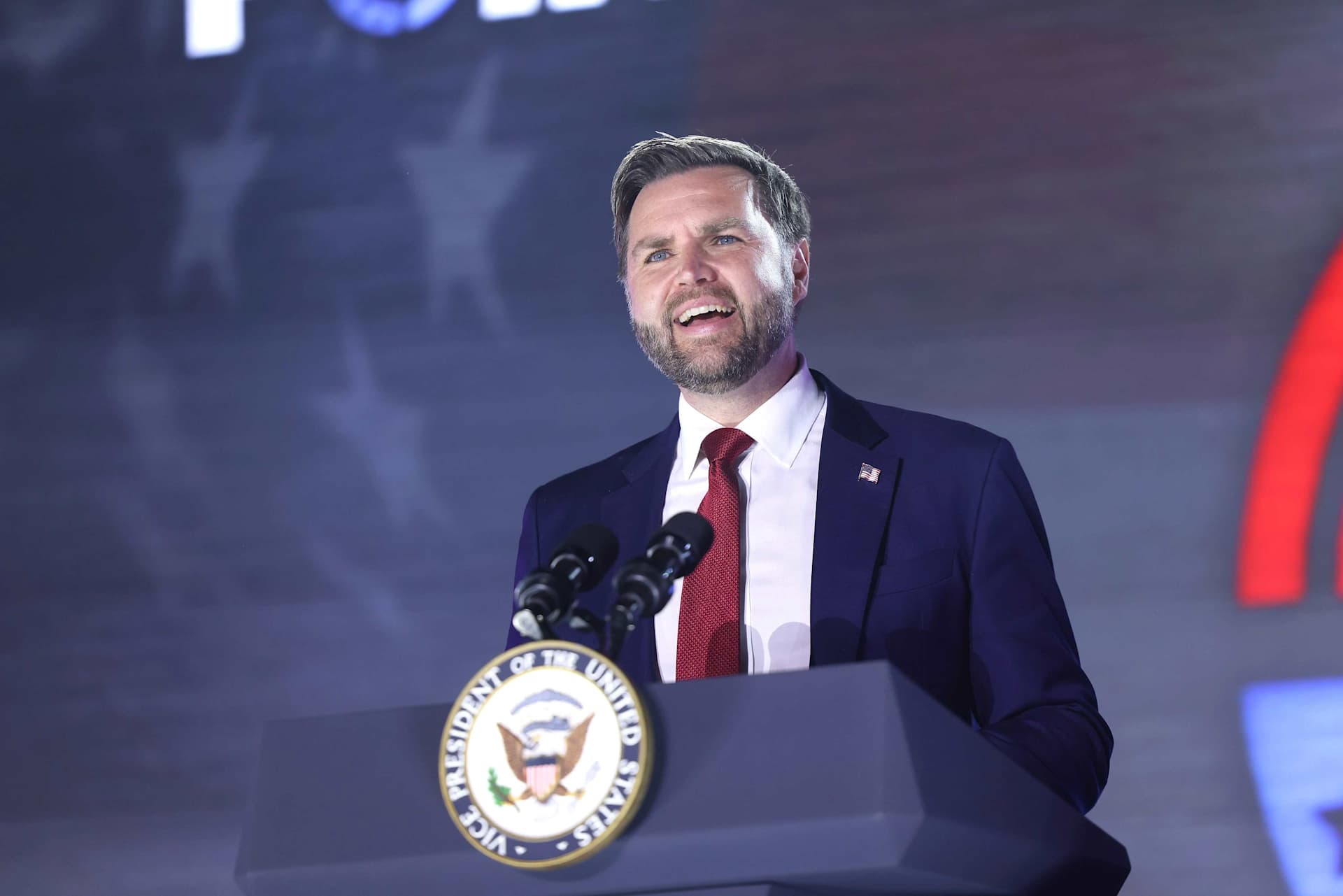

Jan 16, 2026 / 16:40 pm (CNA).
Vice President JD Vance is scheduled to speak at the 2026 March for Life Rally in Washington, D.C., on Jan. 23.
Vance, who is the nation’s second Catholic vice president, will join Republican House Speaker Mike Johnson and Rep. Chris Smith, R-New Jersey, among other speakers at the 53rd annual pro-life event, organizers said.
“Vice President Vance is grateful to the tens of thousands of Americans who travel to the National Mall each year to speak out in support of life and looks forward to joining them for the second consecutive year,” a spokesperson for the vice president told EWTN News.
Vance will be attending and speaking at the event for the second time as vice president. He spoke at the March for Life in 2025 where he delivered his first public remarks in the leadership position.
Addressing the crowd at the 2025 march, Vance said becoming a father helped to solidify his convictions that “an unborn life is worthy of protection.”
“You remind us that the March for Life is not a single event that takes place on a frigid January day,” he said to the crowd. “The March for Life is the work of the pro-life movement every day from this point forward,” he said.
“We will be back next year,” he said.
While President Donald Trump will not be attending the 2026 March for Life in person, he told EWTN News’ White House correspondent Owen Jensen on Jan. 16 he will address the crowd through a “beautiful” prerecorded message.
“And they’re going to play it,” he said. “And those are great people. I want to tell you they’re great people,” Trump said about attendees.
While the president will deliver the virtual message, the Trump administration is receiving backlash from pro-life activists following his claim that Republicans need to be “ flexible” with the Hyde Amendment and the reinstatement of funds to Planned Parenthood.
When asked about the Hyde Amendment, Trump said “you’re going to hear about it” in the message.
Vance is set to deliver his remarks at the pre-march rally at 11 a.m. on Jan. 23. The March for Life is scheduled to begin after the rally.
Read More

Jan 15, 2026 / 06:00 am (CNA).
The attorney general of Ohio is moving to shut down a nursing home after a congregation of Catholic nuns sold it, amid reports that the facility’s “shockingly poor care” is placing elderly residents in “clear and present danger.”
House of Loreto, a nursing facility formerly run by the sisters of the Congregation of the Divine Spirit, has allegedly committed “widespread care failures,” Attorney General Dave Yost’s office said in a Jan. 13 press release.
The sisters were involved with the home from 1957, when then-Youngstown Bishop Emmet Walsh asked for the religious to run the facility. The current facility opened in 1963.
The Youngstown Diocese said in March 2025 that the home had been acquired by Hari Group LLC, a company based out of Ohio. In its press release announcing the sale the diocese did not note any troubles experienced by House of Loreto at the time. A diocesan spokesman said on Jan. 15 that the home was no longer under Catholic control after the sale.
In a court order request filed on Jan. 12, Yost’s office said that state inspectors have observed a “rapid deterioration of care” at the facility, with the filing claiming that “shockingly poor care” was putting residents in “real and present danger.”
Among the problems alleged by inspectors include the lack of a director of nursing, leaving the facility “spinning out of control” with repeated resident falls, improper medicine administration, denial of pain medication, and other alleged mismanagement issues.
The facility is “so dysfunctional” that the government “lacks any confidence that the current leadership … will be able to right the ship,” the court filing says.
The attorney general’s office said it is trying to get the facility shut down and “relocate residents to safer facilities.”
In a statement to EWTN News, the Youngstown Diocese said it was “deeply saddened” at the imminent closure of the facility.
Youngstown Bishop David Bonnar in the statement said the sisters “poured their lives into creating a home where the elderly were cherished and protected.”
“Their ministry at the House of Loreto was a profound witness to the Gospel,” the prelate said. “It is painful to see their legacy overshadowed by the serious concerns that have emerged under the new ownership.”
The facility said it takes its name from the Holy House of Loreto in Italy, said to be the home at which the Annunciation occurred and the Word was made flesh.
The nursing home said it seeks to foster “an environment where seniors can experience the same love and respect they would find in their own homes —truly standing on the threshold of heaven as they navigate life’s later chapters.”
Correction: This story originally identified the House of Loreto as a "Catholic-run" facility based on information from the facility's website. The home is actually no longer under Catholic ownership. This story was updated on Thursday, Jan. 15, 2026 at 9:30 a.m. ET.
Read More

The New York–Newark–Jersey City Metropolitan Statistical Area, which spans 23 counties across New York, New Jersey, and Connecticut and has a population of about 19.9 million, is pictured at approximately 3:29 a.m. local time Dec. 20, 2025, from the International Space Station as it orbited 262 miles above the Atlantic coast.
Read More![Homeland Security Department says rule will address religious worker visa backlog #Catholic
Credit: Lisa F. Young/Shutterstock
Jan 14, 2026 / 10:25 am (CNA).
The Department of Homeland Security (DHS) said it is addressing a religious worker visa backlog with rules that will reduce wait times and disruptions in ministry for faith-based communities.“Under the leadership of Secretary [Kristi] Noem, DHS is committed to protecting and preserving freedom and expression of religion. We are taking the necessary steps to ensure religious organizations can continue delivering the services that Americans depend on,” a DHS spokesperson said in a press release Wednesday. “Pastors, priests, nuns, and rabbis are essential to the social and moral fabric of this country. We remain committed to finding ways to support and empower these organizations in their critical work.”Under the rule expected to be issued Jan. 14, religious workers in the country on R-1 visas would no longer be required to reside outside of the U.S. for a full year if they reach their statutory five-year maximum period of stay before completing their green card applications. “While R-1 religious workers are still required to depart the U.S., the rule establishes that there is no longer a minimum period of time they must reside and be physically present outside the U.S. before they seek readmission in R-1 status,” DHS said.DHS acknowledged the significant demand for visas within the EB-4 category “has exceeded the supply for many years,” citing 2023 changes implemented by President Joe Biden’s State Department. “By eliminating the one-year foreign residency requirement, USCIS [U.S. Citizenship and Immigration Services] is reducing the time religious organizations are left without their trusted clergy and non-ministerial religious workers,” according to a DHS statement.The rule, expected to be issued at 11 a.m. Jan. 14, is effective immediately, DHS said.Secretary of State Marco Rubio said in a press conference in December 2025 that the government would reveal its plan “early next month” for religious worker visas that would avoid giving preference to one denomination over another. Rubio noted that the plan would not favor one religion over another and that there would be “country-specific requirements depending on the country they’re coming from.” “I think we’re going to get to a good place,” Rubio said at the time. “We don’t have it ready yet. All this takes time to put together, but we’re moving quickly. I think we’ll have something positive about that at some point next month, hopefully in the early part of next month.”Visas for religious workers allow foreign nationals to work for a U.S. religious organization, through the temporary R-1 visa or a Green Card EB-4 visa, which requires at least two years of membership in the same denomination and a job offer from a qualifying nonprofit religious group.Rubio had also said in August the administration was working to create a “standalone process” for religious workers, separate from other competing applicants to the employment-based fourth preference (EB-4) category of visas that became severely backlogged after an unprecedented influx in unaccompanied minor applicants — most of which the USCIS has since alleged were fraudulent — who were added to the already-tight category under the Biden administration.In November 2025, a Catholic diocese in New Jersey dropped a lawsuit filed against the Biden administration’s State Department, Department of Homeland Security, and USCIS, citing knowledge of a solution with national implications.Since the issue of the backlogged visas started, multiple U.S. dioceses have called for a solution. Priests in the Archdiocese of Boston who are in the U.S. on visas were urged to avoid international travel amid the Trump administration’s immigration policies and deportations.Priests and other Church leaders have expressed fear of having to leave their ministries and return to their home countries, then endure lengthy wait times before coming back. Church officials have warned that a continuing backlog could lead to significant priest shortages in the United States.“We are grateful for the administration’s attention to this important issue for the Church and value the opportunity for ongoing dialogue to address these challenges so the faithful can have access to the sacraments and other essential ministries,” a spokesperson for the USCCB told CNA.](https://unitedyam.com/wp-content/uploads/2026/01/homeland-security-department-says-rule-will-address-religious-worker-visa-backlog-catholic-credit-lisa-f-young-shutterstockjan-14-2026-1025-am-cna-the-department-of-homeland-security.jpg)

Jan 14, 2026 / 10:25 am (CNA).
The Department of Homeland Security (DHS) said it is addressing a religious worker visa backlog with rules that will reduce wait times and disruptions in ministry for faith-based communities.
“Under the leadership of Secretary [Kristi] Noem, DHS is committed to protecting and preserving freedom and expression of religion. We are taking the necessary steps to ensure religious organizations can continue delivering the services that Americans depend on,” a DHS spokesperson said in a press release Wednesday. “Pastors, priests, nuns, and rabbis are essential to the social and moral fabric of this country. We remain committed to finding ways to support and empower these organizations in their critical work.”
Under the rule expected to be issued Jan. 14, religious workers in the country on R-1 visas would no longer be required to reside outside of the U.S. for a full year if they reach their statutory five-year maximum period of stay before completing their green card applications.
“While R-1 religious workers are still required to depart the U.S., the rule establishes that there is no longer a minimum period of time they must reside and be physically present outside the U.S. before they seek readmission in R-1 status,” DHS said.
DHS acknowledged the significant demand for visas within the EB-4 category “has exceeded the supply for many years,” citing 2023 changes implemented by President Joe Biden’s State Department. “By eliminating the one-year foreign residency requirement, USCIS [U.S. Citizenship and Immigration Services] is reducing the time religious organizations are left without their trusted clergy and non-ministerial religious workers,” according to a DHS statement.
The rule, expected to be issued at 11 a.m. Jan. 14, is effective immediately, DHS said.
Secretary of State Marco Rubio said in a press conference in December 2025 that the government would reveal its plan “early next month” for religious worker visas that would avoid giving preference to one denomination over another. Rubio noted that the plan would not favor one religion over another and that there would be “country-specific requirements depending on the country they’re coming from.”
“I think we’re going to get to a good place,” Rubio said at the time. “We don’t have it ready yet. All this takes time to put together, but we’re moving quickly. I think we’ll have something positive about that at some point next month, hopefully in the early part of next month.”
Visas for religious workers allow foreign nationals to work for a U.S. religious organization, through the temporary R-1 visa or a Green Card EB-4 visa, which requires at least two years of membership in the same denomination and a job offer from a qualifying nonprofit religious group.
Rubio had also said in August the administration was working to create a “standalone process” for religious workers, separate from other competing applicants to the employment-based fourth preference (EB-4) category of visas that became severely backlogged after an unprecedented influx in unaccompanied minor applicants — most of which the USCIS has since alleged were fraudulent — who were added to the already-tight category under the Biden administration.
In November 2025, a Catholic diocese in New Jersey dropped a lawsuit filed against the Biden administration’s State Department, Department of Homeland Security, and USCIS, citing knowledge of a solution with national implications.
Since the issue of the backlogged visas started, multiple U.S. dioceses have called for a solution. Priests in the Archdiocese of Boston who are in the U.S. on visas were urged to avoid international travel amid the Trump administration’s immigration policies and deportations.
Priests and other Church leaders have expressed fear of having to leave their ministries and return to their home countries, then endure lengthy wait times before coming back. Church officials have warned that a continuing backlog could lead to significant priest shortages in the United States.
“We are grateful for the administration’s attention to this important issue for the Church and value the opportunity for ongoing dialogue to address these challenges so the faithful can have access to the sacraments and other essential ministries,” a spokesperson for the USCCB told CNA.
Read More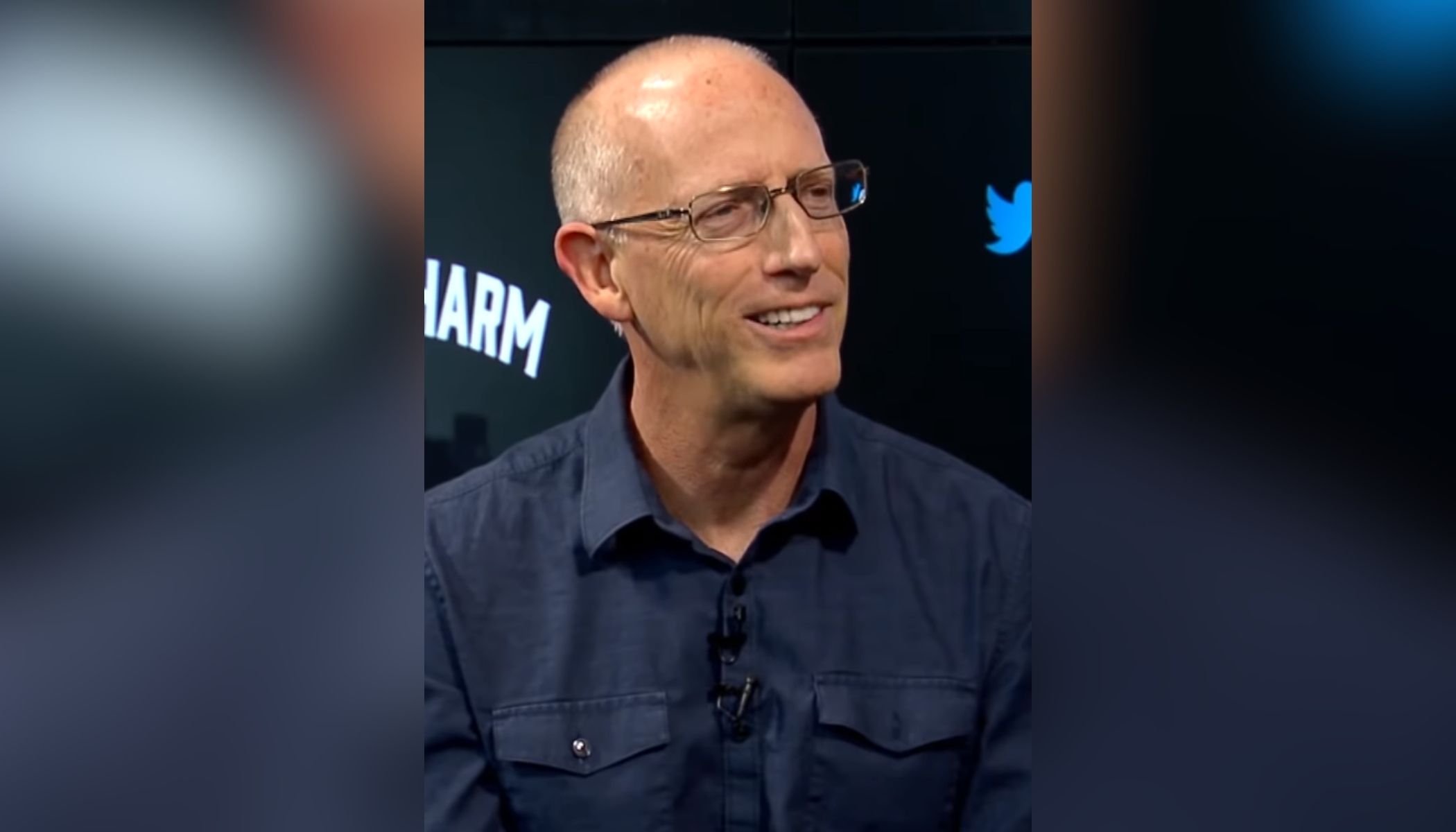

Jan 13, 2026 / 15:36 pm (CNA).
Scott Adams, the creator of the long-running “Dilbert” comic strip whose art satirized the typical American workplace, died on Jan. 13 at 68 years old after a battle with cancer.
Adams, who became known later in his career for espousing conservative and at times controversial political views, revealed in May 2025 that he was suffering from prostate cancer. The disease spread in the coming months, with Adams passing away after a short stay in hospice.
On Jan. 13, shortly after his death, Adams’ X account posted a “final message” from the renowned cartoonist in which he recalled that many of his Christian friends had urged him to convert to Christianity.
A Final Message From Scott Adams pic.twitter.com/QKX6b0MFZA
— Scott Adams (@ScottAdamsSays) January 13, 2026
“I accept Jesus Christ as my lord and savior, and I look forward to spending an eternity with him,” Adams declared in the message, adding that he hoped he was “still qualified for entry” into heaven upon his death.
“I had an amazing life. I gave it everything I had,” he wrote in the statement. “If you got any benefits from my work, I’m asking you to pay it forward as best you can. That is the legacy I want.”
Adams had previously announced his intent to convert on Jan. 1, admitting that “any skepticism I have about reality would certainly be instantly answered if I wake up in heaven.”
Born June 8, 1957, in Windham, New York, Adams began drawing from a young age. His work at the Pacific Bell Telephone Company in the 1980s and 1990s inspired many of the humorous office stereotypes portrayed in “Dilbert.”
A send-up of many of the tropes that continue to define U.S. office work, “Dilbert” became wildly popular into the 2000s and eventually included a brief television series.
Later in his career he launched the video talk series “Real Coffee With Scott Adams,” which he continued until just several days before his death.
In his final message released after his death, Adams told his fans: “Be useful.”
“And please know,” he added, “I loved you all to the end.”
Read More

Jan 12, 2026 / 06:00 am (CNA).
Catholic medical professionals and ethicists had mixed reactions to the Centers for Disease Control and Prevention’s (CDC) announcement last week that it has revised the recommended childhood and adolescent vaccine schedule.
In a press release on Jan. 5, the CDC announced a revised recommended childhood immunization schedule, which reduces the number of universally recommended vaccines from 18 to 11. It retains routine recommendations for all children against measles, mumps, rubella, polio, pertussis, tetanus, diphtheria, Haemophilus influenzae type b, pneumococcal disease, human papillomavirus (HPV), and varicella (chickenpox).
Vaccines for rotavirus, influenza, COVID-19, hepatitis A, hepatitis B, meningococcal disease, and RSV now shift to recommendations for high-risk groups or after “shared clinical decision-making” between providers and families.
According to a Department of Health and Human Services (HHS) memo, the CDC “applies shared clinical decision-making recommendations when evidence indicates that individuals may benefit from vaccination based on an analysis of the individual’s characteristics, values, and preferences, the provider’s medical judgment, and the characteristics of the vaccine being considered.”
Insurance companies must continue to cover all vaccines.
The changes come after President Donald Trump directed the heads of the CDC and HHS in December 2025 to “review best practices from peer, developed nations regarding childhood vaccination recommendations and the scientific evidence underlying those practices” and to make changes accordingly.
After reviewing the vaccination practices of 20 peer nations, a scientific assessment found that “the U.S. is a global outlier among developed nations in both the number of diseases addressed in its routine childhood vaccination schedule and the total number of recommended doses but does not have higher vaccination rates than such countries.”
“Science demands continuous evaluation,” Dr. Jay Bhattacharya, director of the National Institutes of Health (NIH), said in the CDC press release. “This decision commits NIH, CDC, and the Food and Drug Administration (FDA) to gold standard science, greater transparency, and ongoing reassessment as new data emerge.”
Dr. Tim Millea, chair of the health care policy committee at the Catholic Medical Association (CMA), welcomed the changes, telling CNA that he thought the CDC approached the revisions “in a very logical way.”
“There has been a huge drop in trust surrounding vaccines since the COVID-19 pandemic,” Millea said. “The suggestions during COVID that the science was ‘settled’ rubbed a lot of us the wrong way.”
“The loudest critics of these new recommendations say this is ideology over science,” he said. “Science is a process, not an end. If we need more evidence, let’s get it,” he said, pointing out Bhattacharya’s call for “gold standard” science and “ongoing reassessment.”
Millea, a retired orthopedic surgeon, said he has confidence that Bhattacharya and Dr. Marty Makary, head of the FDA, are “not going to let ideology get ahead of science.”
The president of the National Catholic Bioethics Center (NCBC), John Di Camillo, told CNA in a statement regarding the updated immunization recommendations: “The people look to public health authorities precisely for this kind of guidance, which is responsive to continually evolving research, ongoing discussions among professionals in the medical field, and ethical principles that promote the common good, respect the dignity of the human person, and limit the interference of financial and ideological conflicts.”
Millea acknowledged that critics of the CDC’s revised recommendations say comparing the U.S. vaccine schedule to that of much smaller, more homogeneous nations such as Denmark is like “comparing apples to oranges.”
However, he pointed out that the CDC’s revised schedule is simply a recommendation, and each of the 50 U.S. states is free to do what it deems best. “It’s like 50 laboratories. Let’s see what works the best.”
Invoking the Catholic principle of subsidiarity, Millea said “let those closest to the children who are getting the vaccinations make the decisions.”
“One of the positive aspects of the pandemic is that now we can take a step back and we’re questioning, not because something may be wrong, but maybe because it could be improved upon,” Millea said.
John F. Brehany, executive vice president and director of Institutional Relations at the NCBC, told CNA that “the new schedule appears to have been designed with good intent; that is, … to have gained public trust in the absence of mandates and to have contributed to population health outcomes that meet or exceed those of the U.S.”
“The new schedule does not take a ‘one size fits all’ approach but rather structures recommendations based on the nature of the diseases, vaccines in question, and characteristics of the children or patients who may receive them,” he continued. “This approach appears to be well-founded and to provide a sound foundation for respecting the dignity and rights of every unique human person.”
Dr. Gwyneth Spaeder, a Catholic pediatrician in North Carolina, did not welcome the changes to the immunization schedule.
While she acknowledged that the damage to trust in institutions was substantial after the COVID-19 pandemic, she thinks the issues surrounding the COVID-19 vaccine’s safety and efficacy “cannot be compared” with the decades of studies demonstrating the safety of common children’s immunizations.
“It is not the same moral calculus,” she said.
She does not believe revising the immunization schedule this way will restore trust in institutions, which she said might take “years or even generations” to rebuild.
This method will “sow more confusion,” Spaeder said. “Instead of trying to rebuild trust in transparent, evidence-based practices, we have created a situation where everyone is told different things … For this child, we think this schedule is the best, for that child, there’s a different one. That’s not how public health works.”
She also said that comparing the homogeneous, relatively tiny population of 6 million in Denmark to that of the diverse population of 340 million in the U.S. is “a false comparison.”
“Their children are at less risk from falling through the cracks and contracting these diseases we try to vaccinate against,” she said, noting the protective public health effects of Denmark’s universal health care and generous parental leave policies.
“The children who will be most harmed in the U.S. are the underserved,” Spaeder said. “That’s being lost in this conversation. We can have a lot of high-level political arguments, but I am most concerned about my patients from single-parent homes who attend day care from young ages, or who are born to mothers who don’t have adequate prenatal care.”
“They will lose out the most from not being protected from these diseases.”
Read More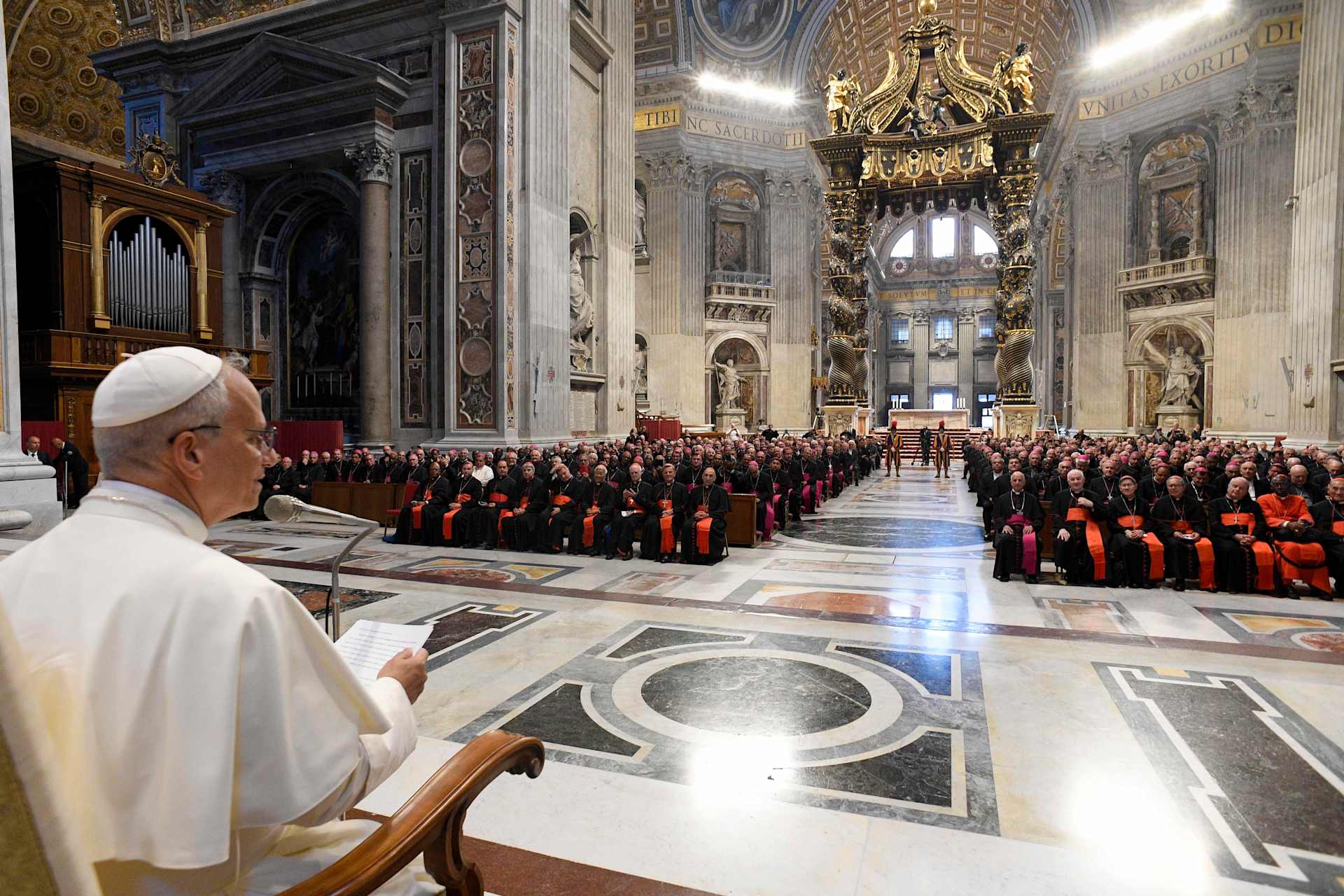

Jan 11, 2026 / 06:00 am (CNA).
Soon after the election of Pope Leo XIV, Cardinal Luis Antonio Tagle shared in a press conference that moments before then-Cardinal Robert Prevost was chosen to be pontiff, Tagle noticed the emotion by the soon-to-be-pope as it was becoming more clear he would be elected, so he reached into his pocket and offered Prevost a piece of candy.
It was this simple moment that inspired Lauren Winter, founder of the Catholic company Brick House in the City, to start the Adopt a Bishop initiative.
“It really reminded me that these are all human beings who made the choice one day to accept a very serious ‘yes,’” Winter told CNA in an interview.
The Adopt a Bishop initiative, which has been launched in collaboration with The Dorothea Project, invites the faithful to adopt a bishop for the year and pray for that bishop throughout the year.
“I think our bishops carry an enormous and often invisible spiritual weight,” she said. “They carry a responsibility that most of us never see — it’s pastoral and spiritual and it’s deeply personal and they’re holding entire dioceses in their prayer. And I think that kind of weight requires spiritual support.”
This is the first year of the initiative and over 1,000 people have already signed up to adopt a bishop in prayer. When an individual signs up on the website that person is randomly assigned a bishop from anywhere in the world.
Winter explained that she decided to use a random generator in order to “remove preference.”
“I didn’t want anyone to choose a bishop that they already knew and admired and I wanted to leave that room for the Holy Spirit,” she said. “And it may be a bishop you are already familiar with. It may be a bishop that is someone that you have disagreed with. But the call to prayer is still there and I think receiving a bishop instead of choosing one, that felt more like a posture of reception, which I feel like it’s more aligned with how grace works in the Church — just leaving the room there for the Spirit to work.”
The Catholic business owner highlighted the importance spiritual adoption plays in the Church in that it reminds us that “we are also being prayed for, it strengthens the bonds within the Church, and then I feel like it helps us to live more intentionally as one body of Christ.”
Winter said she hopes that through this initiative “people feel more connected to their bishop, to the Church, to the quiet work of prayer, and how a small faithful commitment can really shape our faith.”
“I imagine many people when they meet a bishop, they ask the good bishop to pray for them and I think it’s really beautiful that we can return that — the reciprocity of prayer. I think they need our prayers too.”
Read More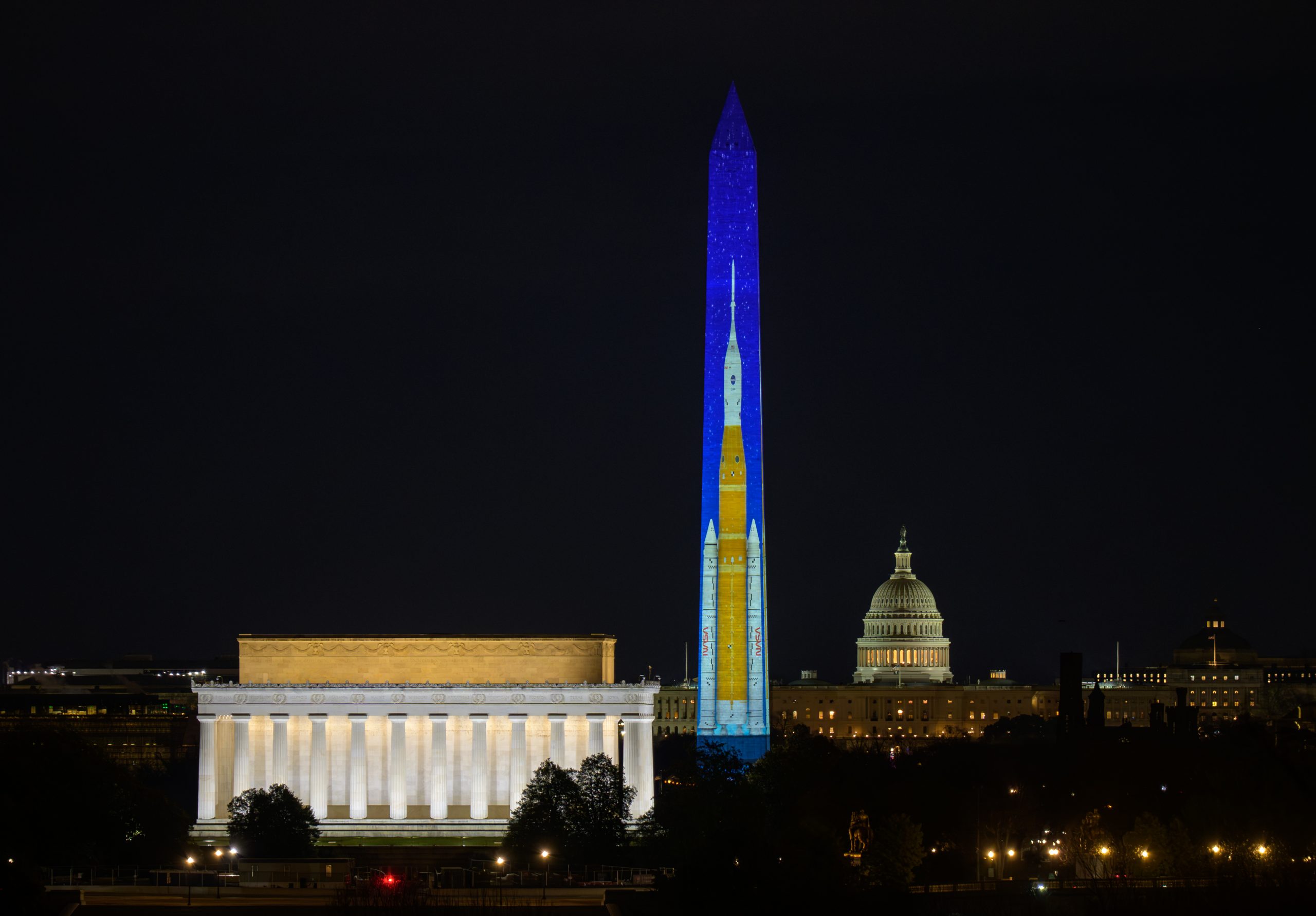
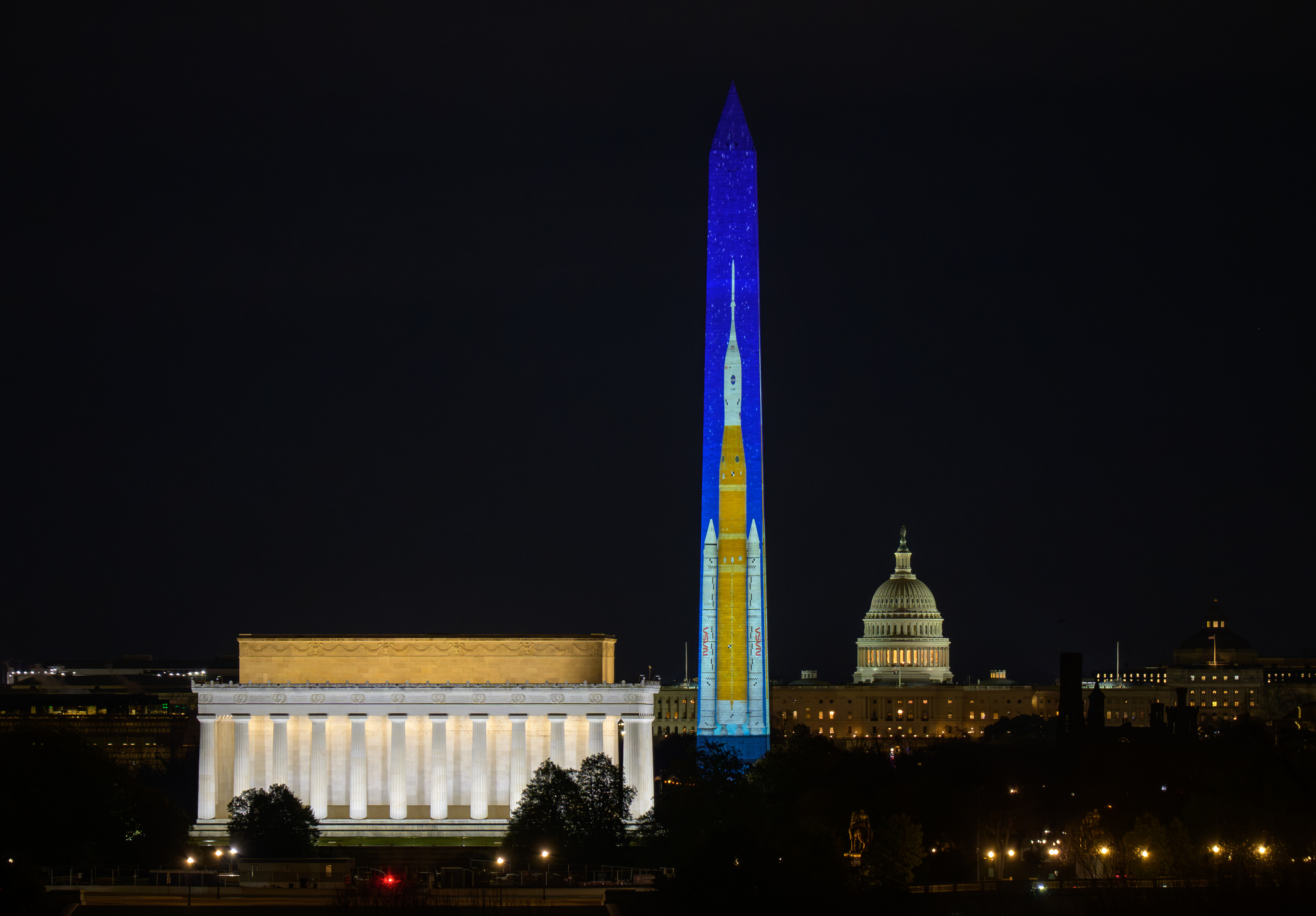
Images depicting NASA’s Space Launch System (SLS) rocket are projected onto the Washington Monument as part of an event to kick off the nation’s 250th birthday year, Wednesday, Dec. 31, 2025, in Washington.
Read More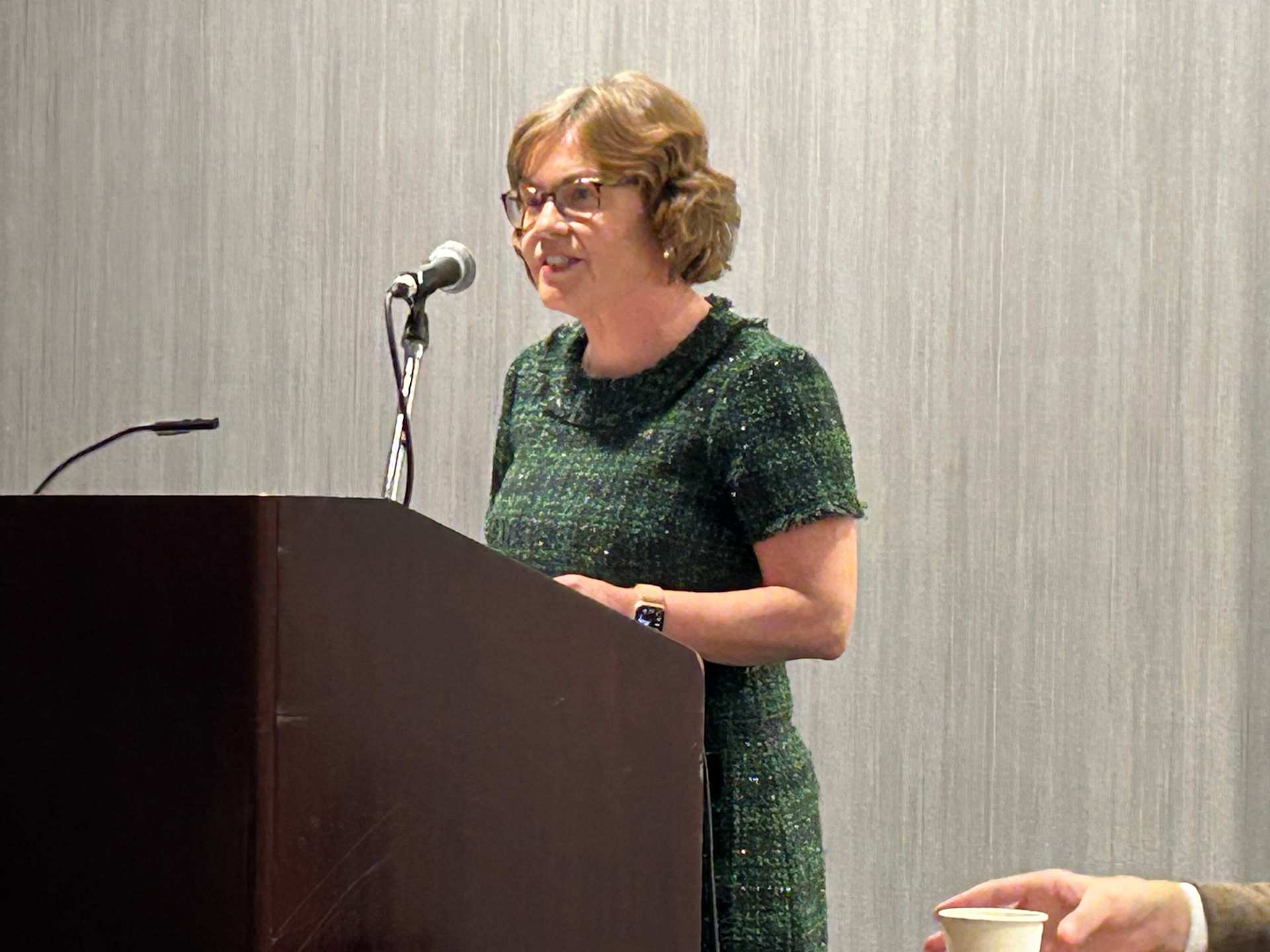

Jan 10, 2026 / 10:12 am (CNA).
Assessing the impact of the Catholic Church's first American pope was front and center at the 106th annual meeting of the American Catholic Historical Association (ACHA), which met in Pope Leo XIV's hometown of Chicago from Jan. 8-11.
During a panel on the subject, Catholic scholars noted some of the historic caricatures of what an American papacy would be like and compared that to the first eight months of Leo's actual papacy.
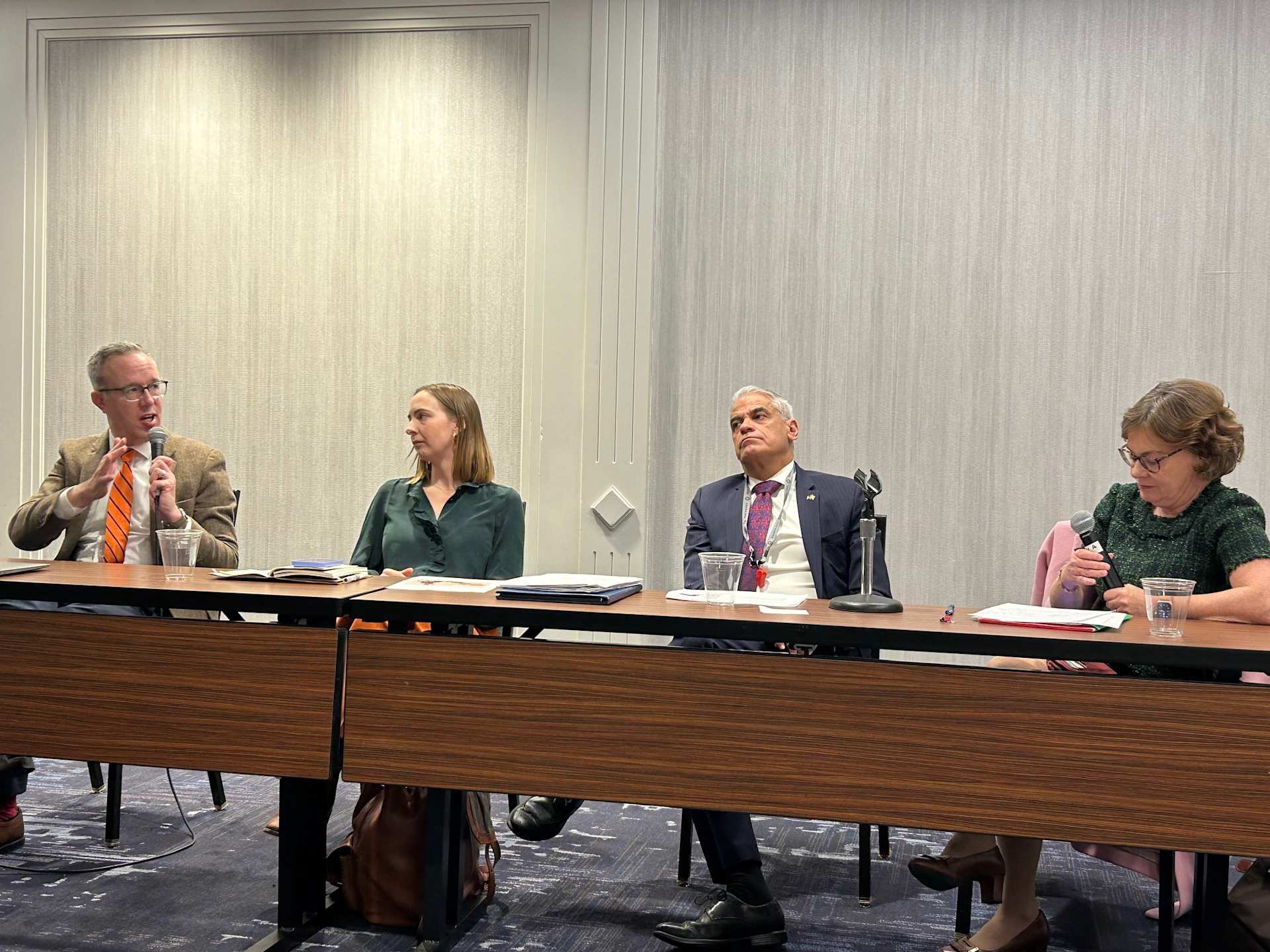
At the outset of the panel, University of Notre Dame history professor Kathleen Sprows Cummings referenced the 1894 Puck magazine cartoon titled “ The American Pope,” which depicts the first apostolic delegate to the United States, Cardinal Francesco Satolli, sitting atop a church labeled the “American headquarters” and casting a shadow of then Pope Leo XIII over the entire country.
Sprows Cummings noted the cartoon illustrates “fears about papal intervention in the United States” at a time when the country was receiving waves of Catholic immigrants from countries such as Ireland and Italy.
As Catholics became more settled in American society in the subsequent decades, she said some of those prejudices began to lessen and pointed to the 1918 election of Catholic Democrat Al Smith as New York’s governor. By this point, Catholics had become “much more confident about their place in American culture.”
During the same early 20th century period, the United States also began to rise as a superpower. Sprows Cummings noted that predominant concerns about an American pope shifted to Vatican concerns over the “Americanization of the Catholic Church.”
America magazine's Vatican correspondent, Colleen Dulle, said some of those concerns were evidently mitigated in the person of then Cardinal Robert Prevost, whose service to the Church included many years as a missionary and bishop in Peru as well as in Rome as the head of a global religious order, the Augustinians.
Sprows Cummings said the College of Cardinals clearly saw in Cardinal Prevost the "pastoral presence, administrative savvy and global vision" that the Church needed at this time and that he was “not elected in some flex of American power.”
Miguel Diaz, the John Courtney Murray, S.J. Chair in Public Service at Loyola University Chicago, noted that some of Leo’s actions have actually amounted to the opposite of flexing American power, such as his focus on the dignity of migrants, which he contrasted to the policies of the Trump administration.
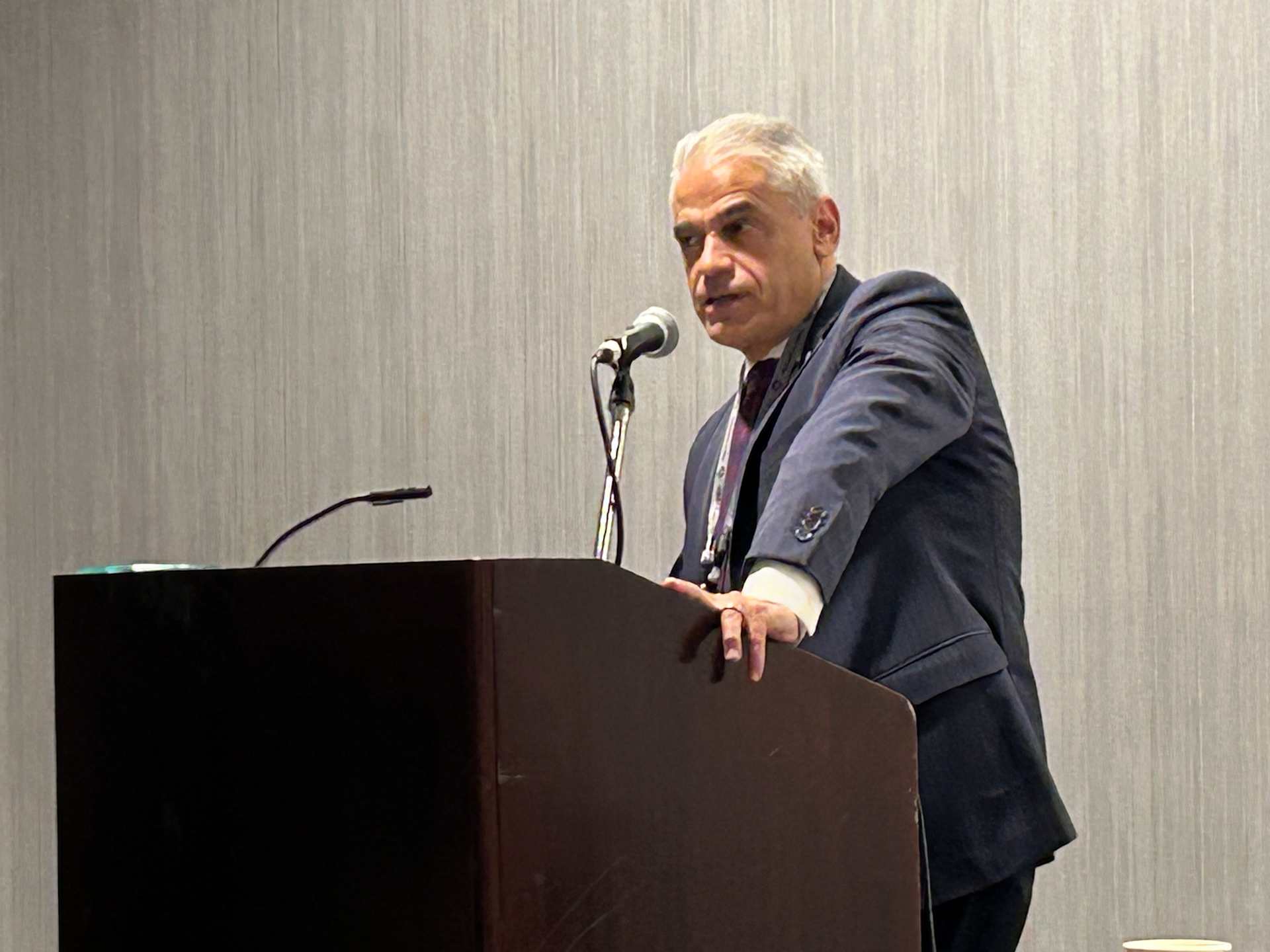
Diaz, who served as U.S. ambassador to the Holy See under former President Barack Obama, said Leo is “a different symbol, from America first to America cares.”
He emphasized that having an American pope is significant amid the country’s political debates because “he can say things and he will be listened to.”
The panelists also discussed what Leo’s papacy may look like moving forward, with Dulle noting that only this year are there clear signs of him charting his own programmatic course, as the events and itinerary of the 2025 Jubilee were primarily developed for Pope Francis.
Up until now, she said, he has been mostly “continuing the Francis initiatives in a different style.”
She noted Pope Leo's management of this week's consistory — a meeting between the pope and the College of Cardinals — where the pontiff gave them four topics to choose from, which were all in line with Francis’s priorities: synodality, evangelization, reform of the curia, and the liturgy. The cardinals chose synodality and evangelization.
Dulle said Leo is seen as "a consensus builder” who aims to build consensus around the Church's priorities. She noted Pope Leo's announcement this week of a regular schedule of consistories, with the next one set for this June. This approach is emerging as a "hallmark of how he governs the Church" Dulle said.
Brian Flanagan, the John Cardinal Cody Chair of Catholic Theology at Loyola University Chicago, also emphasized Leo’s strong appeal to the cardinals and bishops in efforts to reach consensus, in keeping with the Pope's role as a preserver of unity.
Flanagan said he sees Leo exercising the papacy as not so much "at the top of the pyramid, but as at the center of conversation.” He said this is likely influenced by Leo's past as leader of a religious order — the Order of Saint Augustine — rather than a diocese because the orders are “global, diverse, and somewhat fractious.”
“You can’t govern a global religious community without getting people on board,” he said.
Read More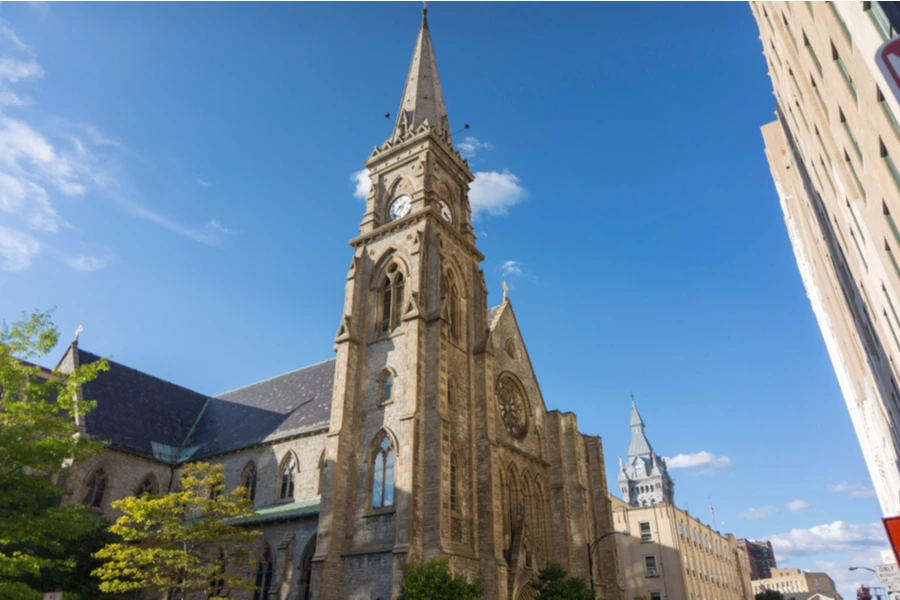

Jan 10, 2026 / 06:00 am (CNA).
Catholics in the U.S. were witness to a rare Church decision in 2023 when Pope Francis elevated the Diocese of Las Vegas to a metropolitan archdiocese. Las Vegas had previously been a suffragan diocese of San Francisco, having been created by Pope John Paul II in 1995.
A suffragan diocese operates within an ecclesiastical province subordinate to a larger archdiocese and is led by a suffragan bishop who has the authority to lead his own diocese but works under the metropolitan archbishop.
In September 2025, Pope Leo XIV created a new Catholic diocese in northern China; though it goes by the same name as one established decades ago by Beijing without Vatican approval — a product of ongoing tensions between China and the Holy See — the move demonstrated the Holy See’s authority in creating local Church jurisdictions.
Outside of one’s own parish, a diocese or archdiocese is arguably the average Catholic’s most common point of interaction with the Church. These jurisdictions manage local Church life and administration, with bishops and archbishops offering both spiritual and temporal guidance and authority to Catholics under their care.
But how does the Catholic Church decide what becomes a diocese or an archdiocese? What are the roots of this ancient practice, and how does it function today?
Monsignor William King, JCD, KCHS, an assistant professor at the school of canon law at The Catholic University of America, told CNA that the right to erect (or suppress) a diocese “belongs exclusively to the successor of Peter, the bishop of Rome,” that is, the pope.
“Historically, secular rulers have intruded into the process and the autonomy of the Church in this action has been hard-won,” he said, pointing out that “even today in certain parts of the world, secular or civil rulers wish to have input into matters such as this.”
The pope never makes decisions regarding dioceses and archdioceses “without considerable study and consultation,” King said.
The history of diocesan administration stretches back to the earliest years of the Church, he said. In those days a diocese consisted of “a city larger than the surrounding cities and towns,” often a place of commerce or a center of government.
Throughout the centuries, including after the imperial legalization of the Church by Constantine, Church leaders refined the diocesan structure of “pastoral ministry and governance” in order to facilitate “communication and decision-making” throughout Christendom.
“This became increasingly important as the Church grew and encountered different systems of law, philosophy, and religious practice,” King said. Roman models of government structure proved useful and sufficient for Church governance; King noted that the Church structure even today more closely resembles a government than a corporation.
The process by determining which jurisdictions counted as archdioceses likely arose in earlier centuries organically, King said, with Church leaders identifying major centers of “culture, education, commerce, government, and transportation” as particularly significant jurisdictions.
The procedure for elevating a diocese to an archdiocese, meanwhile — as Pope Francis did to Las Vegas in 2023 — requires “significant study, discussion, and decision-making,” King said.
The Holy See conducts such reviews in part through a diocese’s “quinquennial report,” a detailed rundown of the diocese’s activities and administration. Such a report may indicate to the Holy See that a particular region is growing and could benefit from elevation to an archdiocese.
Local suffragan bishops will participate in discussions to that effect, King said, and the Roman Curia will work with bishops’ conferences as well as the local apostolic nuncio.
“The ultimate decision is that of the Roman pontiff, the bishop of Rome,” King said, “but is always done with his awareness of the conversations and consultations already conducted at every level.”
The priest pointed out that not every local jurisdiction of the Church is a diocese or archdiocese. At times, he said, the pope may establish a less common ecclesiastical administration “for a variety of reasons that relate to culture, legal acceptance or opposition, small numbers, and the like.”
Such jurisdictions include apostolic prefectures, apostolic vicariates, ordinariates, and other designations. Such areas may be governed by a bishop or a priest named by the pope, King said.
Read More

Artemis II crewmembers (left to right) NASA astronauts Christina Koch, mission specialist; and Victor Glover, pilot; CSA (Canadian Space Agency) astronaut Jeremy Hansen, mission specialist; and NASA astronaut Reid Wiseman, commander are led to the crew access arm as they prepare to board their Orion spacecraft atop NASA’s Space Launch System rocket during the Artemis II countdown demonstration test on Dec. 20, 2025.
Read More

NASA’s SPHEREx Observatory has mapped the entire sky in 102 infrared colors, as seen here in this image released on Dec. 18, 2025. This image features a selection of colors emitted primarily by stars (blue, green, and white), hot hydrogen gas (blue), and cosmic dust (red).
Read More![Trump urges Republican ‘flexibility’ on taxpayer-funded abortions #Catholic
President Donald Trump talks to Republicans about their stance on the Hyde Amendment on Jan. 6, 2026. | Credit: Mandel NGAN/AFP via Getty Images
Jan 6, 2026 / 18:10 pm (CNA).
President Donald Trump is asking congressional Republicans to be more flexible on taxpayer funding for abortions as lawmakers continue to negotiate an extension to health care subsidies related to the Affordable Care Act, also known as Obamacare.Some federal subsidies that lowered premiums for those enrolled in the Affordable Care Act expired in December. The Kaiser Family Foundation estimates that the average increase to premiums for people who lost the subsidies will be about 114%, from $888 in 2025 to $1,904 in 2026. The exact costs will be different, depending on specific plans.Trump has encouraged his party to work on extending those subsidies and is asking them to be “flexible” on a provision that could affect tax-funded abortion. Democrats have proposed ending the restrictions of the Hyde Amendment, which bans direct federal funding for abortions in most cases.“Let the money go directly to the people,” Trump said at the House Republican Conference retreat at the John F. Kennedy Center for the Performing Arts on Jan. 6.“Now you have to be a little flexible on Hyde,” the president said. “You know that you got to be a little flexible. You got to work something [out]. You got to use ingenuity. You got to work. We’re all big fans of everything, but you got to be flexible. You have to have flexibility.”The Hyde Amendment began as a bipartisan provision in funding bills that prohibited the use of federal funds for more than 45 years. Lawmakers have reauthorized the prohibition every year since it was first introduced in 1976.A study from the Charlotte Lozier Institute estimates that the Hyde Amendment has saved more than 2.6 million lives. According to a poll conducted by the Marist Institute for Public Opinion, which was commissioned by the Knights of Columbus, nearly 6 in 10 Americans oppose tax funding for abortions.However, in recent years, many Democratic politicians have tried to keep the rule out of spending bills. Former President Joe Biden abandoned the Hyde Amendment in budget proposals, but it was ultimately included in the final compromise versions that became law.Marjorie Dannenfelser, president of Susan B. Anthony Pro-Life America, criticized Trump for urging flexibility on the provision, calling its support “an unshakeable bedrock principle and a minimum standard in the Republican Party.”Dannenfelser said Republicans “are sure to lose this November” if they abandon Hyde: “The voters sent a [Republican] trifecta to Washington and they expect it to govern like one.”“Giving in to Democrat demands that our tax dollars are used to fund plans that cover abortion on demand until birth would be a massive betrayal,” she said.Dannenfelser also noted that, before these comments, Trump has consistently supported the Hyde Amendment. The president issued an executive order in January on enforcing the Hyde Amendment that accused Biden’s administration of disregarding this “commonsense policy.”“For nearly five decades, the Congress has annually enacted the Hyde Amendment and similar laws that prevent federal funding of elective abortion, reflecting a long-standing consensus that American taxpayers should not be forced to pay for that practice,” the executive order reads.“It is the policy of the United States, consistent with the Hyde Amendment, to end the forced use of federal taxpayer dollars to fund or promote elective abortion,” it adds.](https://unitedyam.com/wp-content/uploads/2026/01/trump-urges-republican-flexibility-on-taxpayer-funded-abortions-catholic-president-donald-trump-talks-to-republicans-about-their-stance-on-the-hyde-amendment-on-jan-6-2026.jpg)

Jan 6, 2026 / 18:10 pm (CNA).
President Donald Trump is asking congressional Republicans to be more flexible on taxpayer funding for abortions as lawmakers continue to negotiate an extension to health care subsidies related to the Affordable Care Act, also known as Obamacare.
Some federal subsidies that lowered premiums for those enrolled in the Affordable Care Act expired in December.
The Kaiser Family Foundation estimates that the average increase to premiums for people who lost the subsidies will be about 114%, from $888 in 2025 to $1,904 in 2026. The exact costs will be different, depending on specific plans.
Trump has encouraged his party to work on extending those subsidies and is asking them to be “flexible” on a provision that could affect tax-funded abortion. Democrats have proposed ending the restrictions of the Hyde Amendment, which bans direct federal funding for abortions in most cases.
“Let the money go directly to the people,” Trump said at the House Republican Conference retreat at the John F. Kennedy Center for the Performing Arts on Jan. 6.
“Now you have to be a little flexible on Hyde,” the president said. “You know that you got to be a little flexible. You got to work something [out]. You got to use ingenuity. You got to work. We’re all big fans of everything, but you got to be flexible. You have to have flexibility.”
The Hyde Amendment began as a bipartisan provision in funding bills that prohibited the use of federal funds for more than 45 years. Lawmakers have reauthorized the prohibition every year since it was first introduced in 1976.
A study from the Charlotte Lozier Institute estimates that the Hyde Amendment has saved more than 2.6 million lives. According to a poll conducted by the Marist Institute for Public Opinion, which was commissioned by the Knights of Columbus, nearly 6 in 10 Americans oppose tax funding for abortions.
However, in recent years, many Democratic politicians have tried to keep the rule out of spending bills. Former President Joe Biden abandoned the Hyde Amendment in budget proposals, but it was ultimately included in the final compromise versions that became law.
Marjorie Dannenfelser, president of Susan B. Anthony Pro-Life America, criticized Trump for urging flexibility on the provision, calling its support “an unshakeable bedrock principle and a minimum standard in the Republican Party.”
Dannenfelser said Republicans “are sure to lose this November” if they abandon Hyde: “The voters sent a [Republican] trifecta to Washington and they expect it to govern like one.”
“Giving in to Democrat demands that our tax dollars are used to fund plans that cover abortion on demand until birth would be a massive betrayal,” she said.
Dannenfelser also noted that, before these comments, Trump has consistently supported the Hyde Amendment. The president issued an executive order in January on enforcing the Hyde Amendment that accused Biden’s administration of disregarding this “commonsense policy.”
“For nearly five decades, the Congress has annually enacted the Hyde Amendment and similar laws that prevent federal funding of elective abortion, reflecting a long-standing consensus that American taxpayers should not be forced to pay for that practice,” the executive order reads.
“It is the policy of the United States, consistent with the Hyde Amendment, to end the forced use of federal taxpayer dollars to fund or promote elective abortion,” it adds.
Read More

Jan 5, 2026 / 18:32 pm (CNA).
The Archdiocese of New Orleans released a letter written to child sexual abuse claimants apologizing for the “inexcusable harm” they suffered.
“On behalf of the clergy, religious, and laity of the Archdiocese of New Orleans,” Archbishop Gregory Aymond of New Orleans expressed in the Dec. 26, 2025, letter his “profound regret over the tragic and inexcusable harm” child abuse survivors suffered.
The letter was made public on Jan. 4 and emphasized that the Archdiocese of New Orleans “takes responsibility for the abuse.” Aymond said the archdiocese “pledges to keep children and all vulnerable people safe in our ministry.”
“I sincerely apologize to you for the trauma caused to you and to those close to you as a survivor of sexual abuse perpetrated by a member of the clergy, a religious sister or brother, or a lay employee or volunteer working within the Catholic Church,” Aymond said.
“I am ashamed that you or anyone should have been sexually abused by someone working within the Catholic Church. Sexual abuse is an inexcusable evil, and I am ashamed that you or anyone should have been sexually abused by someone working within the Catholic Church.”
“Please know that you are not to blame for the abuse perpetrated on you,” Aymond said. “You were and are completely innocent and did nothing to deserve the pain you have suffered because of the hideous crime of sexual abuse of a minor.”
The public release of the letter is a part of an “extensive media outreach” to express the Archdiocese of New Orleans’ “commitment to the nonmonetary provisions laid out in its Chapter 11 settlement plan,” according to the Clarion Herald, the official newspaper of the archdiocese.
The letter follows the October 2025 approval for a $230 million bankruptcy settlement to pay out over 650 victims after five years of litigation.
The Chapter 11 case filed in 2020 highlights a number of procedures in its nonmonetary provisions “to foster child protection and prevent child sexual abuse.” Within its “recognition” section, the document calls for individual apology letters and a public apology letter.
“It is my fervent hope that as we bring these Chapter 11 proceedings to a close, you will achieve some sense of peace, justice, and healing,” Aymond wrote in the letter. “I hold you and all survivors of abuse in prayer daily and encourage all to join me in prayer for you.”
The letter will be shared through multiple media outlets over the upcoming days and weeks.
Read More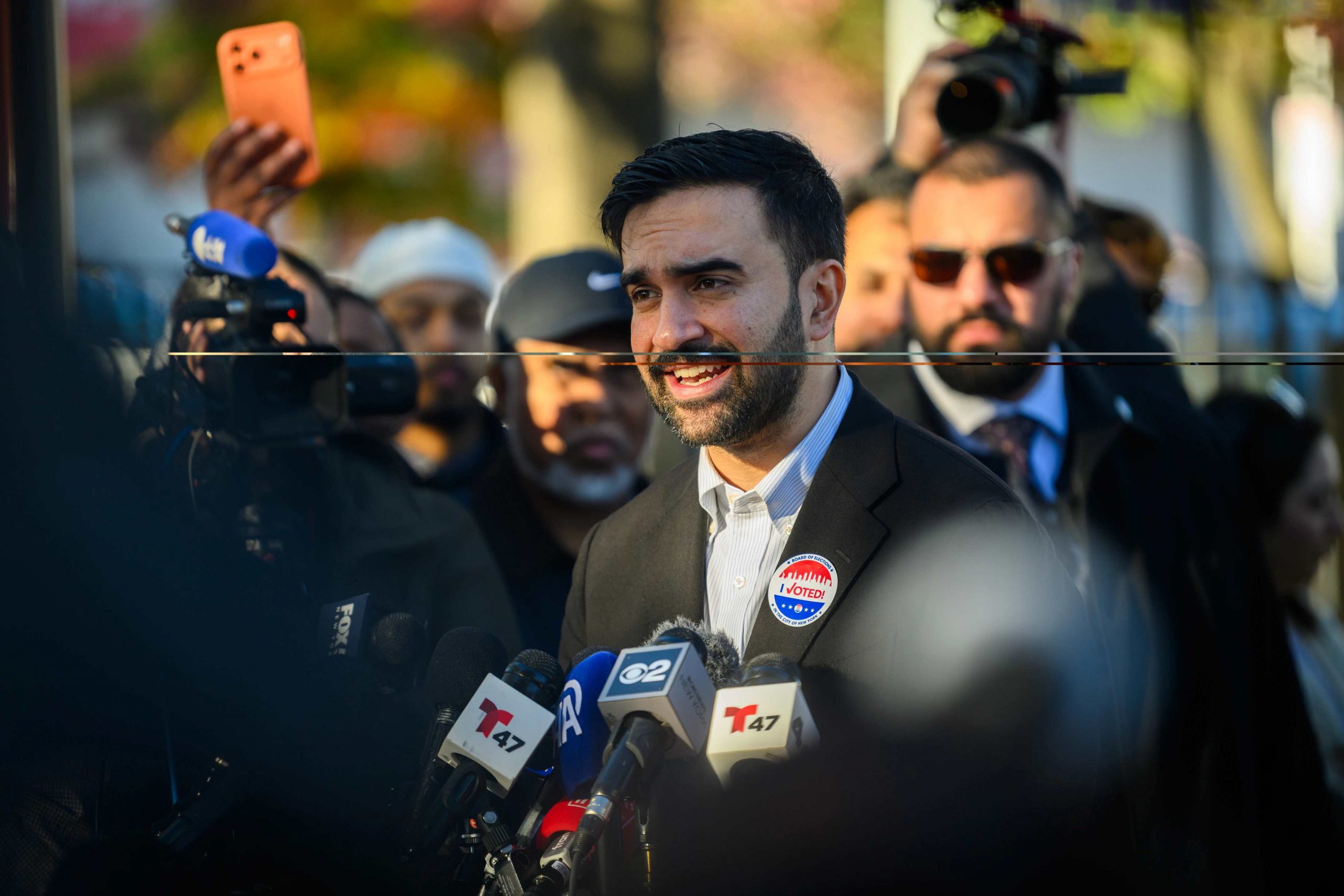

Jan 5, 2026 / 17:32 pm (CNA).
Bishop Robert Barron, founder of the Word on Fire ministry, criticized New York City Mayor Zohran Mamdani for promising constituents “the warmth of collectivism” in his Jan. 1 inaugural address.
Mamdani, who defeated two candidates with nearly 51% of the vote in the November election, won on a democratic socialist platform. His plans include free buses, city-owned grocery stores, no-cost child care, raising the minimum wage to $30 per hour, and freezing the rent for people in rent-stabilized apartments.
“We will replace the frigidity of rugged individualism with the warmth of collectivism,” Mamdani said in his inaugural address.
“If our campaign demonstrated that the people of New York yearn for solidarity, then let this government foster it,” he said. “Because no matter what you eat, what language you speak, how you pray, or where you come from — the words that most define us are the two we all share: New Yorkers.”
Barron, bishop of the Diocese of Winona-Rochester, Minnesota, said in a post on X that this line “took my breath away.”
“Collectivism in its various forms is responsible for the deaths of at least 100 million people in the last century,” Barron said.
“Socialist and communist forms of government around the world today — Venezuela, Cuba, North Korea, etc. — are disastrous,” he added. “Catholic social teaching has consistently condemned socialism and has embraced the market economy, which people like Mayor Mamdani caricature as ‘rugged individualism.’ In fact, it is the economic system that is based upon the rights, freedom, and dignity of the human person.”
“For God’s sake, spare me the ‘warmth of collectivism,’” Barron concluded.
Both socialism and communism have been condemned by many popes, first by Pope Pius IX in his 1849 encyclical Nostis et Nobiscum, just one year after Karl Marx published “ The Communist Manifesto.”
The foundation of Catholic social teaching rests on Pope Leo XIII’s 1891 encyclical Rerum Novarum.
In the encyclical, Leo denounced socialism and communism, and also condemned poor labor conditions for the working class and employers “who use human beings as mere instruments for moneymaking.”
“Each needs the other: Capital cannot do without labor, nor labor without capital,” the 19th century pontiff wrote. “Mutual agreement results in the beauty of good order, while perpetual conflict necessarily produces confusion and savage barbarity.”
Pope Pius XI, in his 1931 encyclical Quadragesimo Anno, wrote of the importance of private property, that man must be able to “fully cultivate and develop all his faculties unto the praise and glory of his Creator; and that by faithfully fulfilling the duties of his craft or other calling he may obtain for himself temporal and at the same time eternal happiness.”
Socialism, he said, is “wholly ignoring and indifferent to this sublime end of both man and society, affirms that human association has been instituted for the sake of material advantage alone.”
“Religious socialism, Christian socialism, are contradictory terms; no one can be at the same time a good Catholic and a true socialist,” Pius XI wrote.
Pope Benedict XVI differentiated socialism and democratic socialism. In 2006, he wrote: “In many respects, democratic socialism was and is close to Catholic social doctrine and has in any case made a remarkable contribution to the formation of a social consciousness.”
Though, in his 2005 encyclical Deus Caritas Est, Benedict XVI wrote that government should not control everything but that society needs a state that, “in accordance with the principle of subsidiarity, generously acknowledges and supports initiatives arising from the different social forces and combines spontaneity with closeness to those in need.”
Pope Francis has criticized Marxist ideology but also “radical individualism,” which he said in his 2020 encyclical Fratelli Tutti “makes us believe that everything consists in giving free rein to our own ambitions, as if by pursuing ever greater ambitions and creating safety nets we would somehow be serving the common good.”
In 2024, Francis encouraged cooperation and dialogue between Marxists and Christians.
The Catechism of the Catholic Church teaches: “The Church has rejected the totalitarian and atheistic ideologies associated in modem times with ‘communism’ or ‘socialism.’ She has likewise refused to accept, in the practice of ‘capitalism,’ individualism and the absolute primacy of the law of the marketplace over human labor.”
Read More![Food assistance, housing top Catholic Charities’ policy wish list in 2026 #Catholic
Credit: Jonathan Weiss/Shutterstock
Jan 2, 2026 / 07:00 am (CNA).
Many people who receive assistance through anti-poverty programs faced disruptions in 2025, and Catholic Charities’ wish list for 2026 includes government support for food assistance and housing.The largest disruption came in October when food stamps received through the Supplemental Nutrition Assistance Program (SNAP) were delayed amid the government shutdown. Funding for rental and heating assistance were also disrupted.Confusion about how to implement a memo in January from the Office of Management and Budget calling for a grant freeze also caused delays in funding related to health care, housing affordability, and food assistance.Luz Tavarez, vice president of government relations at Catholic Charities USA, said “people get nervous and scared” amid disruptions.Many Catholic Charities affiliates saw an influx in clients, especially during the shutdown, but Tavarez said there are “very poor people who rely on SNAP subsidies for their meals” and who “can’t get to a Catholic Charities [affiliate] or other food pantry for assistance” when it happens.Long-term eligibility and funding changes to SNAP were also approved in the tax overhaul signed into law in July. Previous rules only included a work requirement up to age 54, but the law extended those requirements up to age 64. It added stricter and more frequent checks for verifying the work requirements.It also shifted some funding responsibilities away from the federal government and to the states.Tavarez expressed concern about some of the SNAP changes as well, saying the government should end “burdensome requirements for individuals and states.”Under the new law, there are stricter rules for verifying a person’s immigration status for benefits. It also limited which noncitizens could receive SNAP benefits, which excluded some refugees and people granted asylum. Tavarez expressed concern about such SNAP changes, encouraging the government to permit “humanitarian-based noncitizens” to receive those benefits.Overall the 2025 tax law gave the biggest boost to the richest families while poorer families might get a little less help than before, according to the Congressional Budget Office.The bill added a work requirement for Medicaid recipients, and this will not take effect until 2027. Under the previous law, there was no work requirement for this benefit. It also shifts some Medicaid funding requirements onto the states.Tavarez said Catholic Charities has “concerns with how [work requirements are] implemented” moving forward but does not oppose the idea outright: “There’s dignity in work so the Church isn’t necessarily opposed to people working as long as there’s some opportunities for people to do other things and other issues are taken into consideration.”She also expressed concerns about funding shifts: “We know that not every state views things like SNAP and Medicaid as a good thing. We don’t know how states are going to balance their budget and prioritize these programs.”2026 wish listLooking forward to 2026, Tavarez said Catholic Charities hopes the government will restore full funding to the Temporary Emergency Food Assistance Program for food banks and bulk food distribution programs and ensure that funding is protected for school meals and the Special Supplemental Nutrition Program for Women, Infants, and Children.The Department of Housing and Urban Development (HUD) made policy changes in November that would focus its homelessness funding on “transitional” housing instead of “permanent” housing. This move is facing legal challenges.President Donald Trump’s administration initially sought to cut federal housing assistance and shift much of those costs to states, but this was ultimately not included in the final version of the 2025 tax law.In December, Trump promised an “aggressive” housing reform plan that focuses on reducing costs. At this time, the specifics of that proposal have not been announced. The increased cost to buy a new home has outpaced the growth in wages for decades.Tavarez said Catholic Charities is focused on housing affordability in 2026 and that the solution must be multifaceted. This includes “building and developing affordable housing,” “a tax credit for developers,” “more affordable housing units,” and subsidies and Section 8 vouchers for low-income Americans, she said.“We recognize that there’s a real crisis — I think everybody does in a bipartisan way — but there needs to be a real bipartisan approach and it’s going to require money,” Tavarez said.Tax credits and economic trendsSome changes to the tax code included in the 2025 tax law are geared toward helping low-income Americans.Specifically, the law reduced taxes taken from tips and overtime work. It also increased the child tax credit from $2,000 to $2,200 and tied the credit to inflation, meaning that it will increase each year based on the rate of inflation.Tavarez characterized the changes to the child tax credit as a “win” and hopes it can be expanded further.The economy has been a mixed bag, with November unemployment numbers showing a 4.6% rate. In November of last year, it was slightly lower at 4.2%.Inflation has gone down a little, with the annual rate being around 2.7%. In 2024, it was around 2.9%. The average wage for workers also outpaced inflation, with hourly wages increasing by 3.5%, which shows a modest inflation-adjusted increase of 0.8%.](https://unitedyam.com/wp-content/uploads/2026/01/food-assistance-housing-top-catholic-charities-policy-wish-list-in-2026-catholic-credit-jonathan-weiss-shutterstockjan-2-2026-0700-am-cna-many-people-who-receive-assistance-th-1.jpg)

Jan 2, 2026 / 07:00 am (CNA).
Many people who receive assistance through anti-poverty programs faced disruptions in 2025, and Catholic Charities’ wish list for 2026 includes government support for food assistance and housing.
The largest disruption came in October when food stamps received through the Supplemental Nutrition Assistance Program (SNAP) were delayed amid the government shutdown. Funding for rental and heating assistance were also disrupted.
Confusion about how to implement a memo in January from the Office of Management and Budget calling for a grant freeze also caused delays in funding related to health care, housing affordability, and food assistance.
Luz Tavarez, vice president of government relations at Catholic Charities USA, said “people get nervous and scared” amid disruptions.
Many Catholic Charities affiliates saw an influx in clients, especially during the shutdown, but Tavarez said there are “very poor people who rely on SNAP subsidies for their meals” and who “can’t get to a Catholic Charities [affiliate] or other food pantry for assistance” when it happens.
Long-term eligibility and funding changes to SNAP were also approved in the tax overhaul signed into law in July. Previous rules only included a work requirement up to age 54, but the law extended those requirements up to age 64. It added stricter and more frequent checks for verifying the work requirements.
It also shifted some funding responsibilities away from the federal government and to the states.
Tavarez expressed concern about some of the SNAP changes as well, saying the government should end “burdensome requirements for individuals and states.”
Under the new law, there are stricter rules for verifying a person’s immigration status for benefits. It also limited which noncitizens could receive SNAP benefits, which excluded some refugees and people granted asylum.
Tavarez expressed concern about such SNAP changes, encouraging the government to permit “humanitarian-based noncitizens” to receive those benefits.
Overall the 2025 tax law gave the biggest boost to the richest families while poorer families might get a little less help than before, according to the Congressional Budget Office.
The bill added a work requirement for Medicaid recipients, and this will not take effect until 2027. Under the previous law, there was no work requirement for this benefit. It also shifts some Medicaid funding requirements onto the states.
Tavarez said Catholic Charities has “concerns with how [work requirements are] implemented” moving forward but does not oppose the idea outright: “There’s dignity in work so the Church isn’t necessarily opposed to people working as long as there’s some opportunities for people to do other things and other issues are taken into consideration.”
She also expressed concerns about funding shifts: “We know that not every state views things like SNAP and Medicaid as a good thing. We don’t know how states are going to balance their budget and prioritize these programs.”
Looking forward to 2026, Tavarez said Catholic Charities hopes the government will restore full funding to the Temporary Emergency Food Assistance Program for food banks and bulk food distribution programs and ensure that funding is protected for school meals and the Special Supplemental Nutrition Program for Women, Infants, and Children.
The Department of Housing and Urban Development (HUD) made policy changes in November that would focus its homelessness funding on “transitional” housing instead of “permanent” housing. This move is facing legal challenges.
President Donald Trump’s administration initially sought to cut federal housing assistance and shift much of those costs to states, but this was ultimately not included in the final version of the 2025 tax law.
In December, Trump promised an “aggressive” housing reform plan that focuses on reducing costs. At this time, the specifics of that proposal have not been announced. The increased cost to buy a new home has outpaced the growth in wages for decades.
Tavarez said Catholic Charities is focused on housing affordability in 2026 and that the solution must be multifaceted. This includes “building and developing affordable housing,” “a tax credit for developers,” “more affordable housing units,” and subsidies and Section 8 vouchers for low-income Americans, she said.
“We recognize that there’s a real crisis — I think everybody does in a bipartisan way — but there needs to be a real bipartisan approach and it’s going to require money,” Tavarez said.
Some changes to the tax code included in the 2025 tax law are geared toward helping low-income Americans.
Specifically, the law reduced taxes taken from tips and overtime work. It also increased the child tax credit from $2,000 to $2,200 and tied the credit to inflation, meaning that it will increase each year based on the rate of inflation.
Tavarez characterized the changes to the child tax credit as a “win” and hopes it can be expanded further.
The economy has been a mixed bag, with November unemployment numbers showing a 4.6% rate. In November of last year, it was slightly lower at 4.2%.
Inflation has gone down a little, with the annual rate being around 2.7%. In 2024, it was around 2.9%. The average wage for workers also outpaced inflation, with hourly wages increasing by 3.5%, which shows a modest inflation-adjusted increase of 0.8%.
Read More

NASA’s Curiosity Mars rover used its black-and-white navigation cameras to capture panoramas at two times of day on Nov. 18, 2025, spanning periods that occurred on both the 4,722nd and 4,723rd Martian days, or sols, of the mission. The panoramas were captured at 4:15 p.m. on Sol 4,722 and 8:20 a.m. on Sol 4,723 (both at local Mars time), then merged together. Color was later added for an artistic interpretation of the scene with blue representing the morning panorama and yellow representing the afternoon one.
Read More

Data from NASA’s James Webb Space Telescope and Chandra X-ray Observatory come together in this eye-catching photo of colliding spiral galaxies released on Dec. 1, 2025.
Read More![Bishop of Columbus grants Mass dispensation to immigrants who fear deportation #Catholic
Bishop Earl Fernandes of Columbus, Ohio, carries the Blessed Sacrament during a procession at Pickaway Correctional Institution on June 28, 2024, at one of the stops on the Seton Route of the National Eucharistic Pilgrimage. Credit: Catholic Times/Ken Snow
Dec 29, 2025 / 14:18 pm (CNA).
The bishop of the Diocese of Columbus, Ohio, has granted a dispensation from Mass for parishioners who fear deportation by immigration enforcement officers, who have increased activity in the area since mid-December.Bishop Earl Fernandes announced in a letter and video last week that those who fear immigration enforcement action are free from the obligation to attend Sunday Mass until Jan. 11, 2026. The bishop said the dispensation was precipitated by increased immigration enforcement activity in Ohio stemming from Operation Buckeye, a U.S. Immigration and Customs Enforcement (ICE) initiative launched Dec. 16 that is allegedly targeting “the worst of the worst criminal illegal aliens in Columbus and throughout Ohio.”Fernandes told EWTN News on Monday that after he began receiving messages from pastors throughout his diocese informing him that Hispanic parishioners were afraid to attend Mass due to the increased enforcement by ICE officers, he asked diocesan personnel in the Office of Catholic Social Doctrine and the Hispanic ministry office to help him get a clearer picture of “what is happening on the ground.”“They told me there were ICE trucks in front of parishes; even in front of schools,” Fernandes said. “All of a sudden, there were half or fewer attendees at the Posadas [traditional pre-Christmas] celebrations.”He said he decided to issue the dispensation “even though I did not want to” because “people need Mass and the sacraments more than ever” and he wanted families to be together without fear for Christmas.During a Mass he celebrated on Saturday, Dec. 20, Fernandes told EWTN News the pastor of the church remained at the front door and saw an ICE truck nearby. Because of this, the Posada [traditional pre-Christmas] procession was moved from outdoors to a hallway inside the building because “the people were too afraid to go outside.”The procession took place inside the building. “We had a meal, there was a piñata and some celebrations,” Fernandes said. “But it was clear there were a lot of people who weren’t there.”The bishop said he began receiving calls from pastors more than two hours from Columbus who were reporting ICE’s presence.Sharp drops in Mass attendance“The atmosphere of fear was keeping people away,” he said. One pastor reported that only one-third of his congregation attended weekend Mass. Another said only one-quarter were present, Fernandes said.Of the increased enforcement against immigrants, Fernandes reflected: “It’s easy to say immigrants should have come to our country legally. But what if your parents came here illegally and you are a U.S. citizen? … What if one spouse is documented and the other is not. What’s in the best interest of their children and society at large?”Of the Mexican population in Columbus, Fernandes said that “many are the grandchildren of the Cristeros,” resistors to the Mexican government’s attempts in the 1920s to suppress Catholicism in the country.He said a large group of Hispanics came to the midnight Mass on Christmas at the cathedral because they did not think ICE would be there. “I think they felt safe at the cathedral.”Fernandes said the Diocese of Columbus also has large numbers of Catholic African migrants who have “tons of children” and make up “young communities full of life and full of faith.”Fernandes said he talked to the pastor of a multiethnic parish made up of Nigerians, Filipinos, and others, and “they’re afraid too.”He is concerned for the Haitian community as well, whose temporary protected status (TPS) is set to expire on Feb. 3, 2026.He said the Mass dispensation expires on Jan. 11, the end of the Christmas season, at which time he will reevaluate the situation.](https://unitedyam.com/wp-content/uploads/2026/01/bishop-of-columbus-grants-mass-dispensation-to-immigrants-who-fear-deportation-catholic-bishop-earl-fernandes-of-columbus-ohio-carries-the-blessed-sacrament-during-a-procession-at-pickaway-corr-scaled.jpg)

Dec 29, 2025 / 14:18 pm (CNA).
The bishop of the Diocese of Columbus, Ohio, has granted a dispensation from Mass for parishioners who fear deportation by immigration enforcement officers, who have increased activity in the area since mid-December.
Bishop Earl Fernandes announced in a letter and video last week that those who fear immigration enforcement action are free from the obligation to attend Sunday Mass until Jan. 11, 2026. The bishop said the dispensation was precipitated by increased immigration enforcement activity in Ohio stemming from Operation Buckeye, a U.S. Immigration and Customs Enforcement (ICE) initiative launched Dec. 16 that is allegedly targeting “the worst of the worst criminal illegal aliens in Columbus and throughout Ohio.”
Fernandes told EWTN News on Monday that after he began receiving messages from pastors throughout his diocese informing him that Hispanic parishioners were afraid to attend Mass due to the increased enforcement by ICE officers, he asked diocesan personnel in the Office of Catholic Social Doctrine and the Hispanic ministry office to help him get a clearer picture of “what is happening on the ground.”
“They told me there were ICE trucks in front of parishes; even in front of schools,” Fernandes said. “All of a sudden, there were half or fewer attendees at the Posadas [traditional pre-Christmas] celebrations.”
He said he decided to issue the dispensation “even though I did not want to” because “people need Mass and the sacraments more than ever” and he wanted families to be together without fear for Christmas.
During a Mass he celebrated on Saturday, Dec. 20, Fernandes told EWTN News the pastor of the church remained at the front door and saw an ICE truck nearby. Because of this, the Posada [traditional pre-Christmas] procession was moved from outdoors to a hallway inside the building because “the people were too afraid to go outside.”
The procession took place inside the building. “We had a meal, there was a piñata and some celebrations,” Fernandes said. “But it was clear there were a lot of people who weren’t there.”
The bishop said he began receiving calls from pastors more than two hours from Columbus who were reporting ICE’s presence.
“The atmosphere of fear was keeping people away,” he said. One pastor reported that only one-third of his congregation attended weekend Mass. Another said only one-quarter were present, Fernandes said.
Of the increased enforcement against immigrants, Fernandes reflected: “It’s easy to say immigrants should have come to our country legally. But what if your parents came here illegally and you are a U.S. citizen? … What if one spouse is documented and the other is not. What’s in the best interest of their children and society at large?”
Of the Mexican population in Columbus, Fernandes said that “many are the grandchildren of the Cristeros,” resistors to the Mexican government’s attempts in the 1920s to suppress Catholicism in the country.
He said a large group of Hispanics came to the midnight Mass on Christmas at the cathedral because they did not think ICE would be there. “I think they felt safe at the cathedral.”
Fernandes said the Diocese of Columbus also has large numbers of Catholic African migrants who have “tons of children” and make up “young communities full of life and full of faith.”
Fernandes said he talked to the pastor of a multiethnic parish made up of Nigerians, Filipinos, and others, and “they’re afraid too.”
He is concerned for the Haitian community as well, whose temporary protected status (TPS) is set to expire on Feb. 3, 2026.
He said the Mass dispensation expires on Jan. 11, the end of the Christmas season, at which time he will reevaluate the situation.
Read More

NASA engineer Guy Naylor poses for a photograph wearing a custom Santa Claus suit on the 19th level of High Bay 4 inside the Vehicle Assembly Building with NASA’s integrated Moon rocket behind him at the agency’s Kennedy Space Center in Florida on Thursday, Dec. 11, 2025.
Read More

From left to right, CSA (Canadian Space Agency) astronaut Jeremy Hansen and NASA astronauts Christina Koch, Victor Glover, and Reid Wiseman are seen as they depart the Neil A. Armstrong Operations and Checkout Building to board their Orion spacecraft atop NASA’s Space Launch System rocket inside the Vehicle Assembly Building as part of the Artemis II countdown demonstration test, Saturday, Dec. 20, 2025, at NASA’s Kennedy Space Center in Florida.
Read More

Justin Hall, left, controls a subscale aircraft as Justin Link holds the aircraft in place during preliminary engine tests on Friday, Sept. 12, 2025, at NASA’s Armstong Flight Research Center in Edwards, California. Hall is chief pilot at the center’s Dale Reed Subscale Flight Research Laboratory and Link is a pilot for small uncrewed aircraft systems.
Read More

Clockwise from left, JAXA (Japan Aerospace Exploration Agency) astronaut Kimiya Yui and NASA astronauts Jonny Kim, Zena Cardman, and Mike Fincke pose for a playful portrait through a circular opening in a hatch thermal cover aboard the International Space Station on Sept. 18, 2025.
Read More

The Soyuz MS-27 spacecraft is seen as it lands in a remote area near the town of Zhezkazgan, Kazakhstan with Expedition 73 NASA astronaut Jonny Kim, and Roscosmos cosmonauts Sergey Ryzhikov and Alexey Zubritsky aboard, Tuesday, Dec. 9, 2025.
Read MoreA flash of lightning, and then—something else. High above a storm, a crimson figure blinks in and out of existence. If you see it, you are a lucky witness of a sprite, one of the least-understood electrical phenomena in Earth’s upper atmosphere.
Read More

Researchers from NASA’s Jet Propulsion Laboratory in Southern California monitor a research drone in the Dumont Dunes area of the Mojave Desert in September 2025 as part of a test campaign to develop navigation software to guide future rotorcraft on Mars.
Read More

NASA’s Artemis II Orion spacecraft with its launch abort system is stacked atop the agency’s SLS (Space Launch System) rocket in High Bay 3 of the Vehicle Assembly Building at NASA’s Kennedy Space Center in Florida on Monday, Oct. 20, 2025. The spacecraft will carry NASA astronauts Reid Wiseman, Victor Glover, Christina Koch, and CSA (Canadian Space Agency) astronaut Jeremy Hansen on a 10-day mission around the Moon and back in early 2026.
Read More

NASA’s X-59 quiet supersonic research aircraft lifts off for its first flight Tuesday, Oct. 28, 2025, from U.S. Air Force Plant 42 in Palmdale, California. The aircraft’s first flight marks the start of flight testing for NASA’s Quesst mission, the result of years of design, integration, and ground testing and begins a new chapter in NASA’s aeronautics research legacy.
Read More